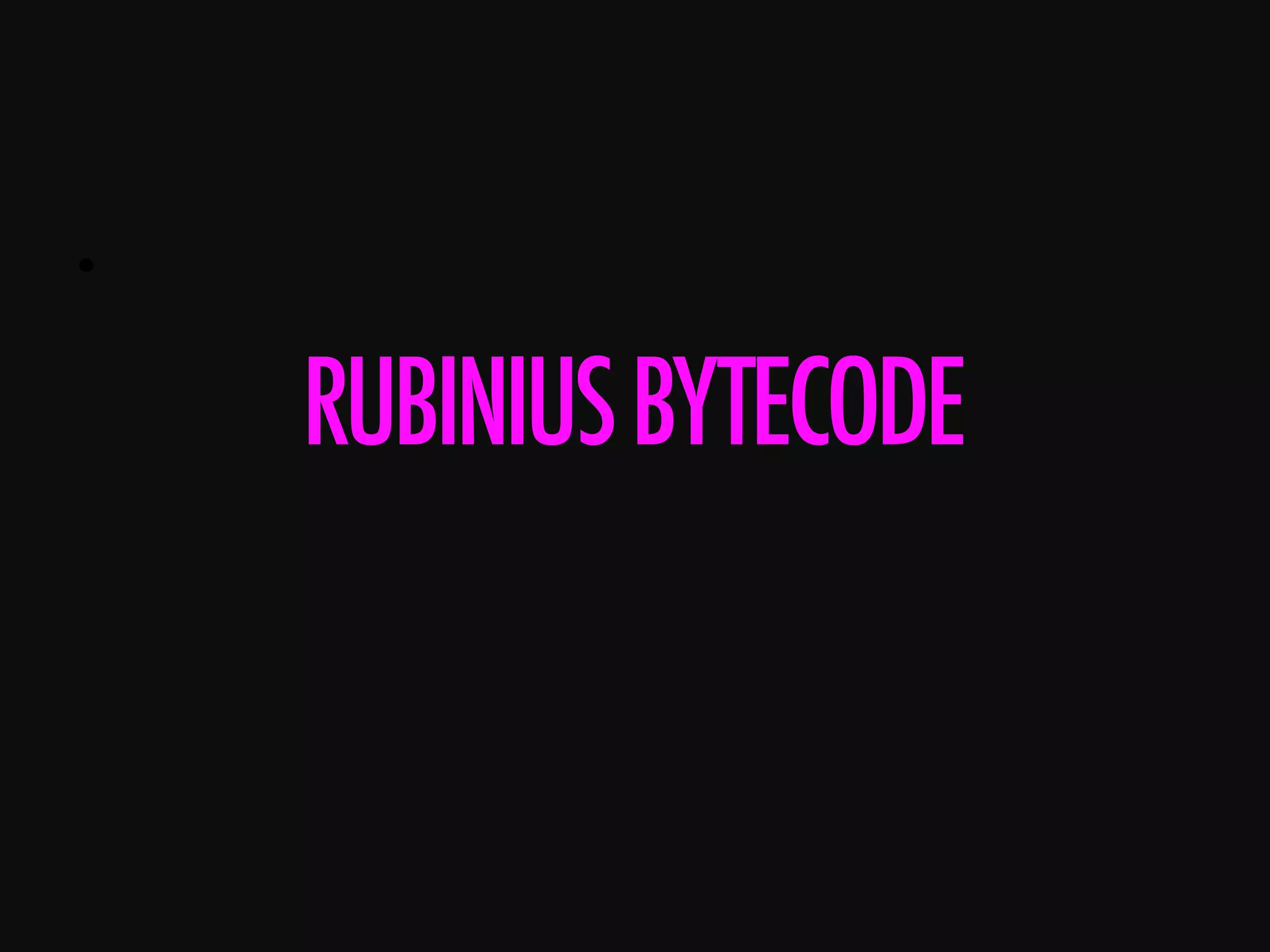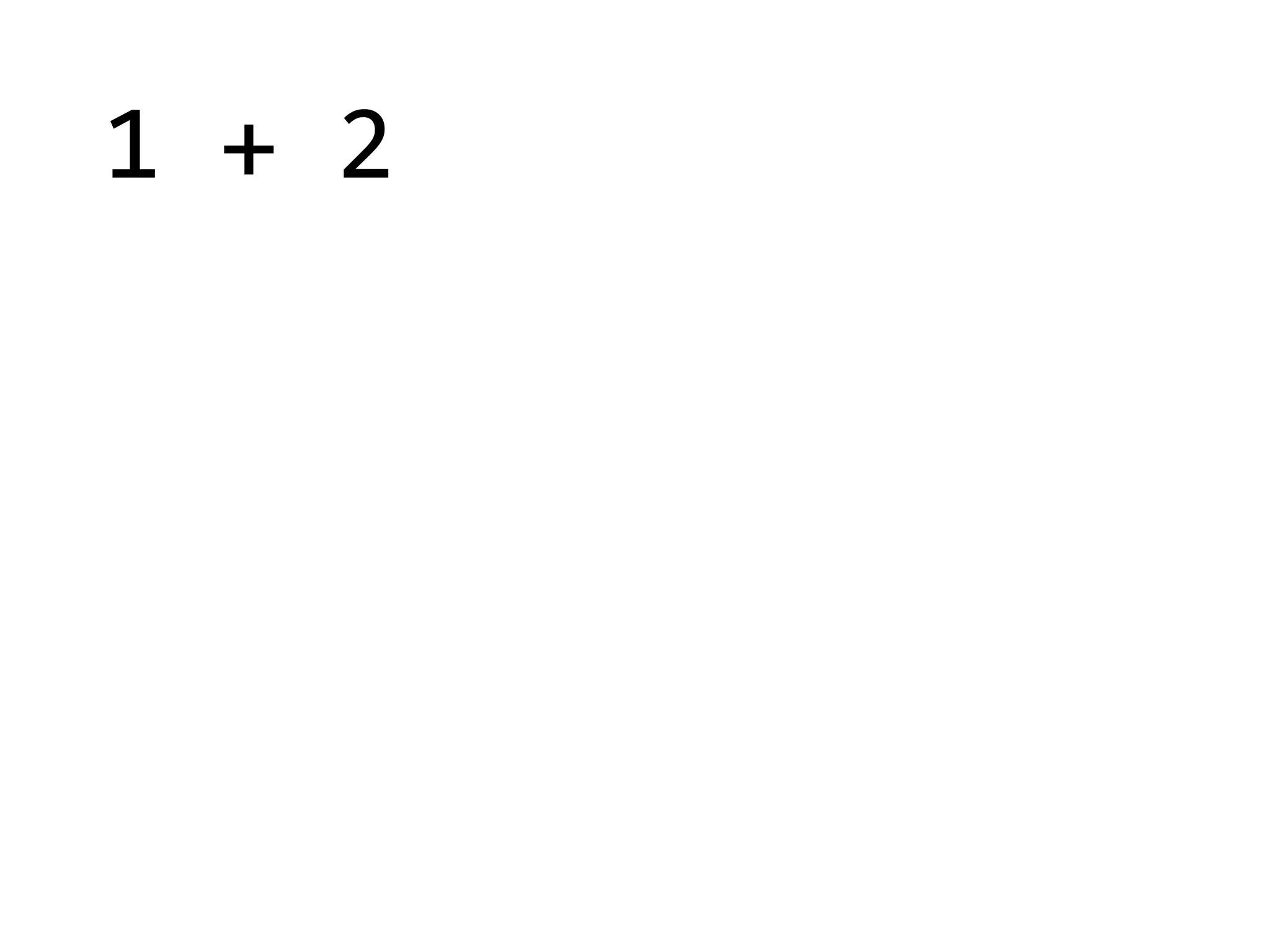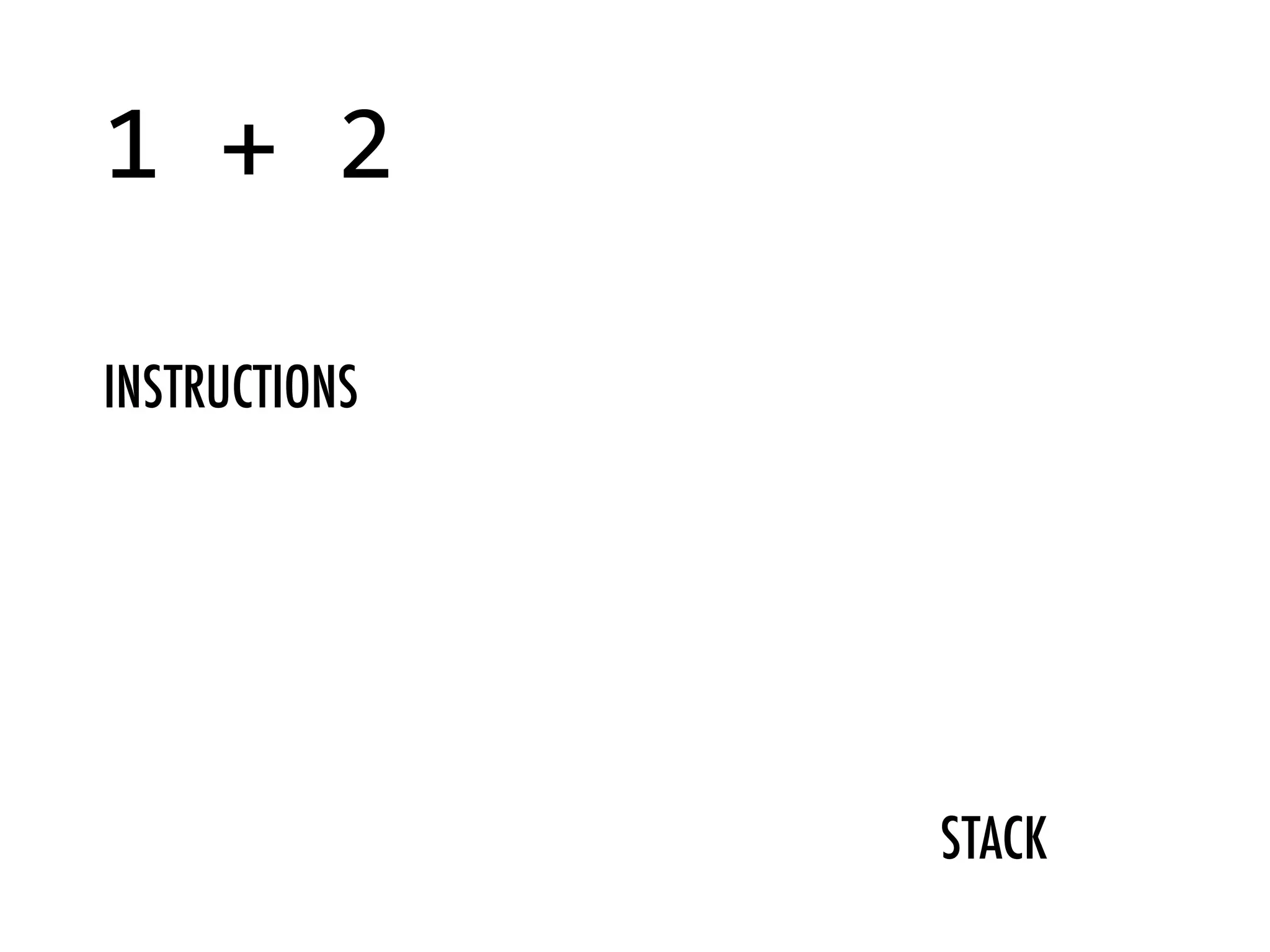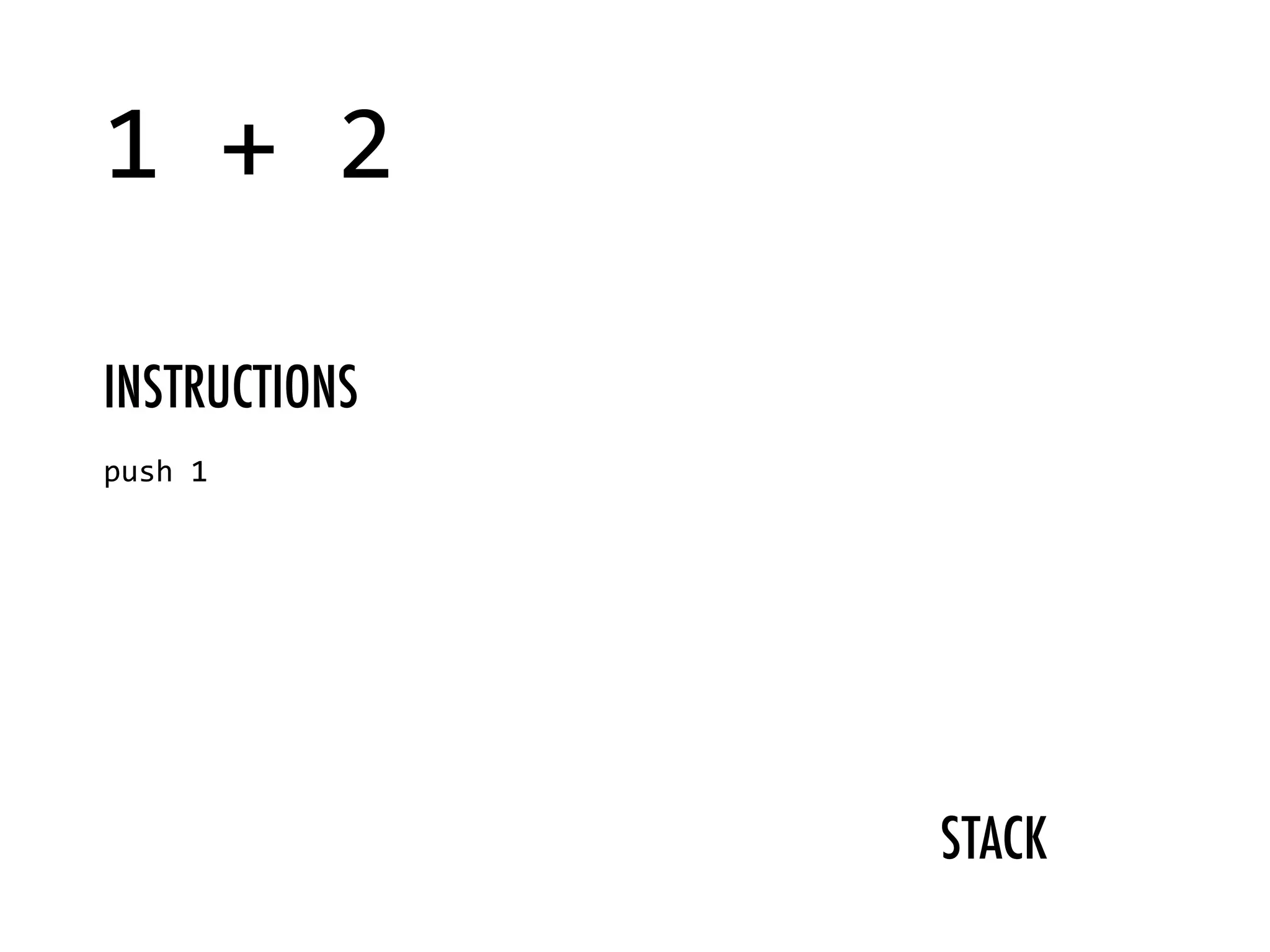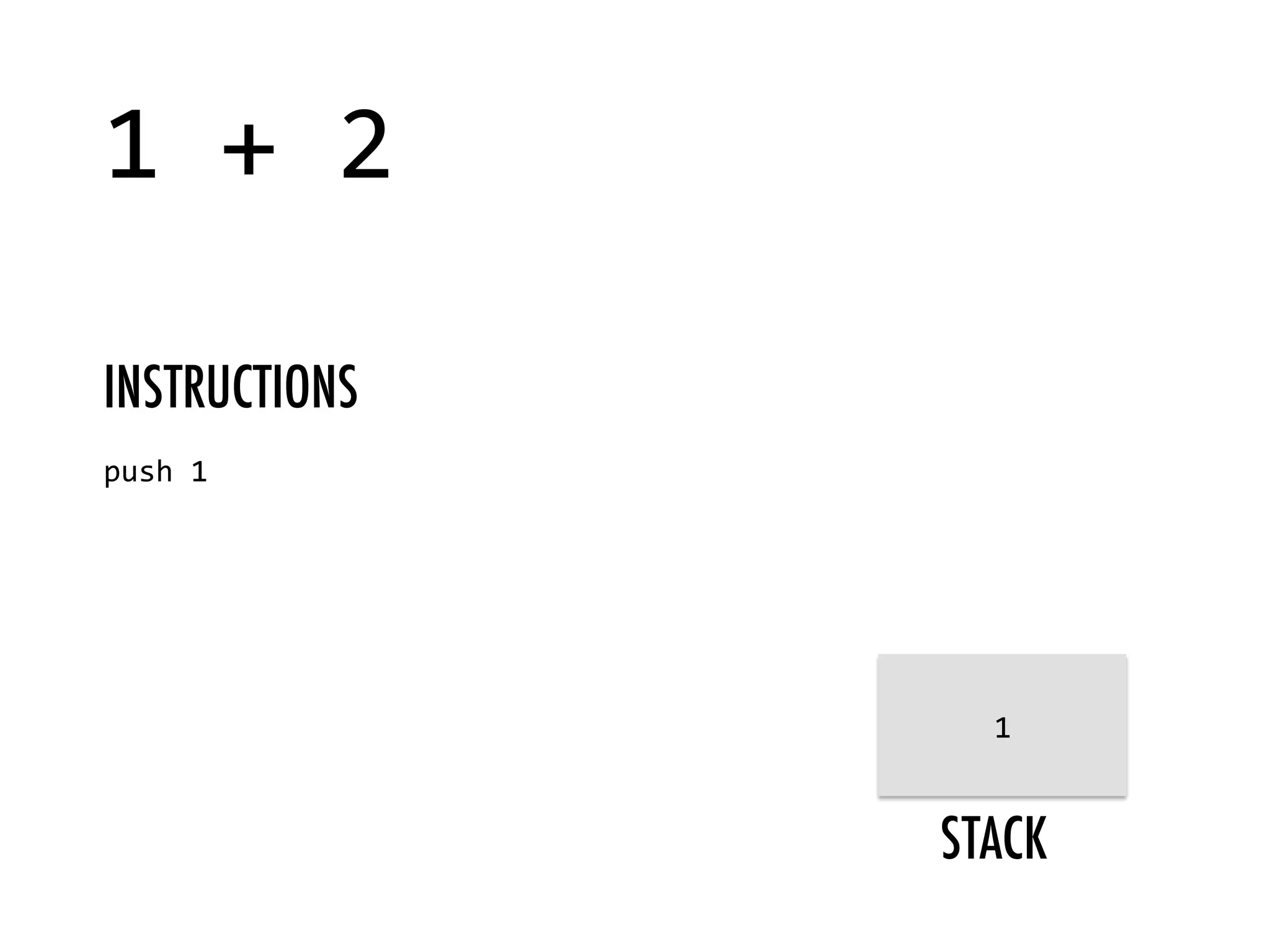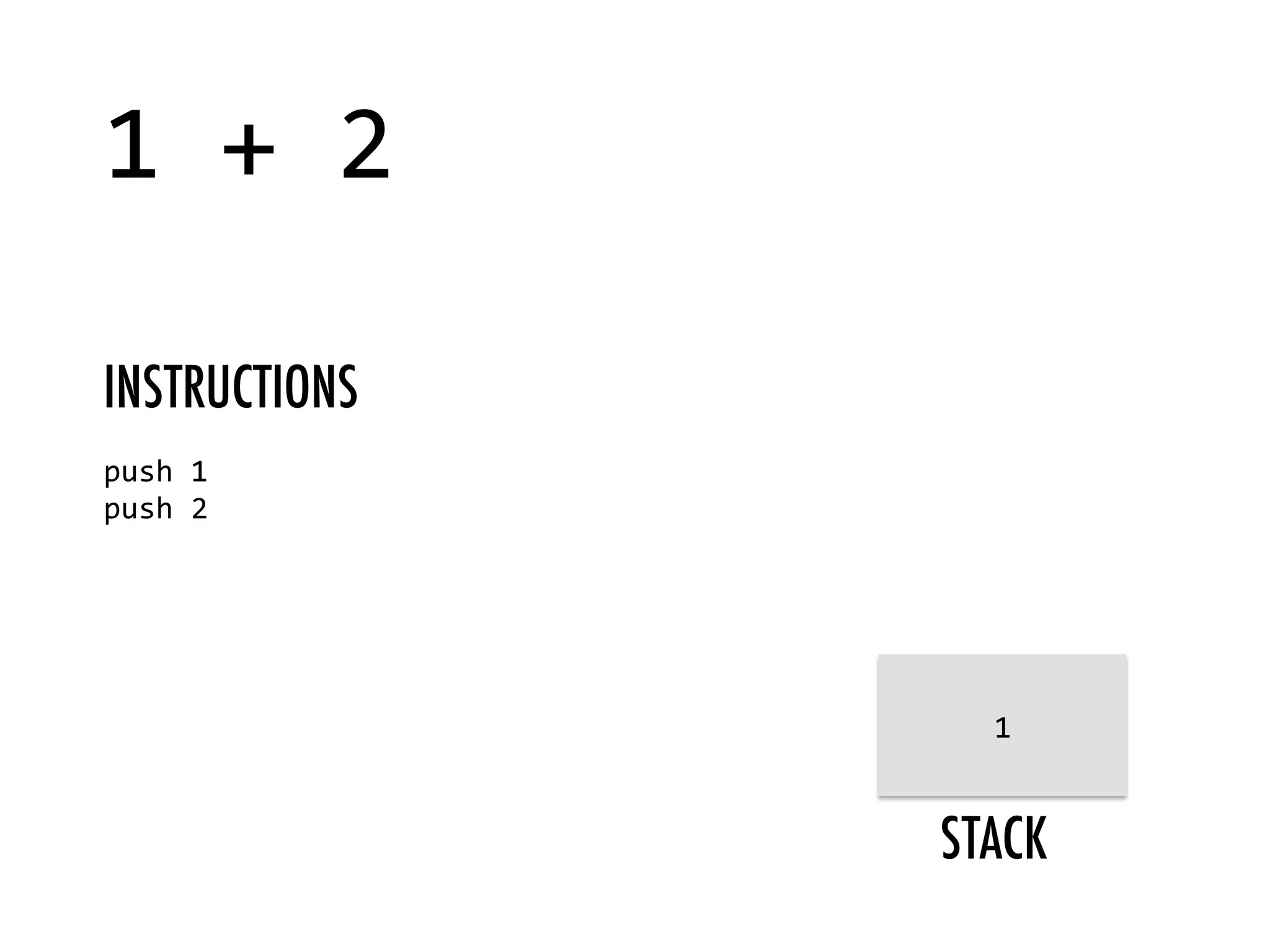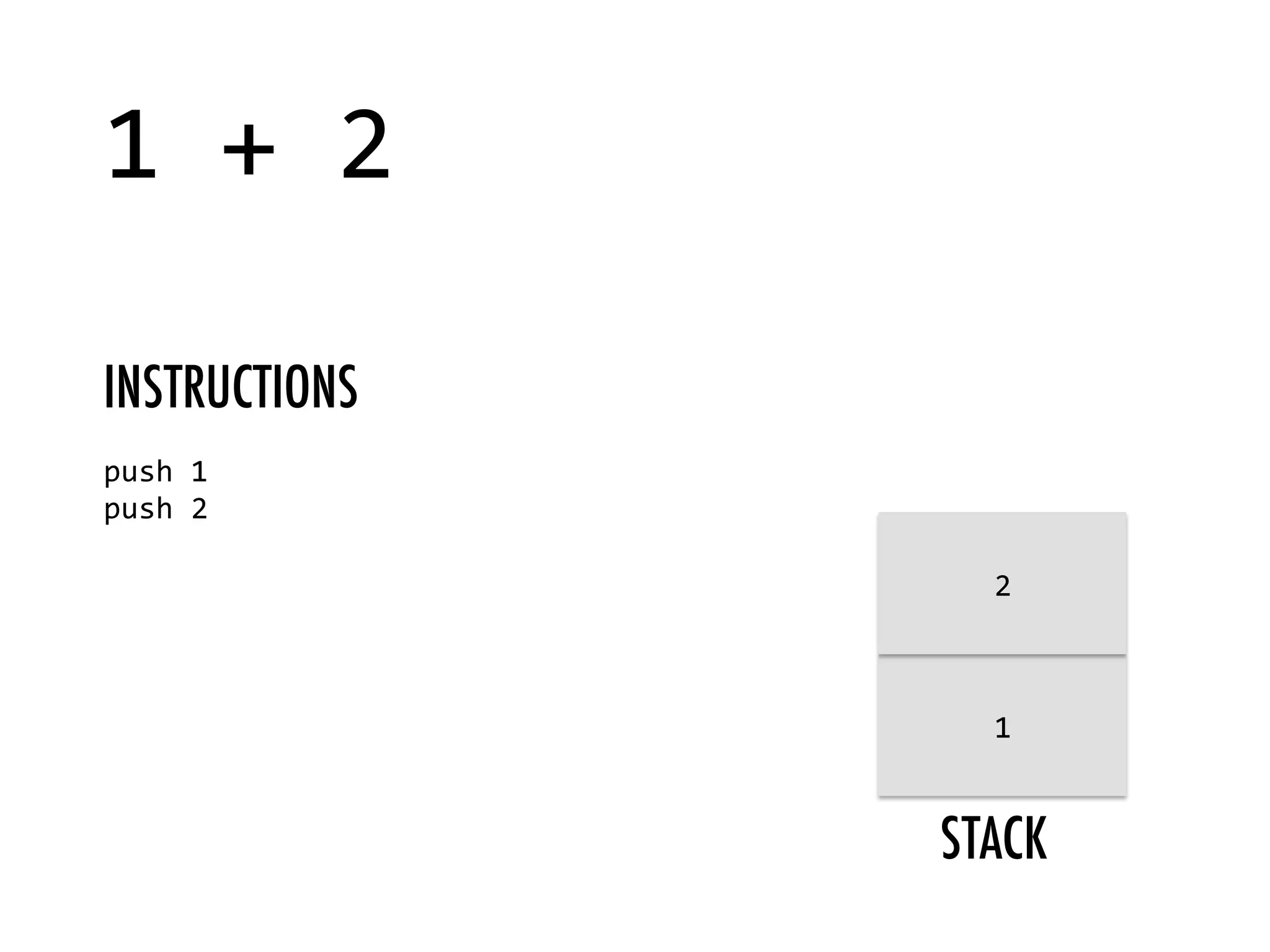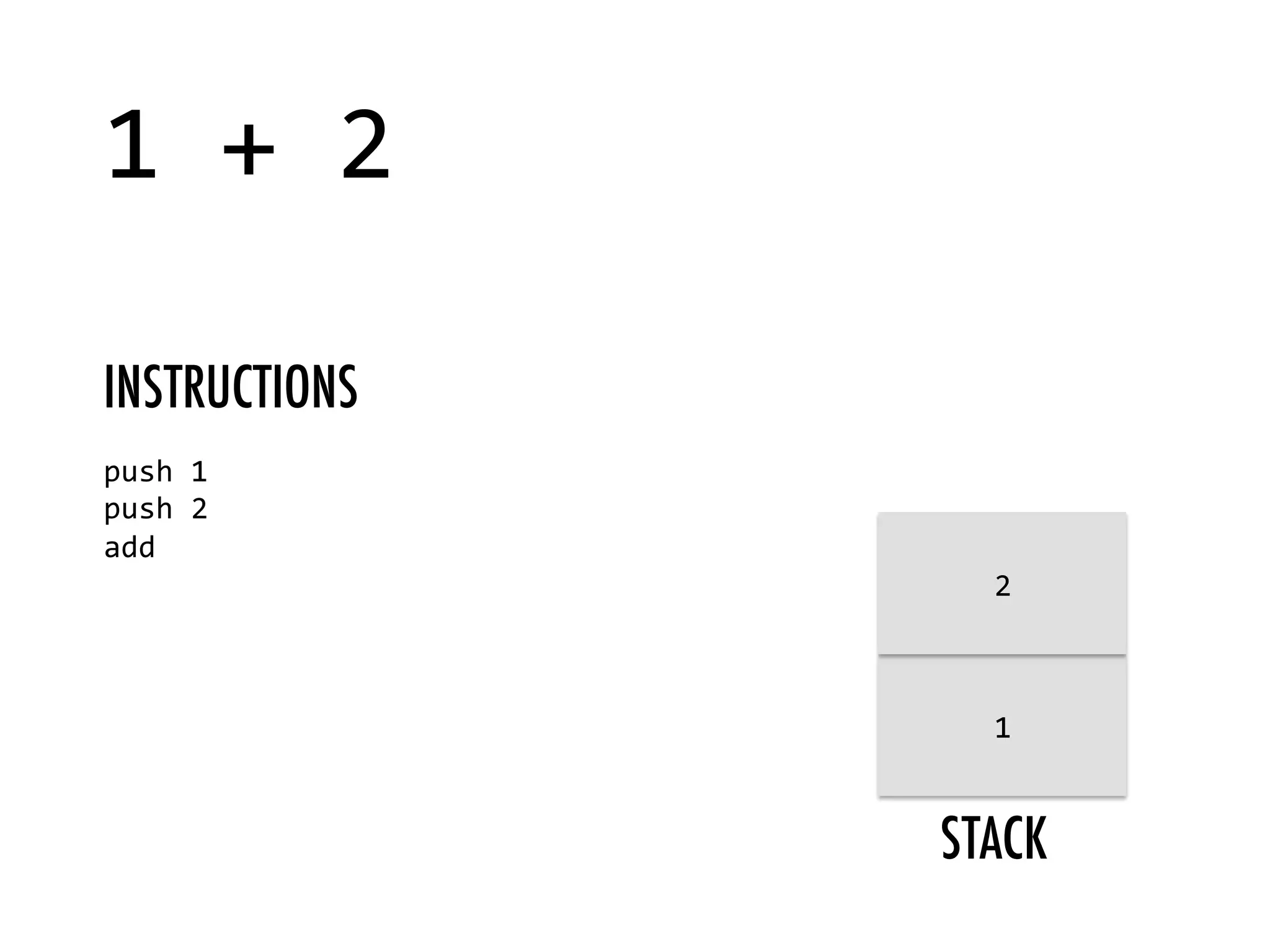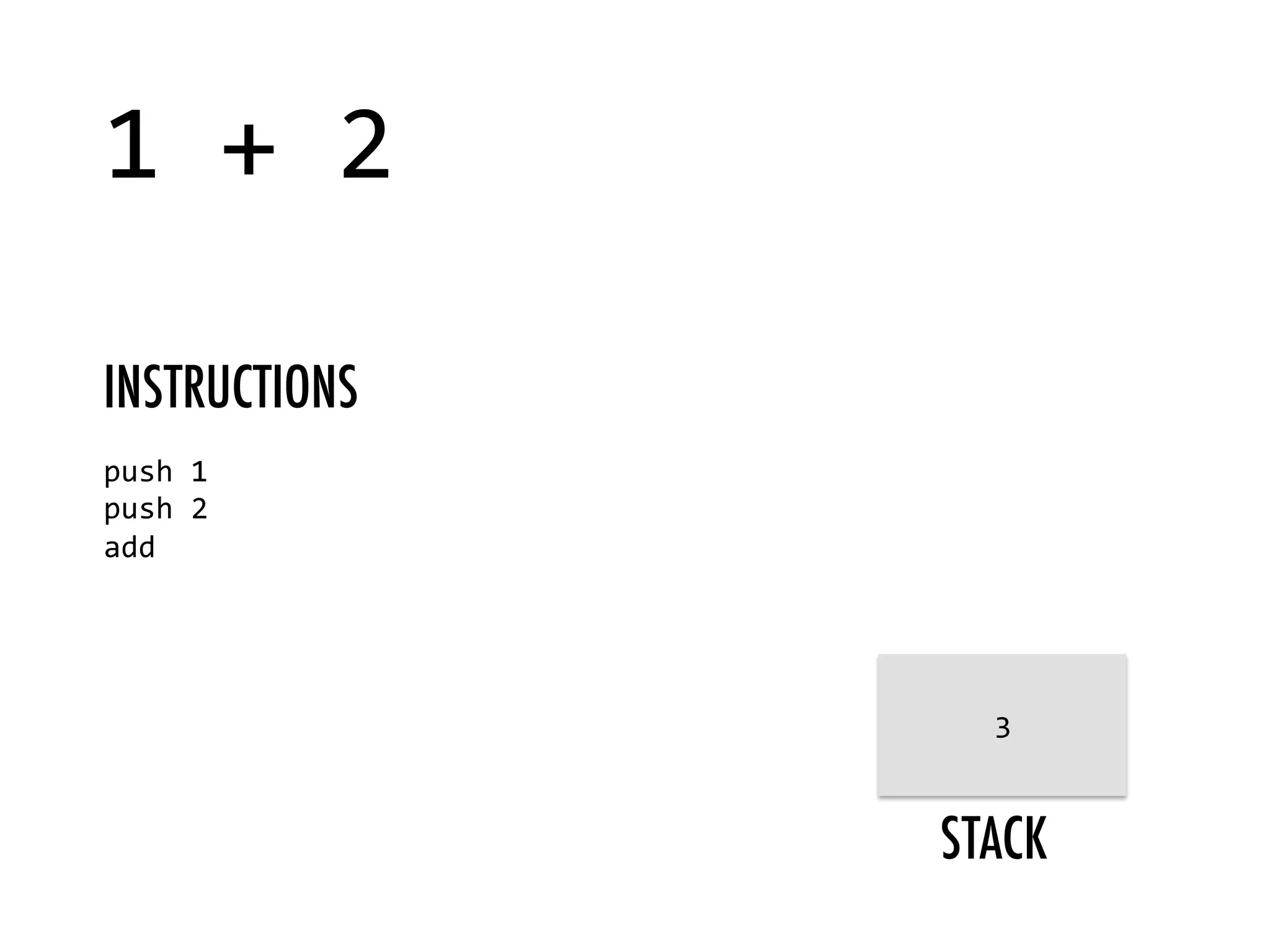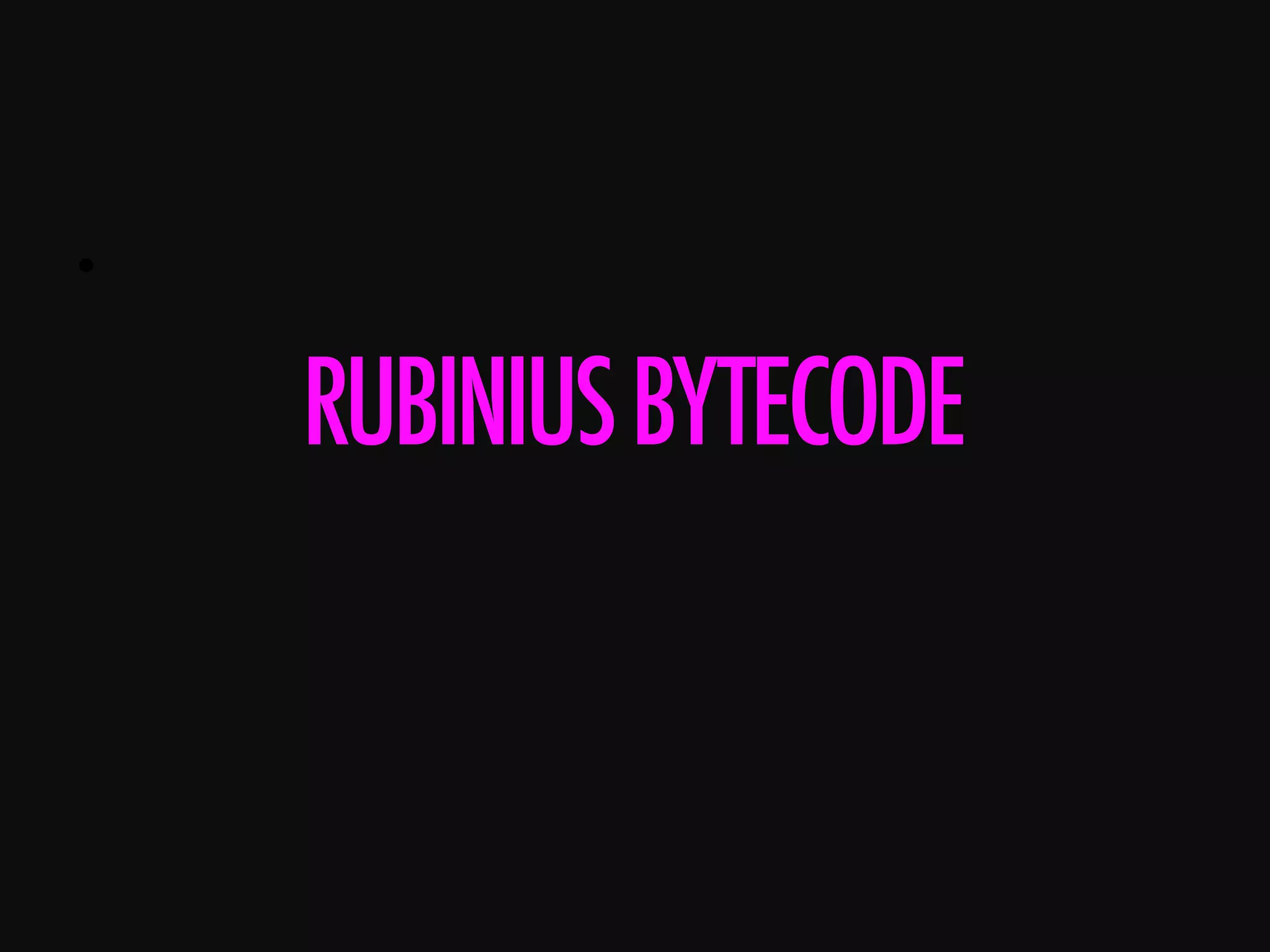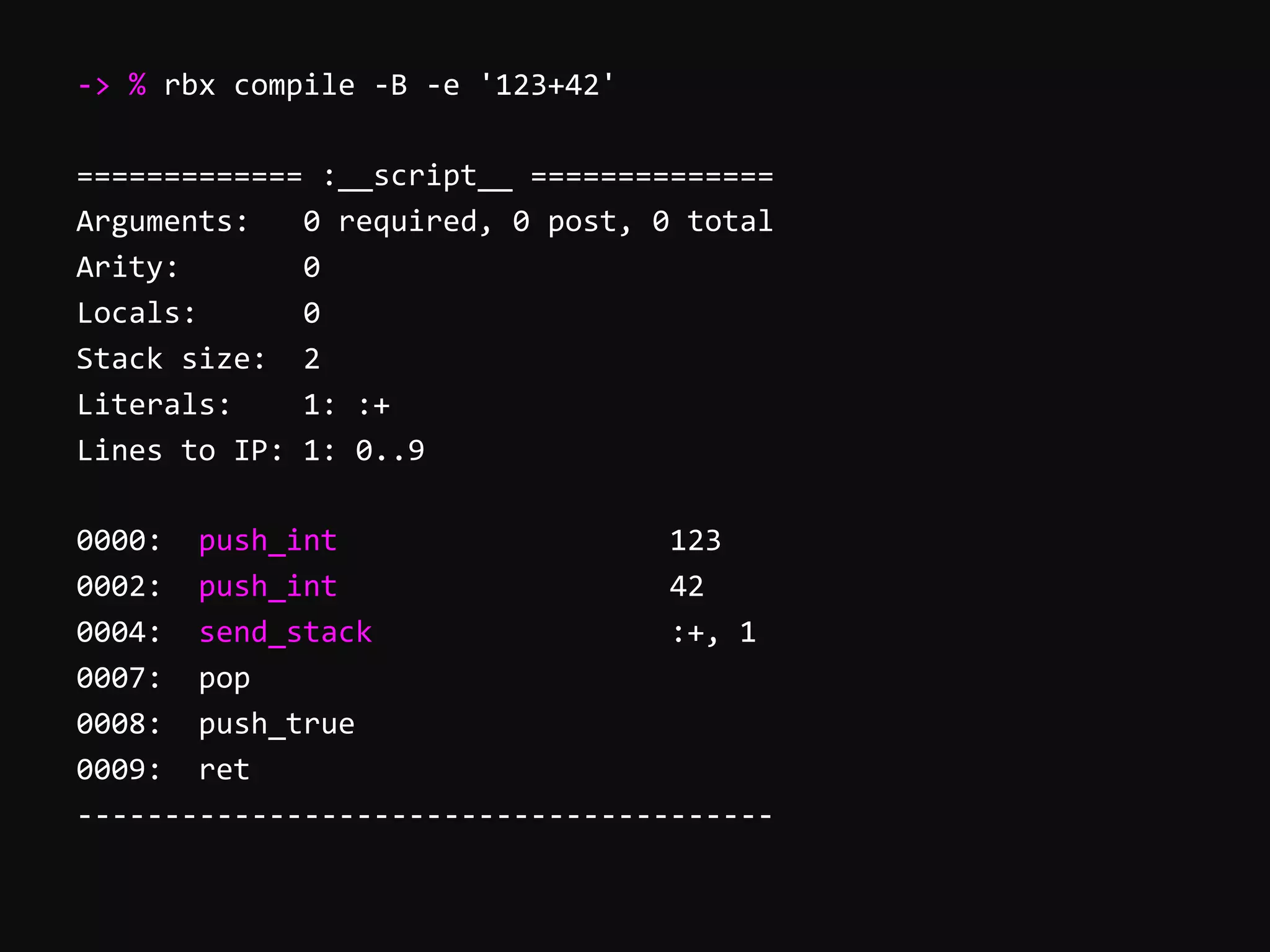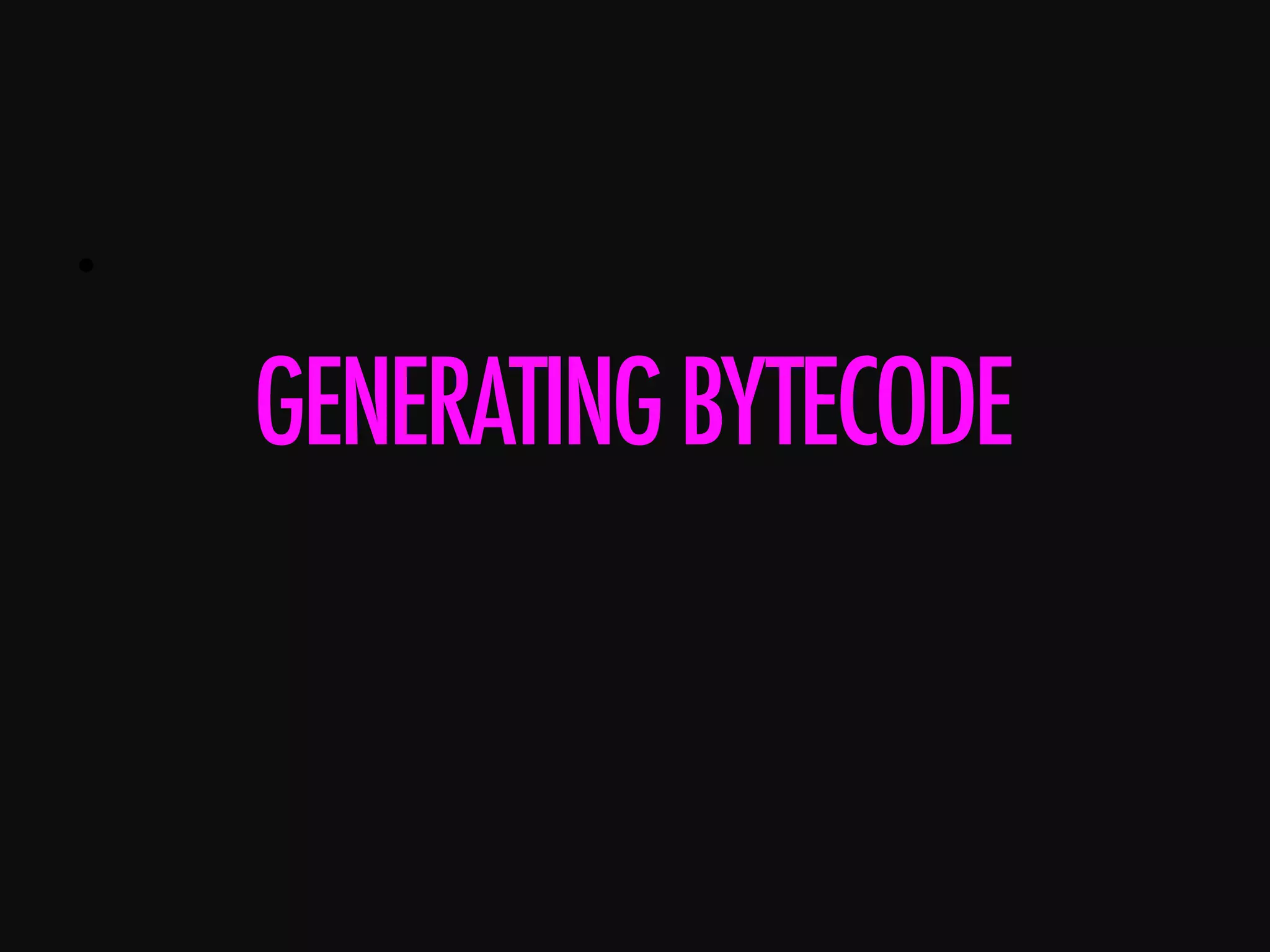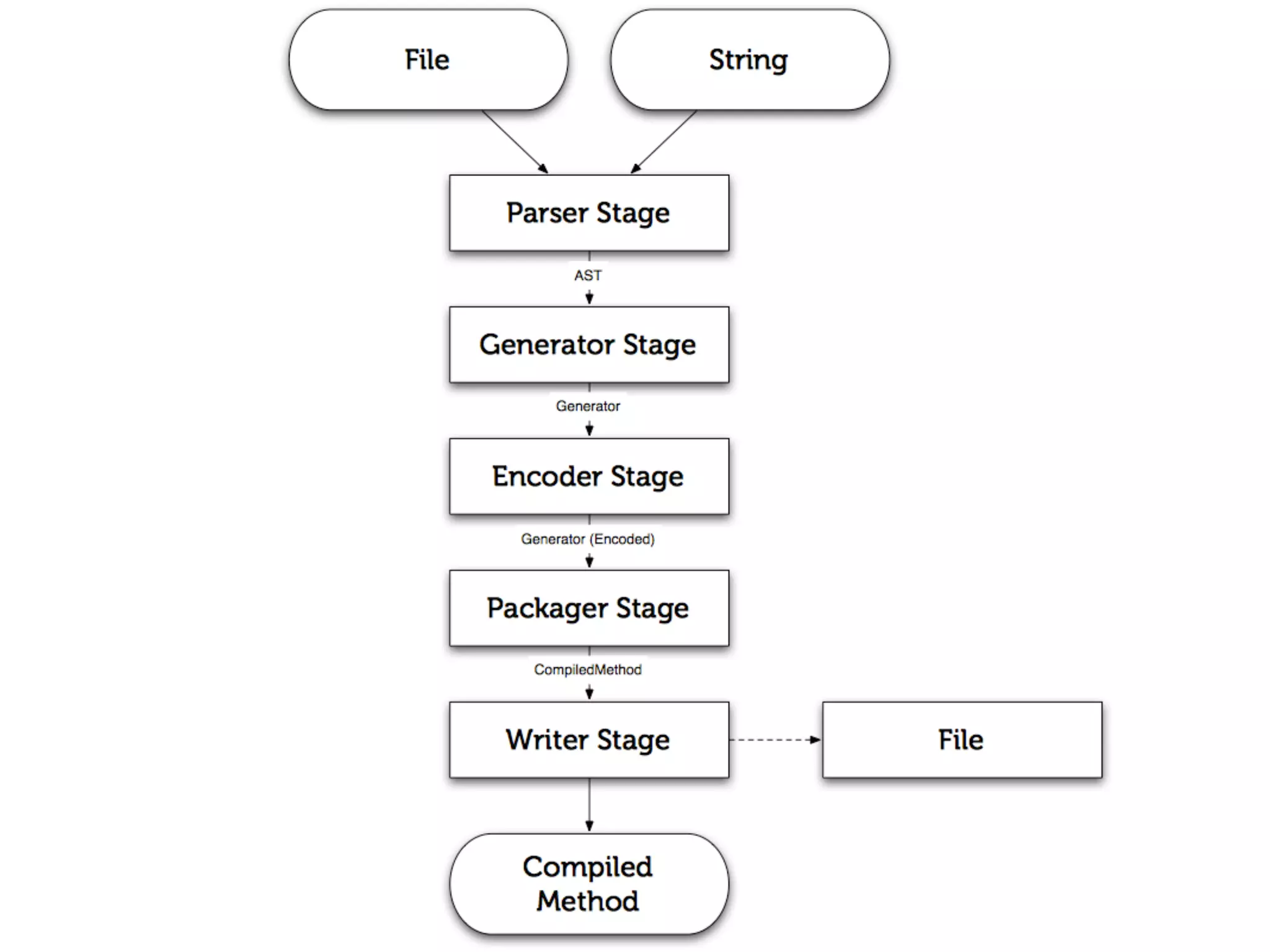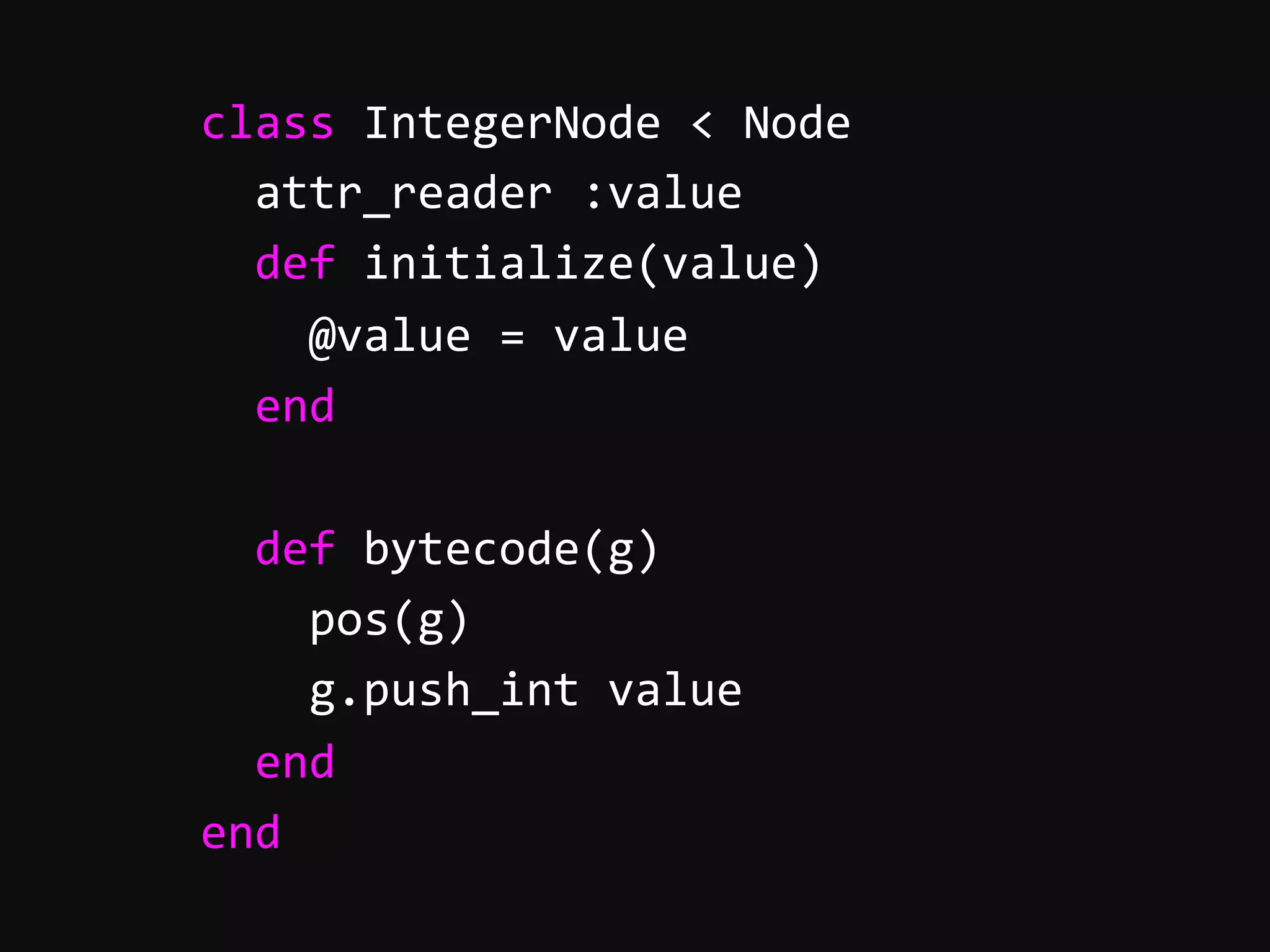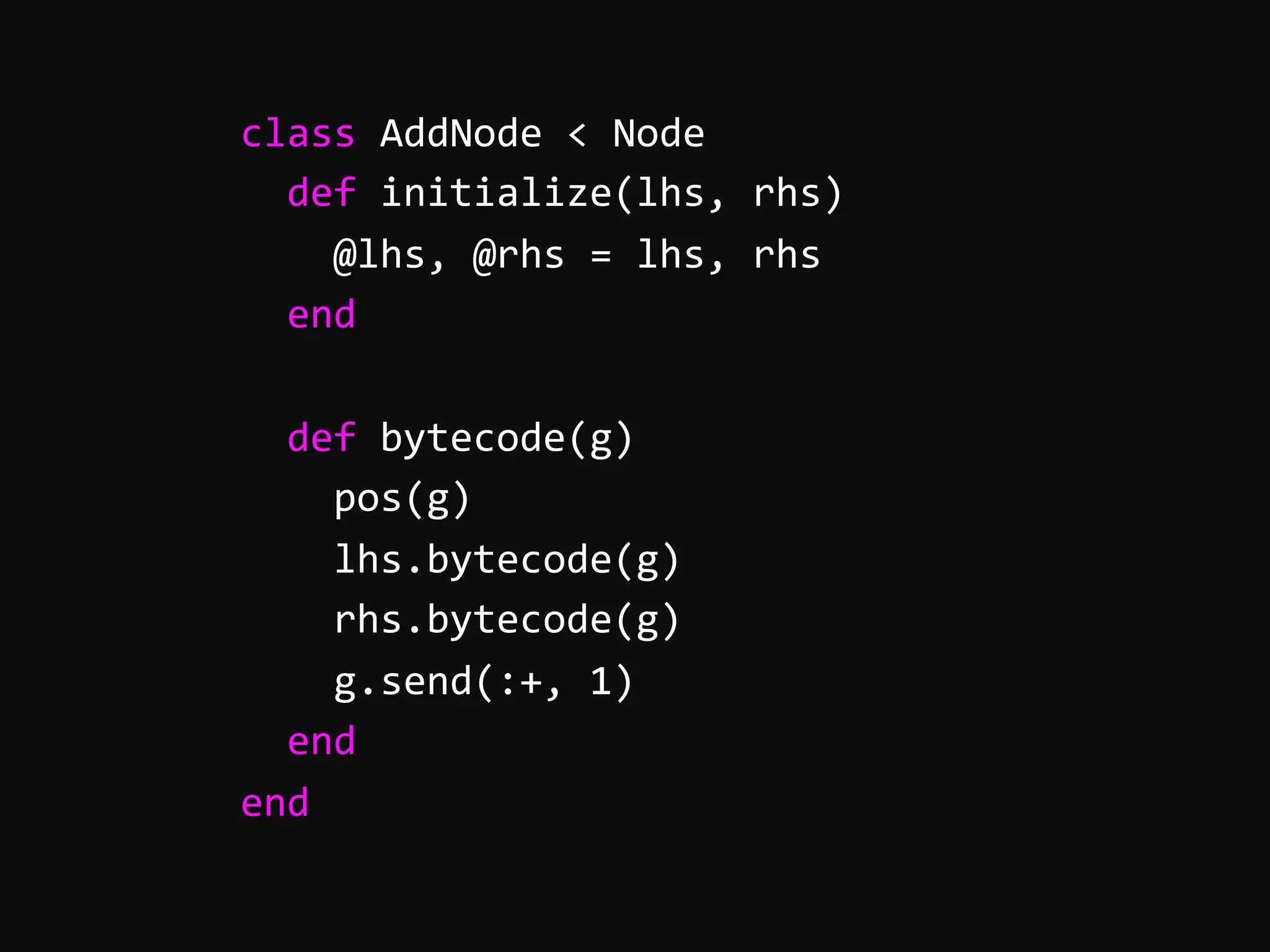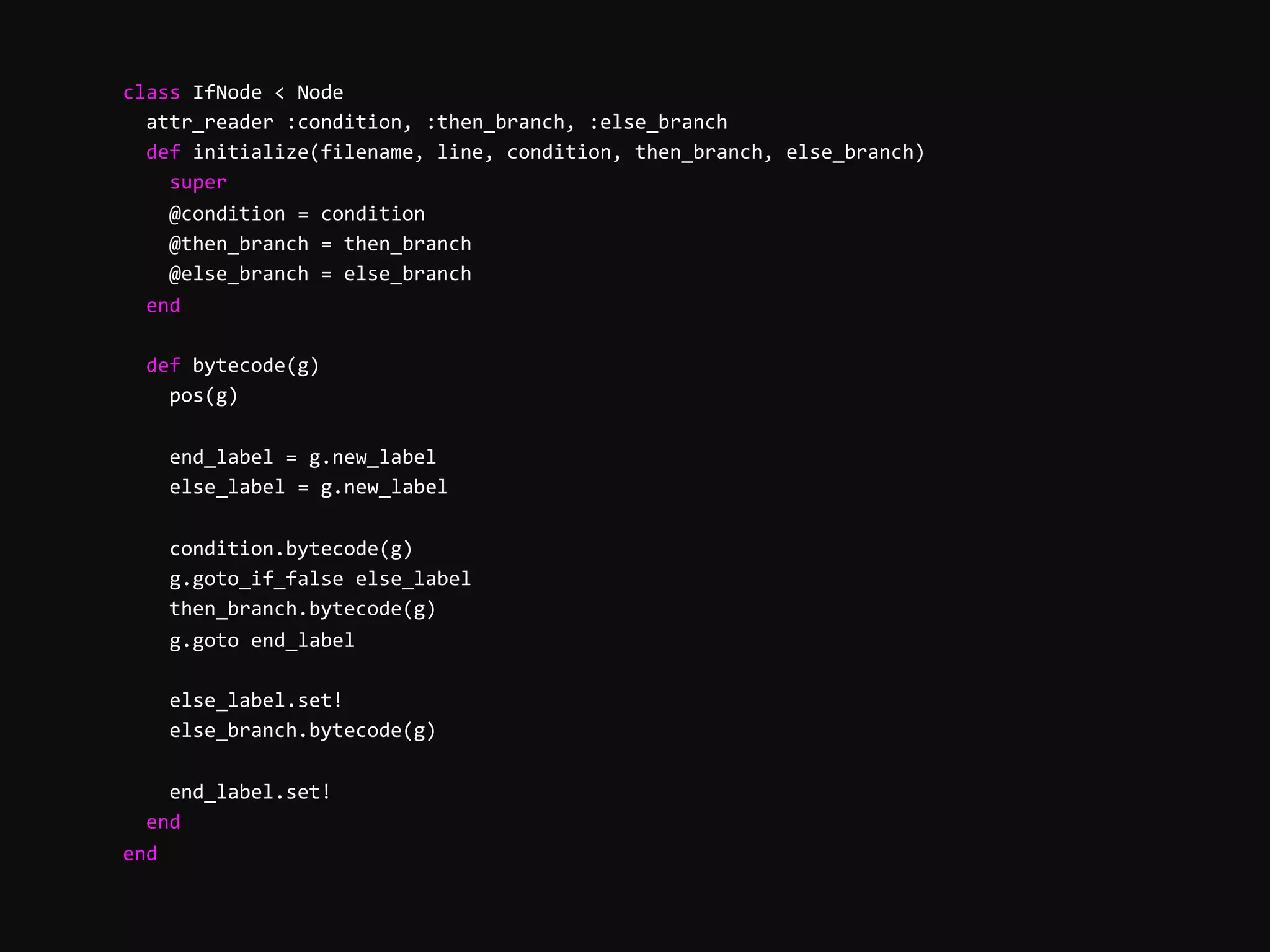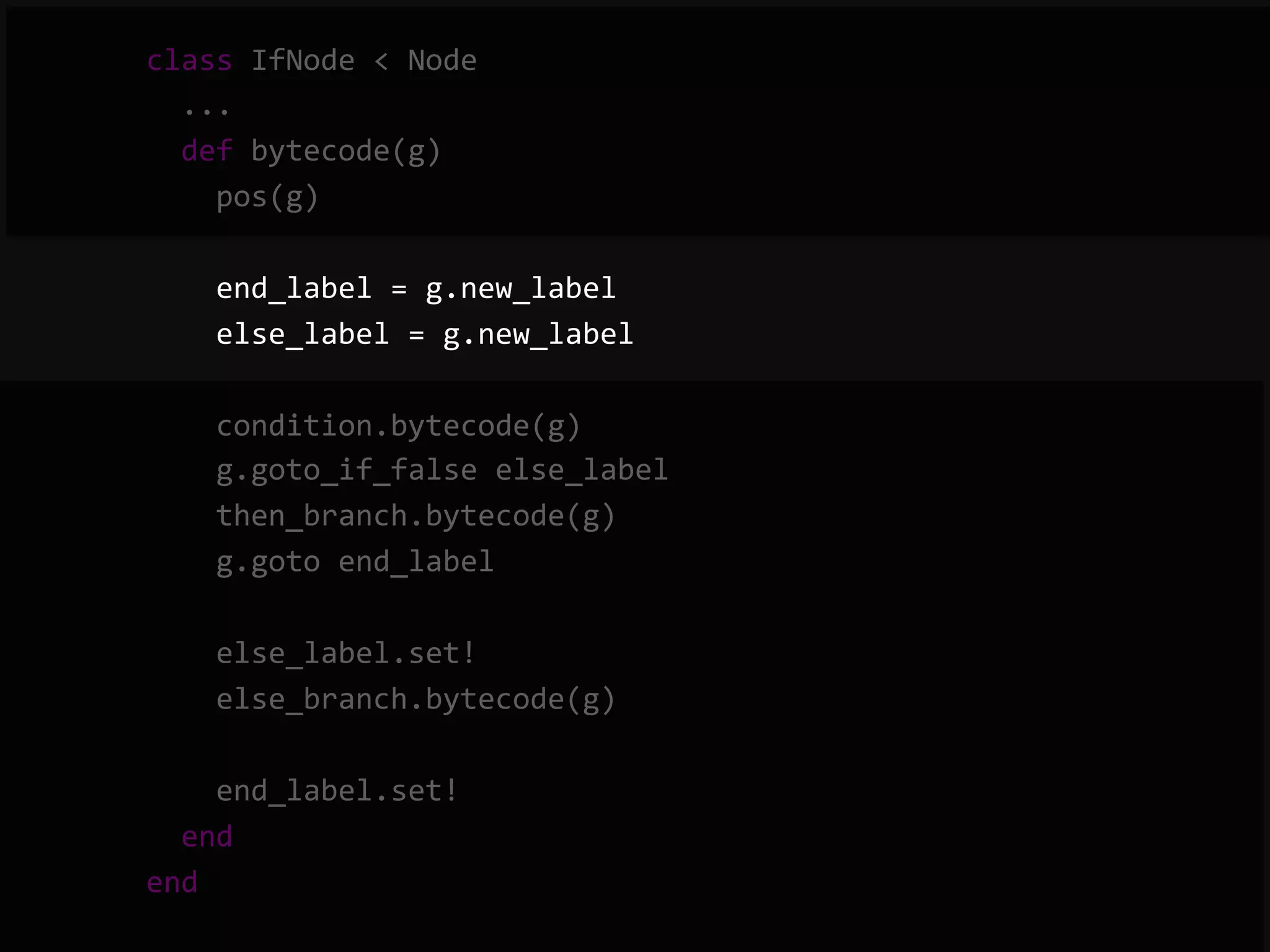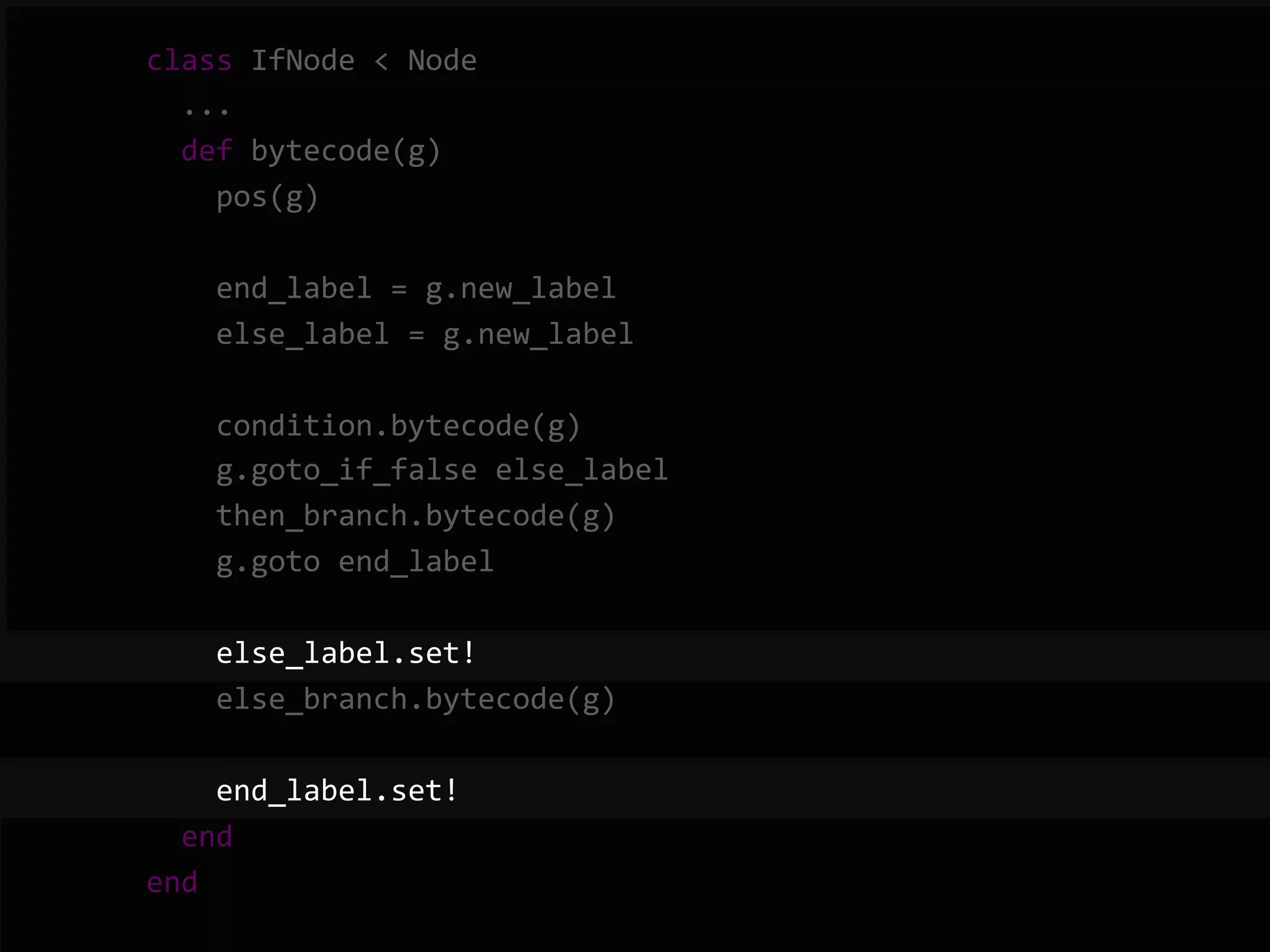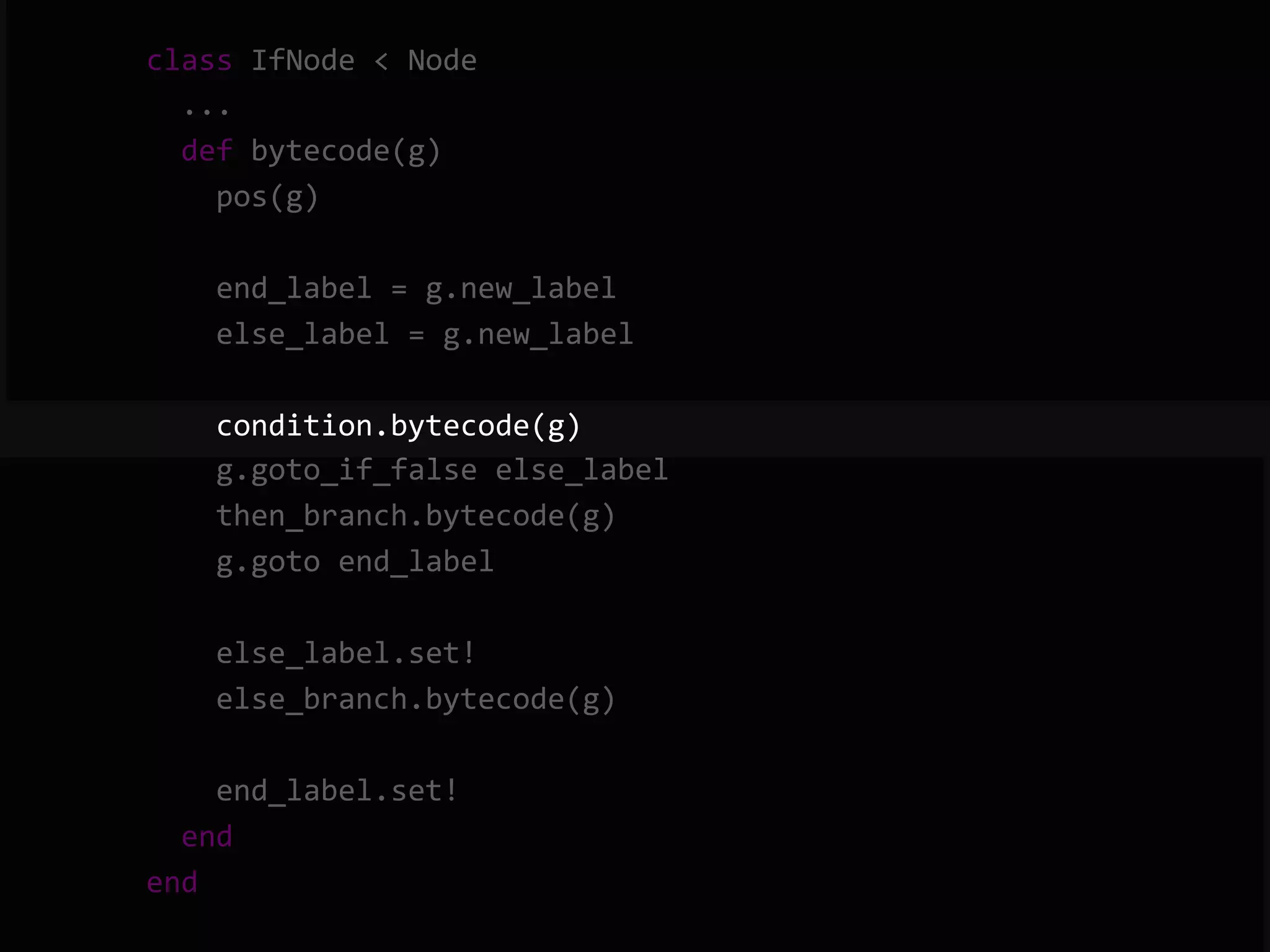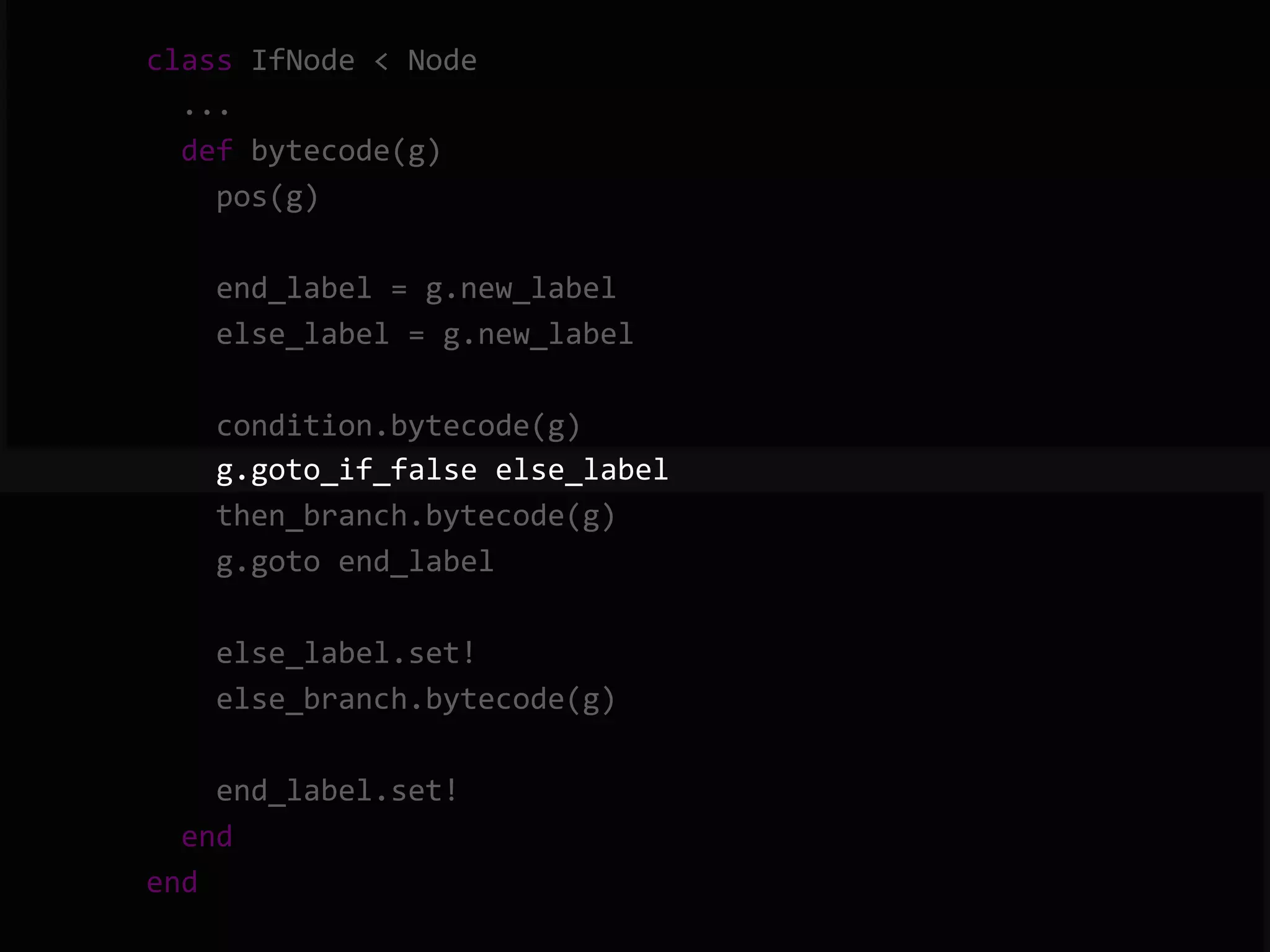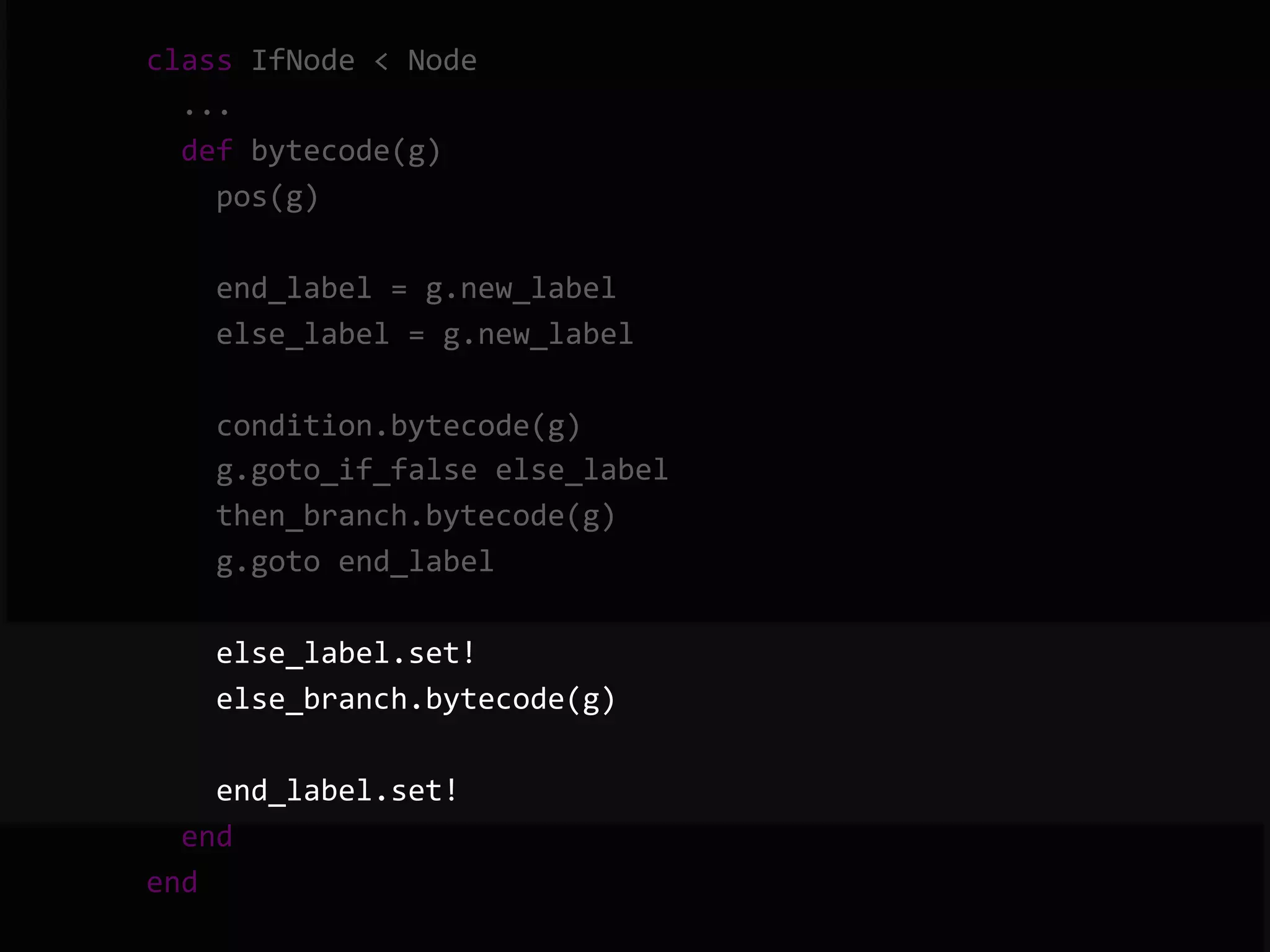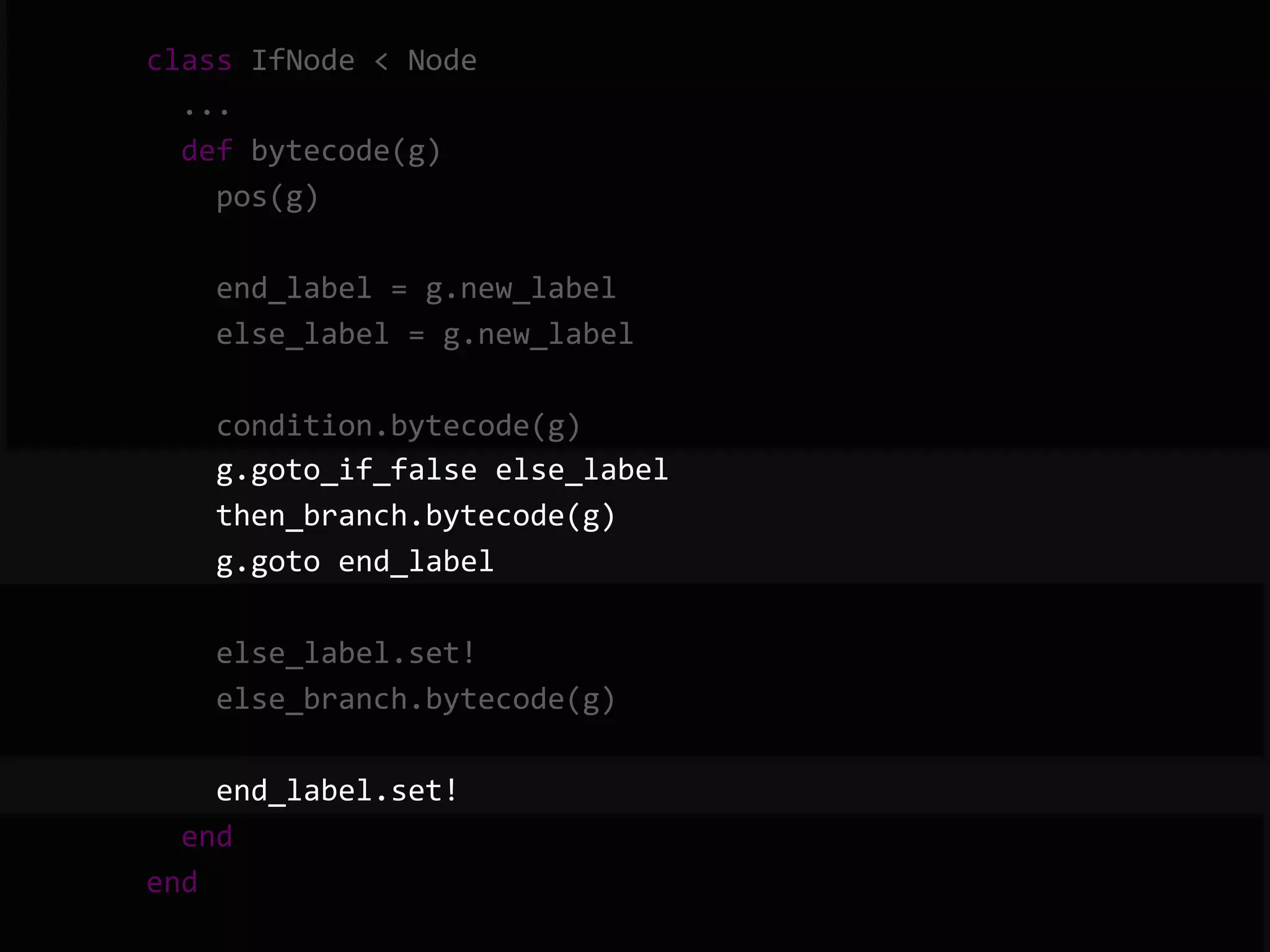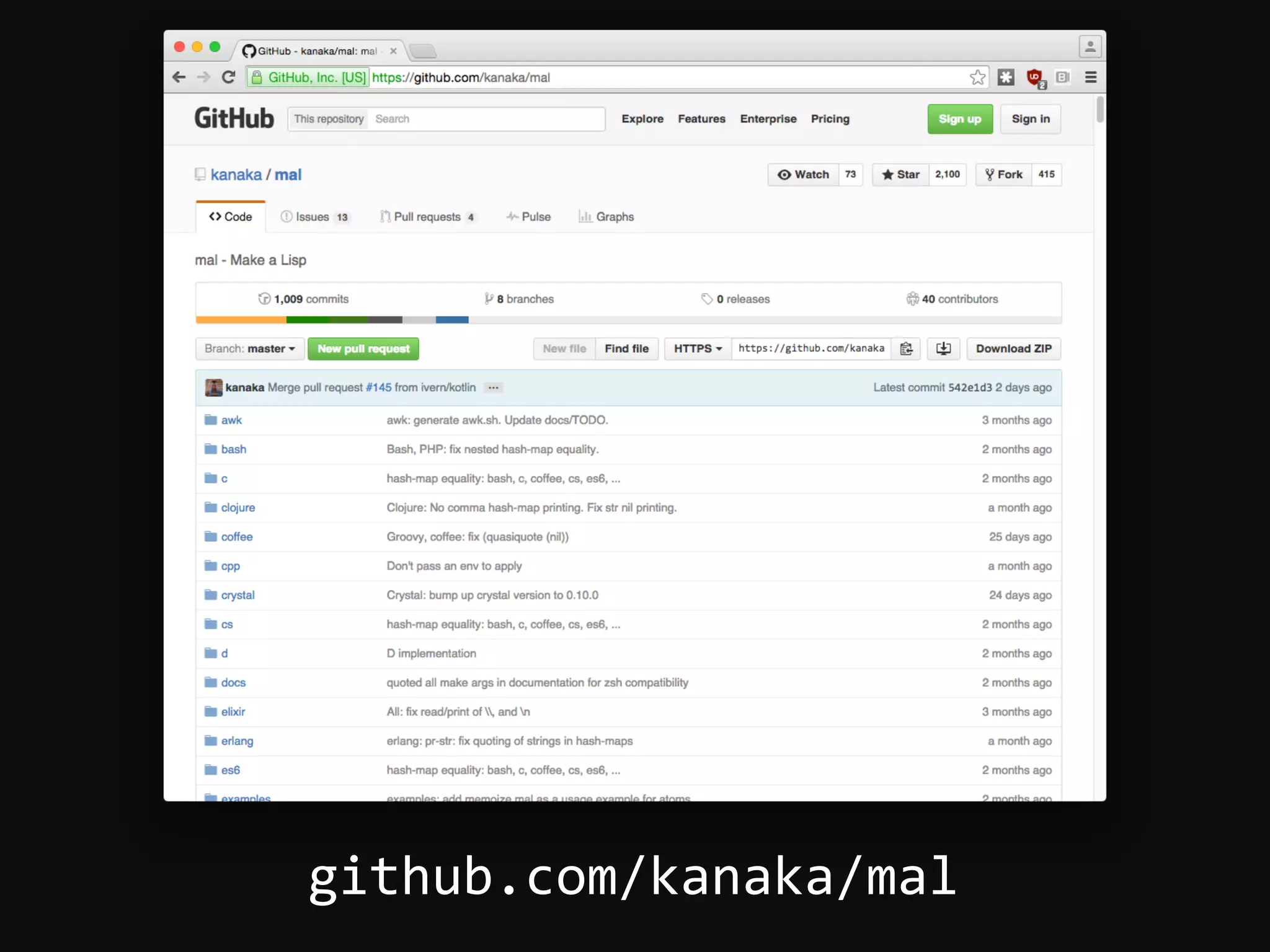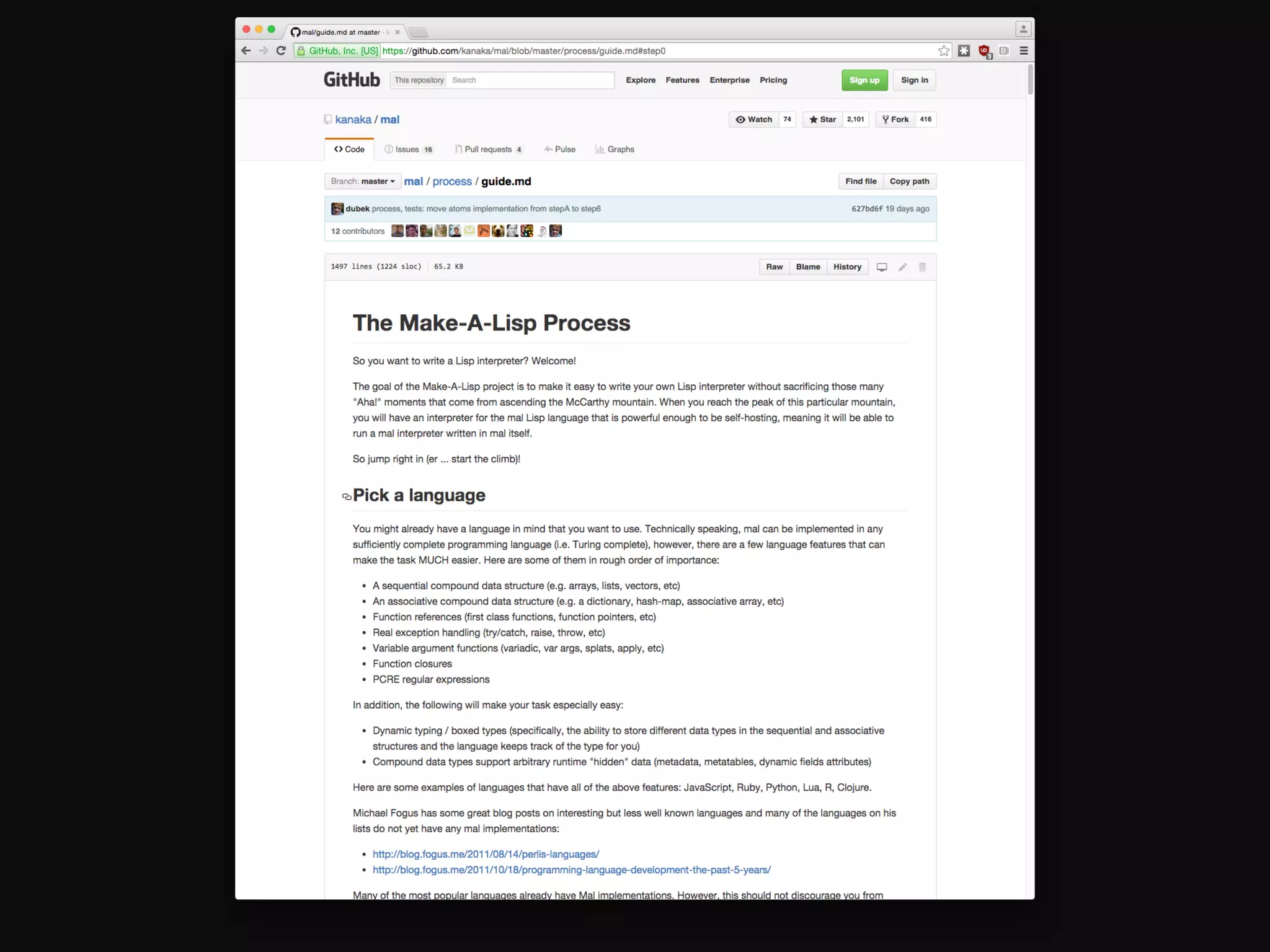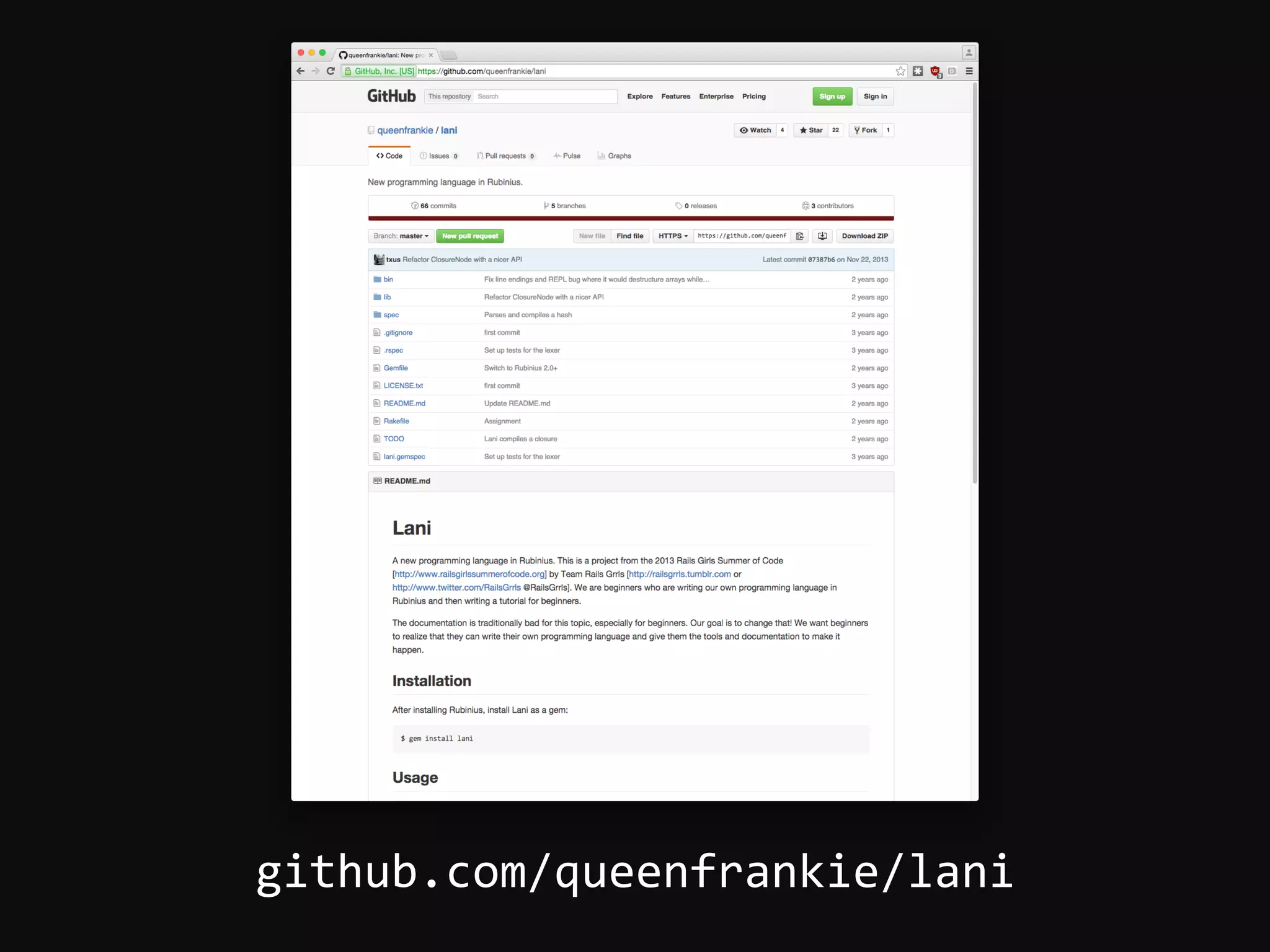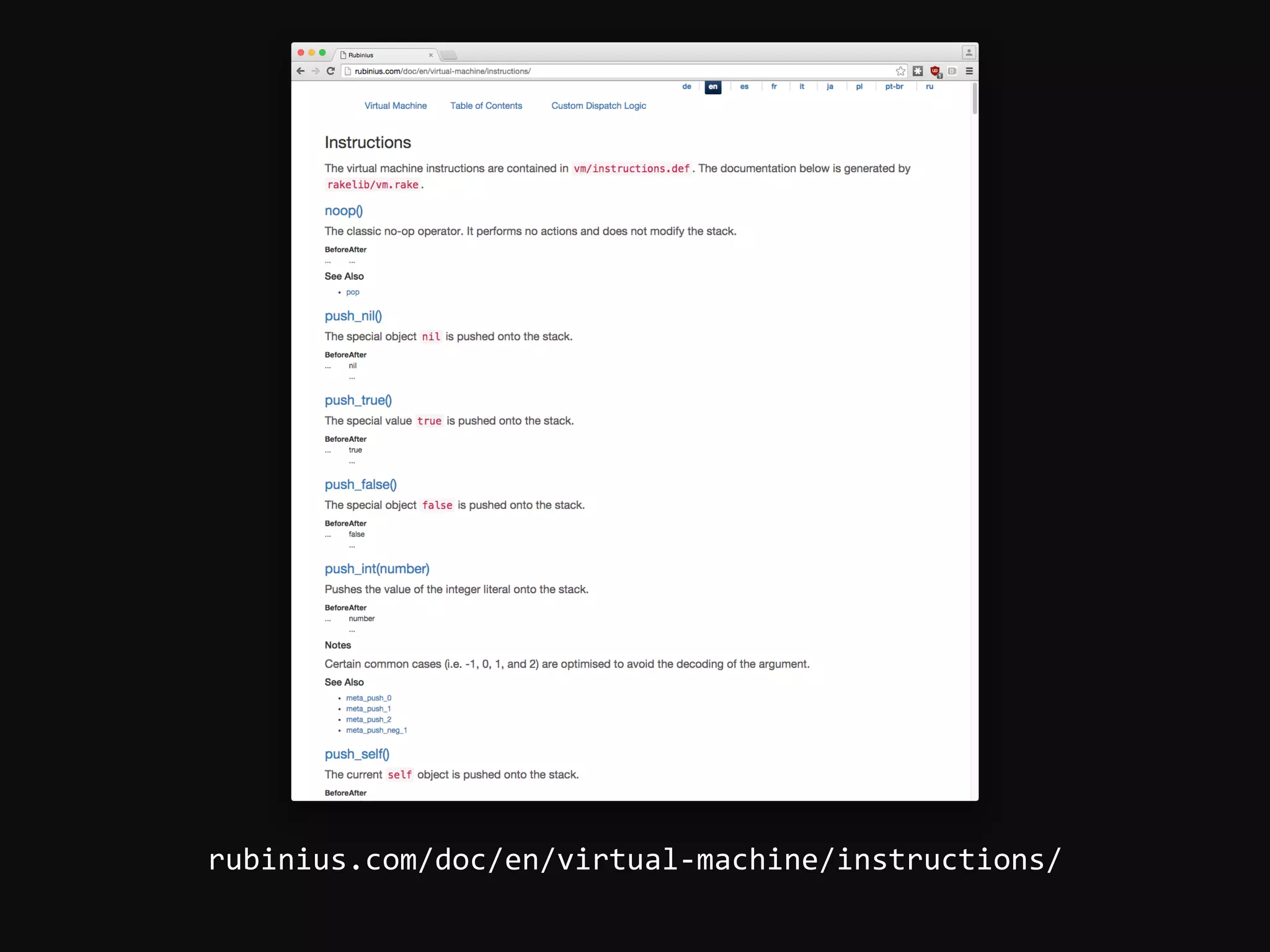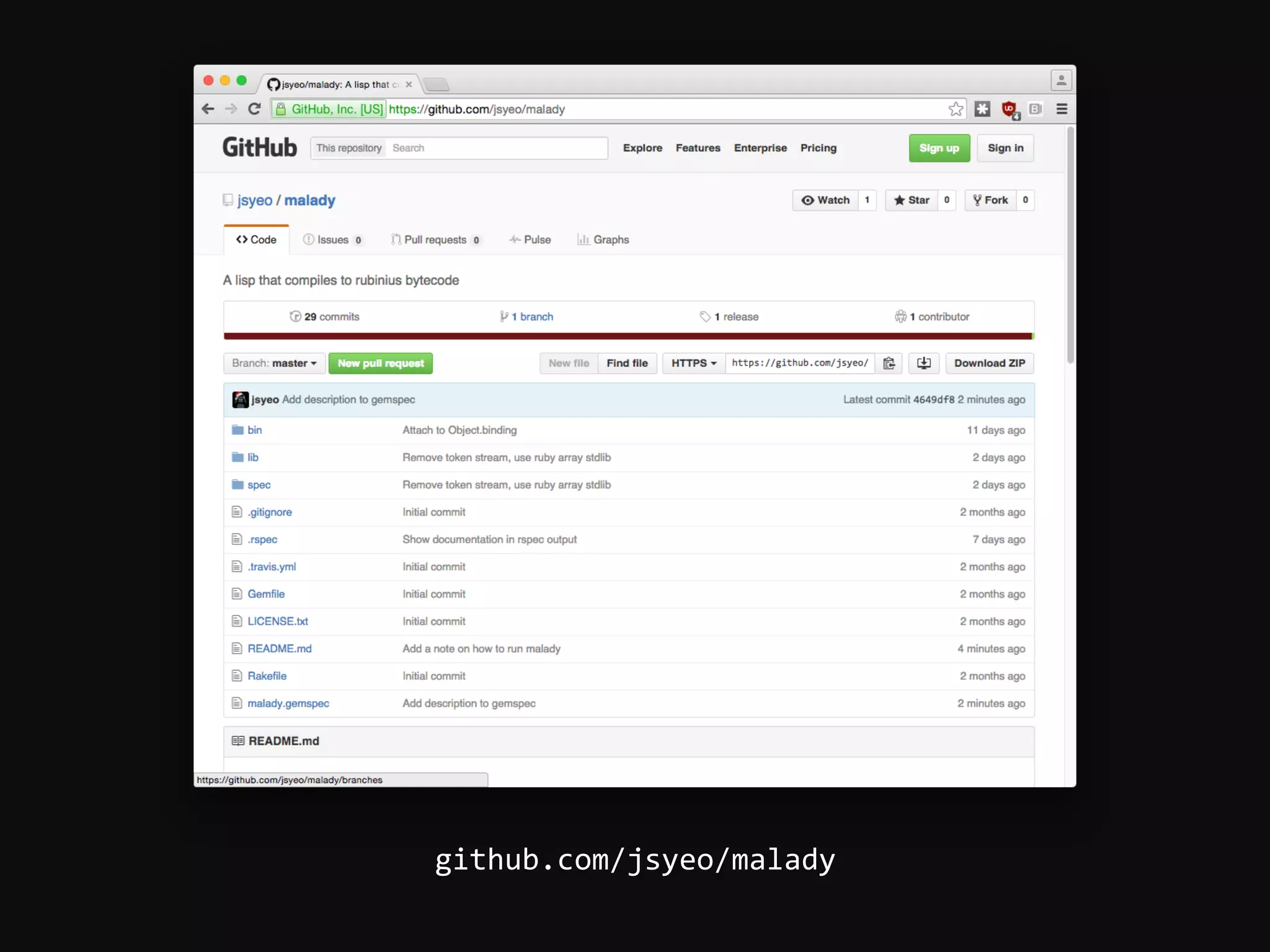The document provides an overview of creating your own programming language. It discusses implementing a basic Lisp dialect called MAL to demonstrate core concepts like parsing, the abstract syntax tree, and defining functions. The examples show how to tokenize, parse, and evaluate simple MAL programs that perform operations like addition and defining functions to square values.

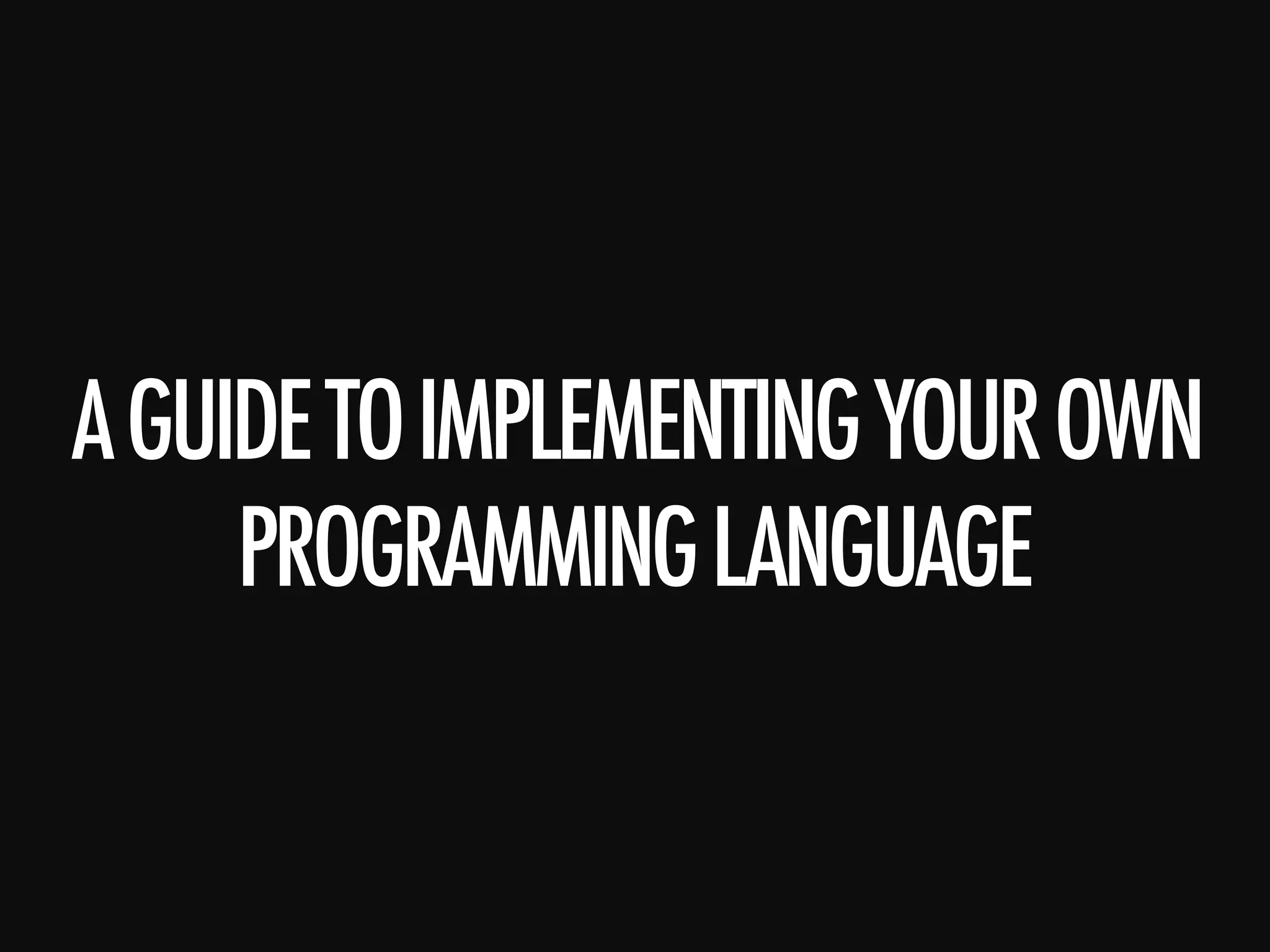


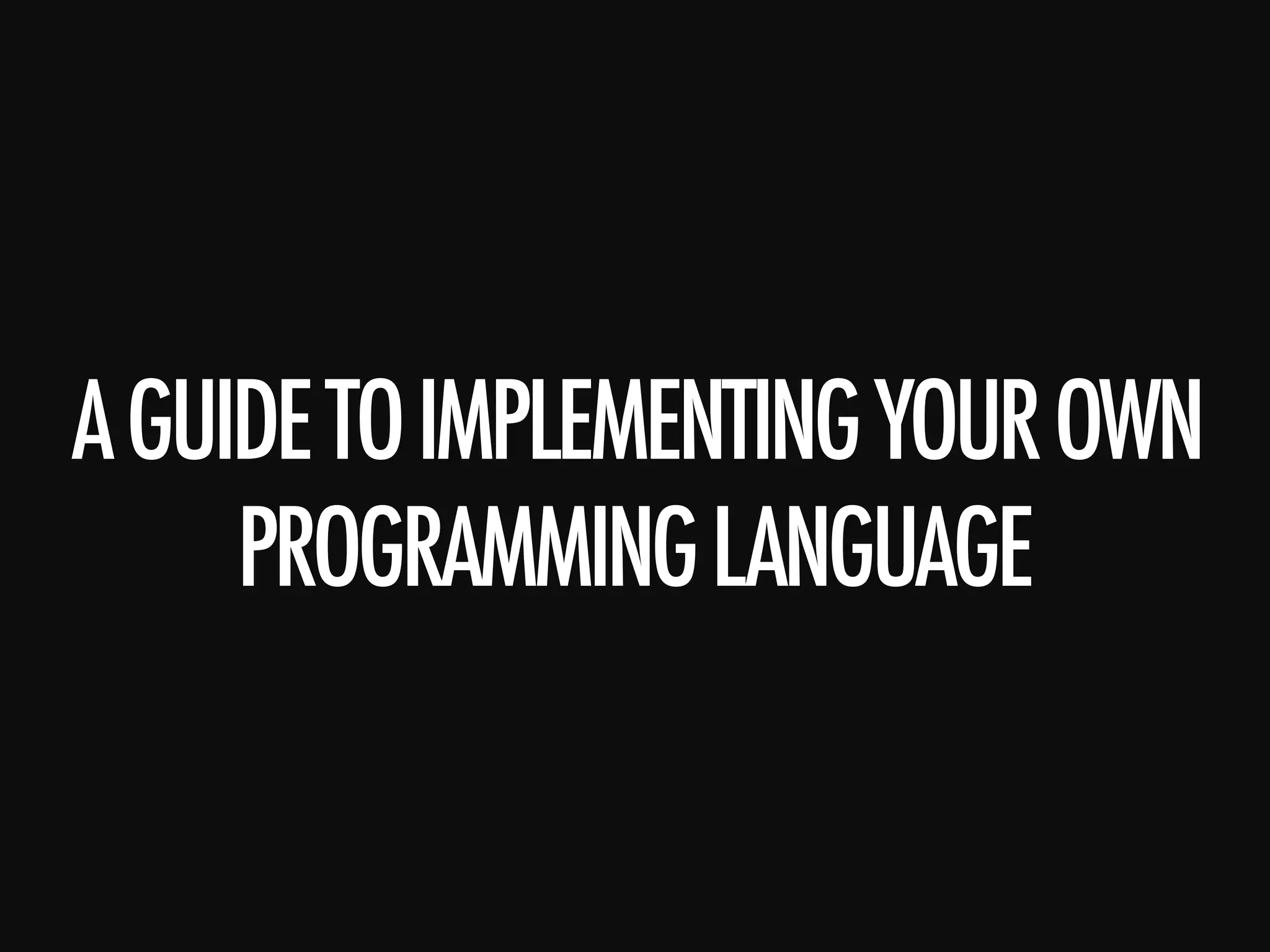

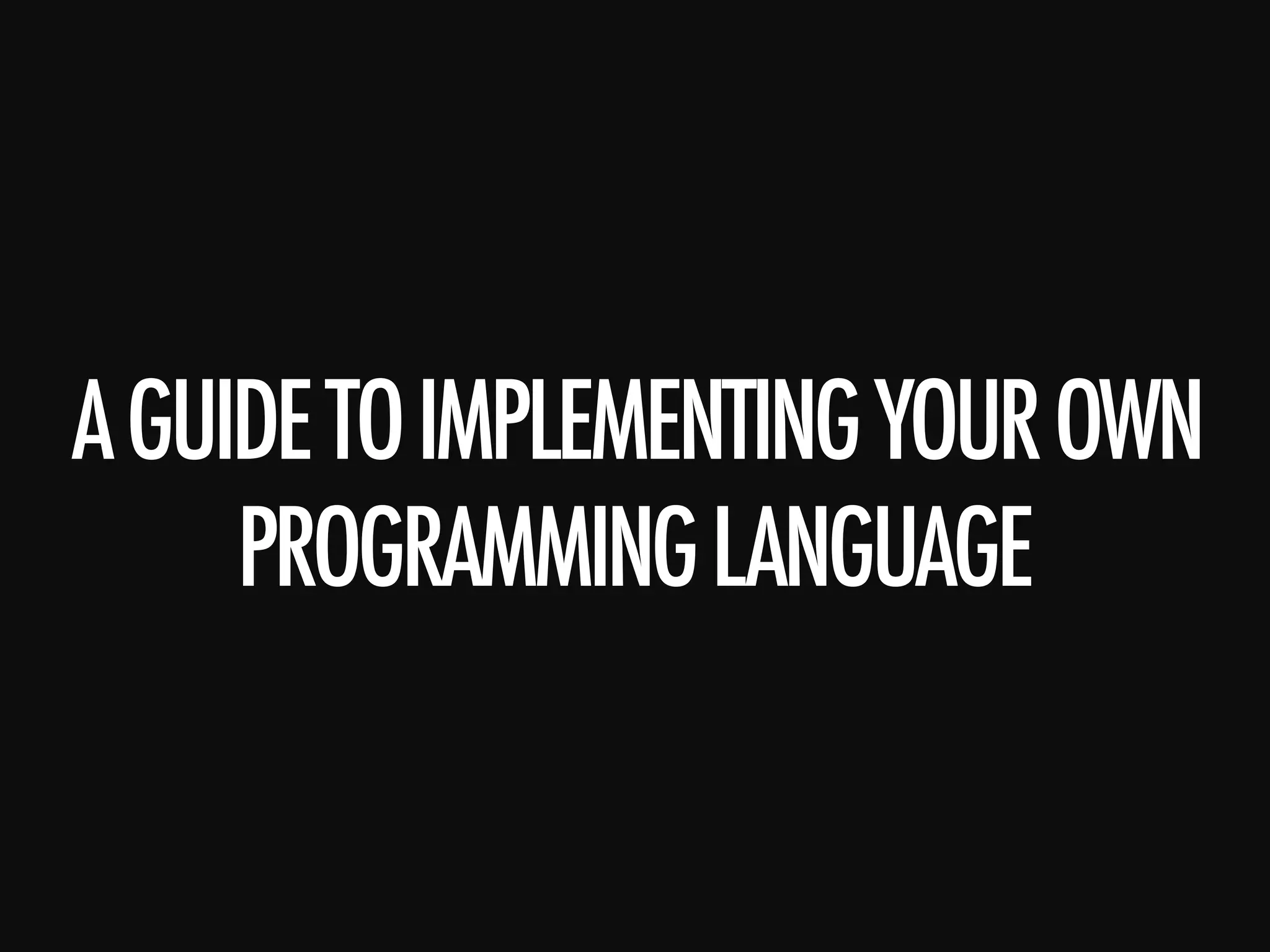



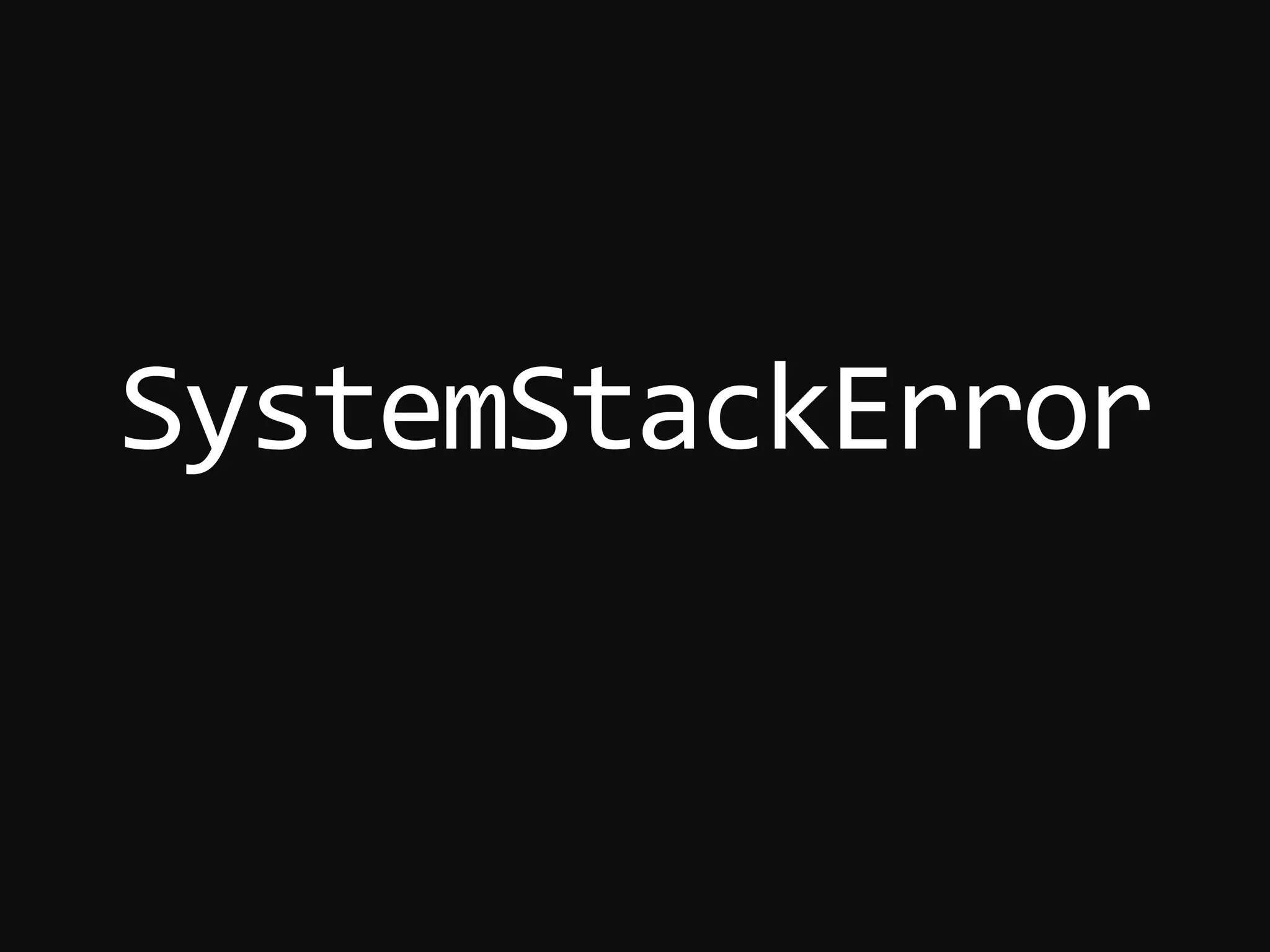
![def case_when n case n when :foo 42 when :bar 88 when :foobar 4288 end end def hash_lookup n { foo: 42 bar: 88 foobar: 4288 }[n] end](https://image.slidesharecdn.com/rubysgtalk-160126154418/75/Slaying-the-Dragon-Implementing-a-Programming-Language-in-Ruby-12-2048.jpg)







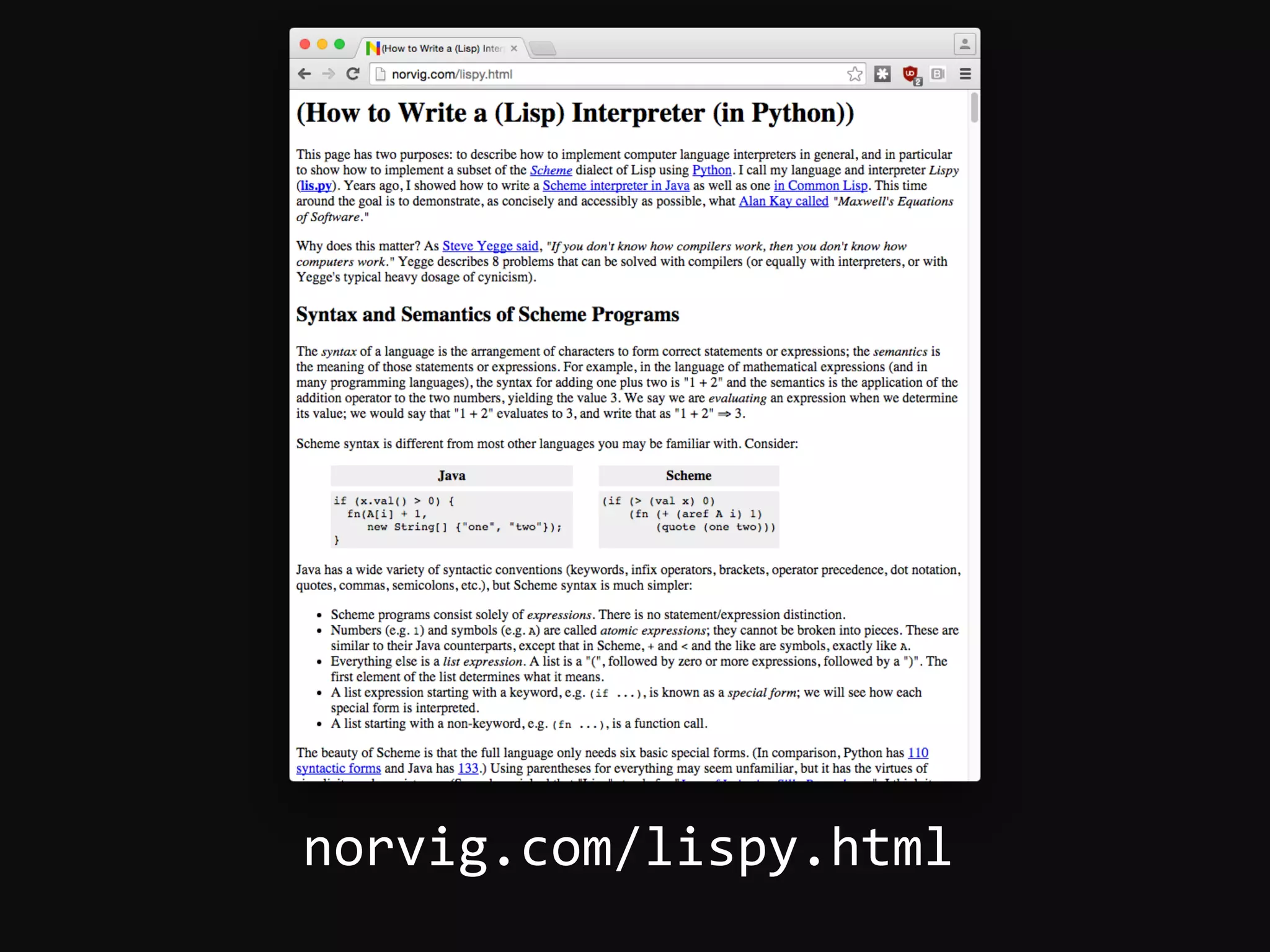

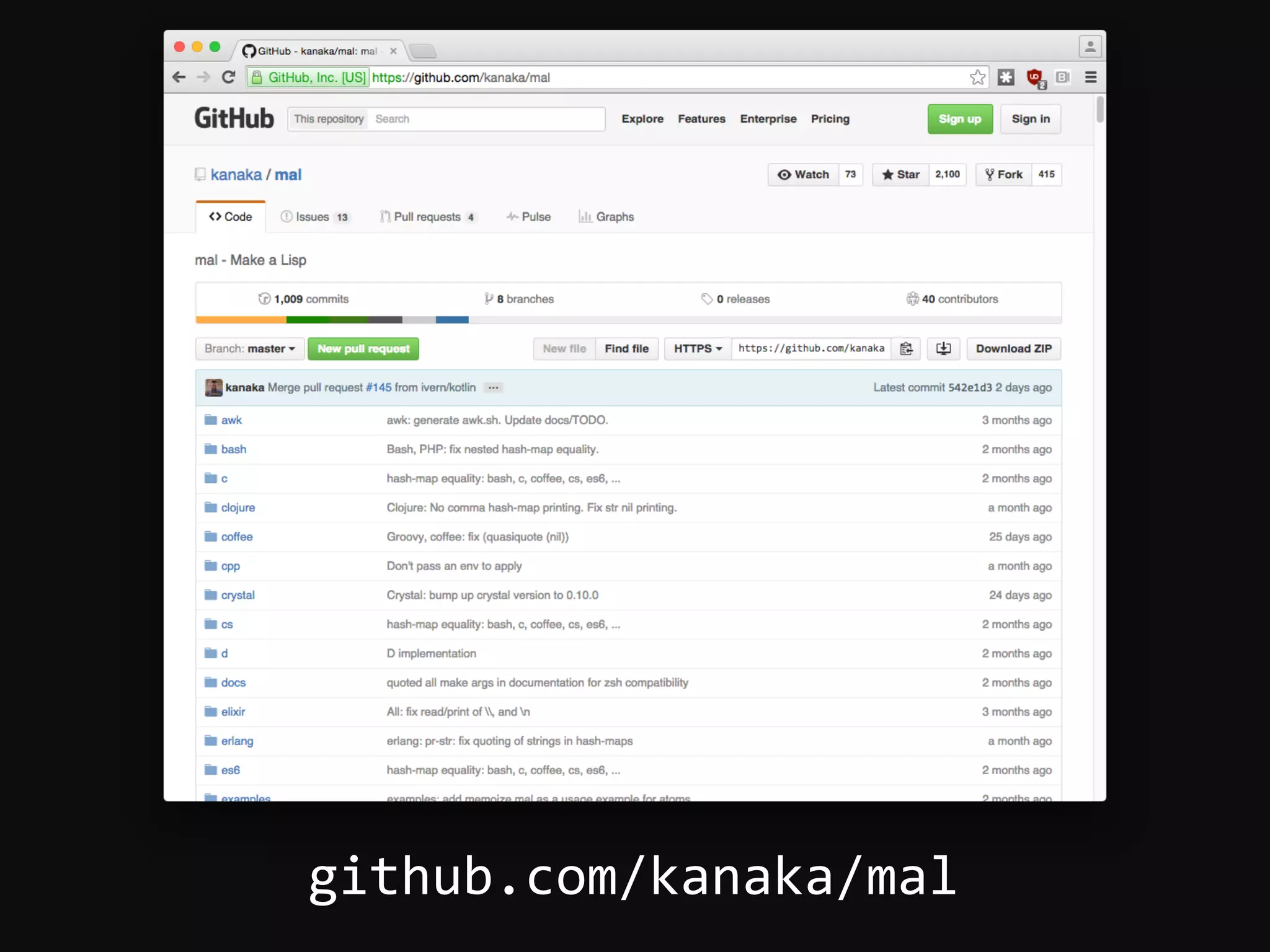

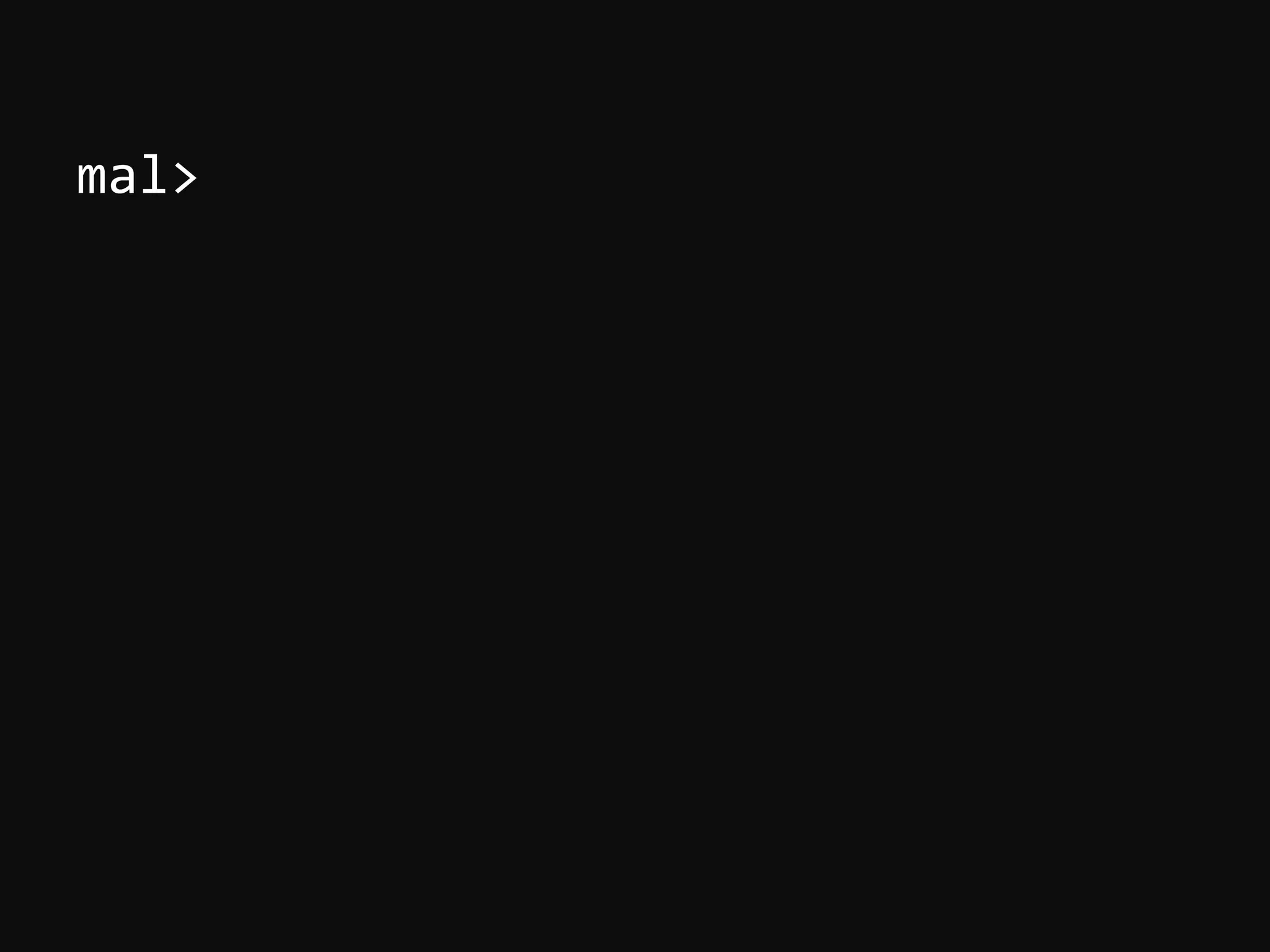
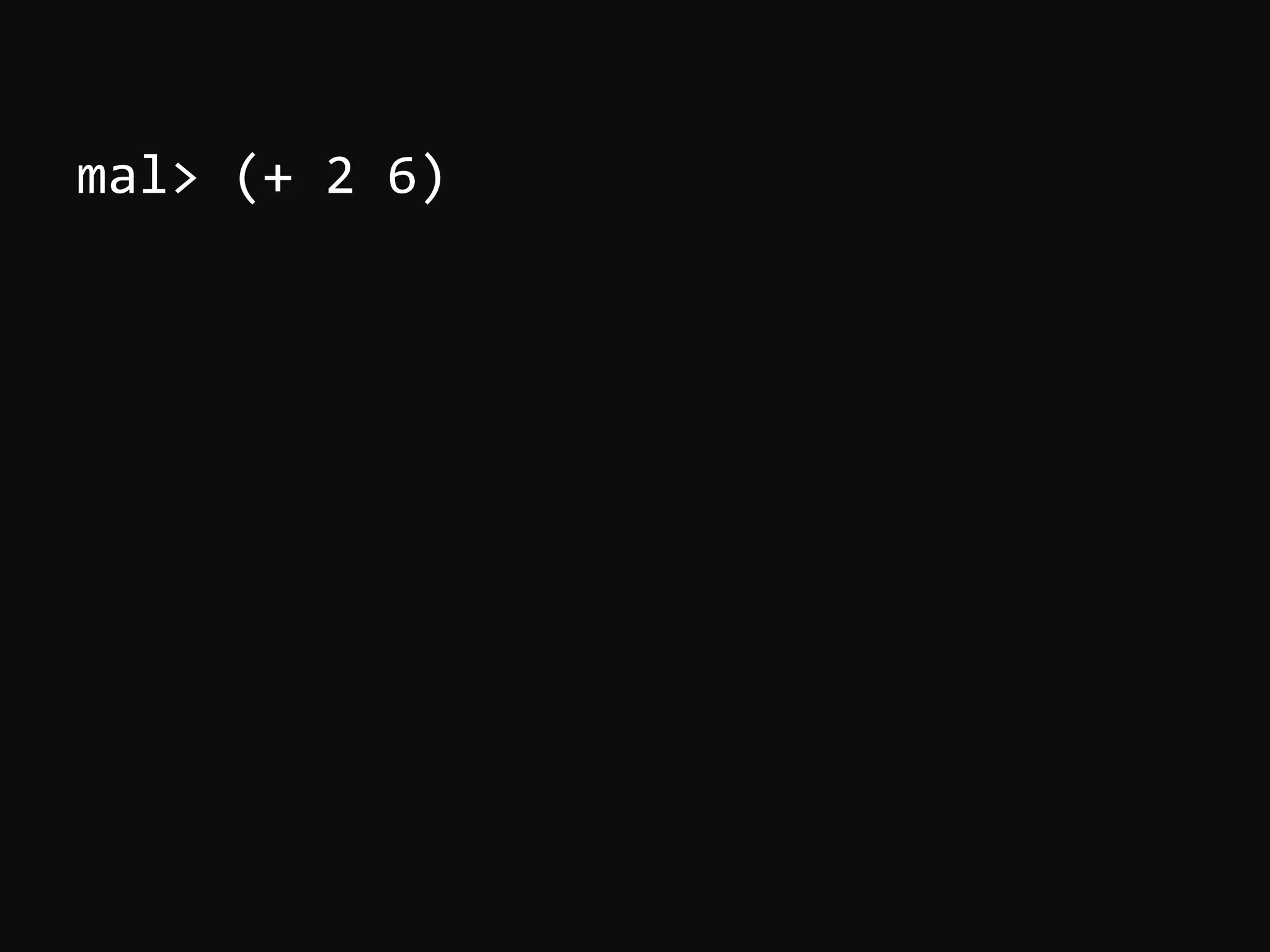
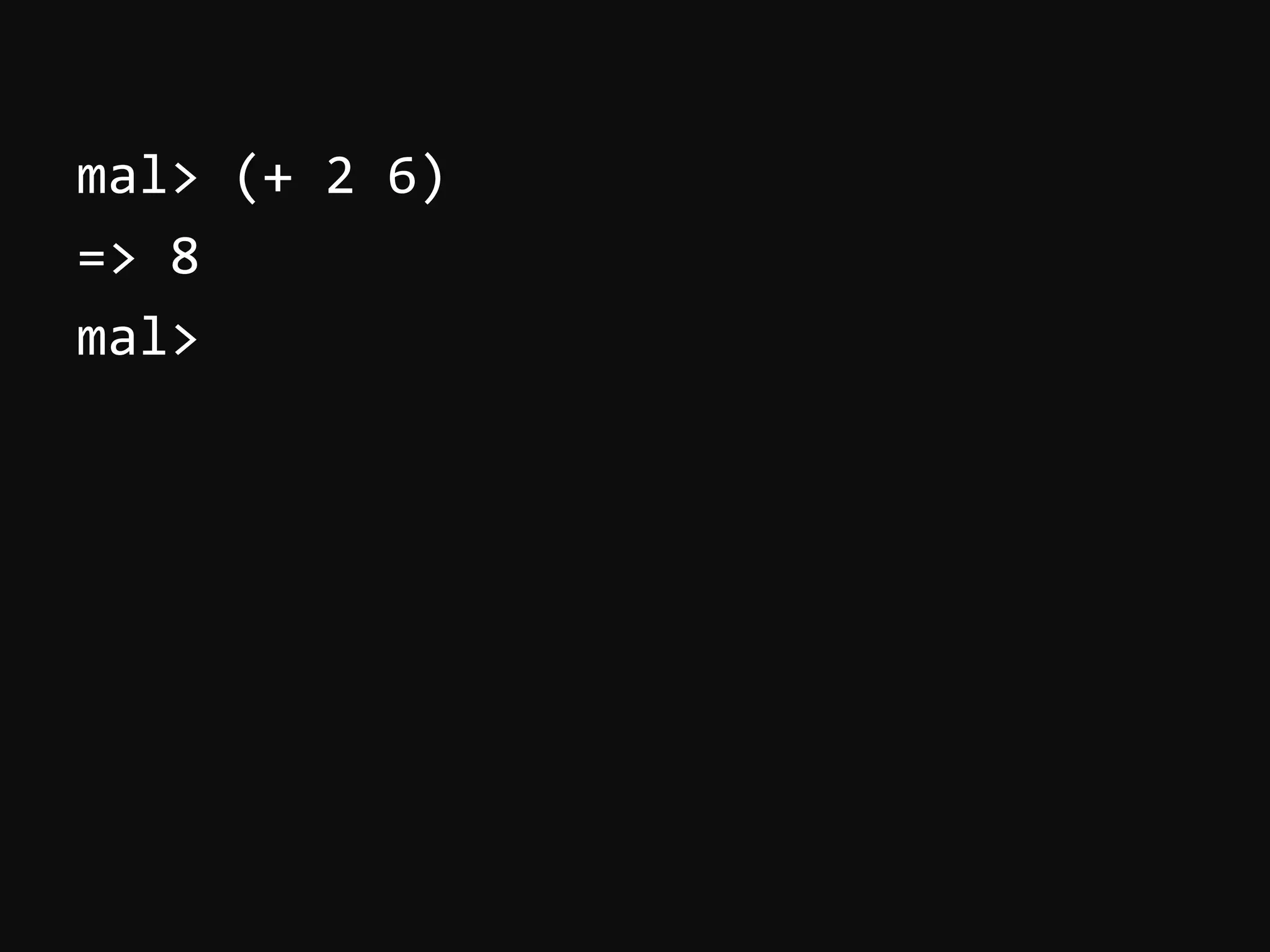
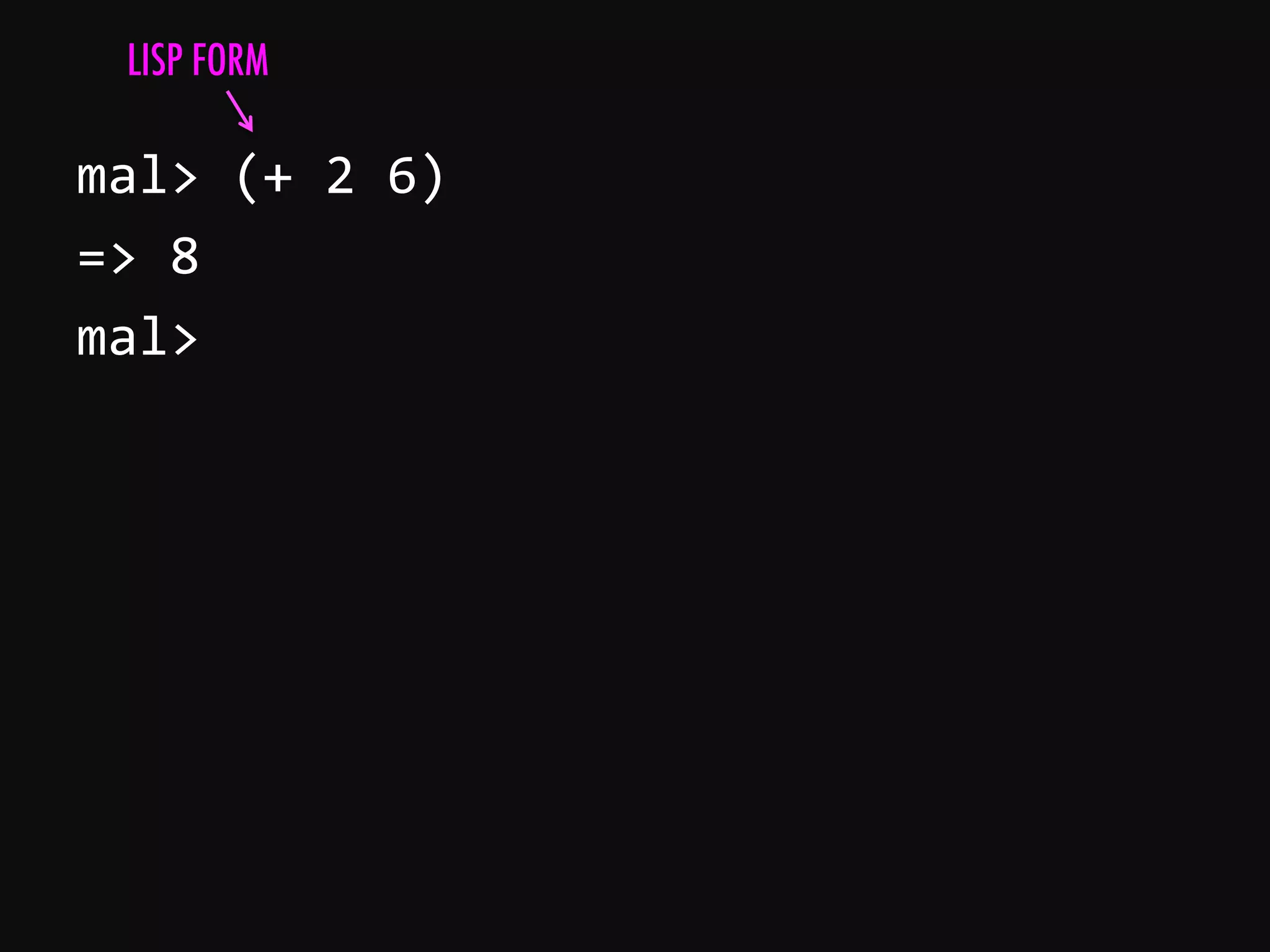
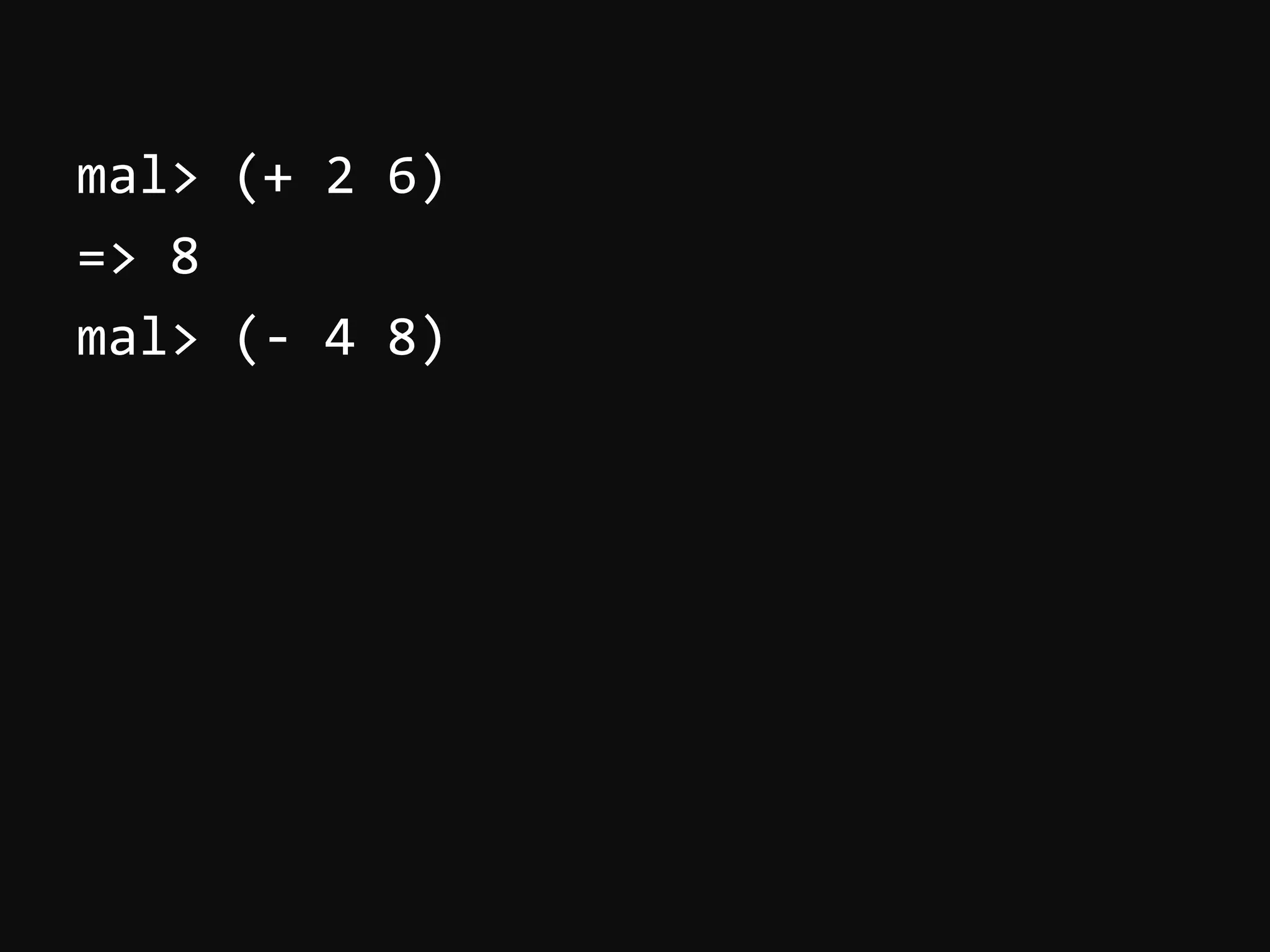
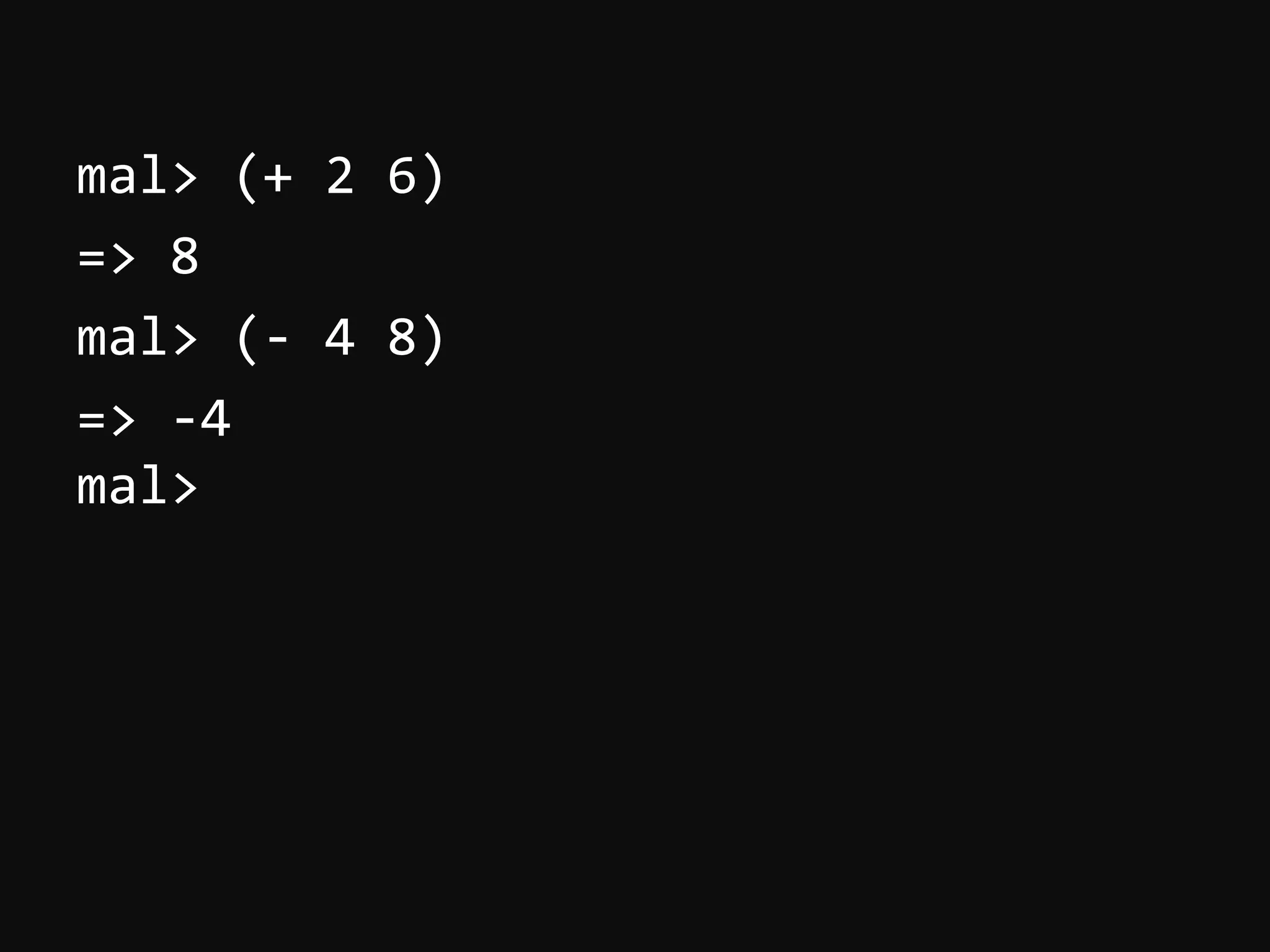
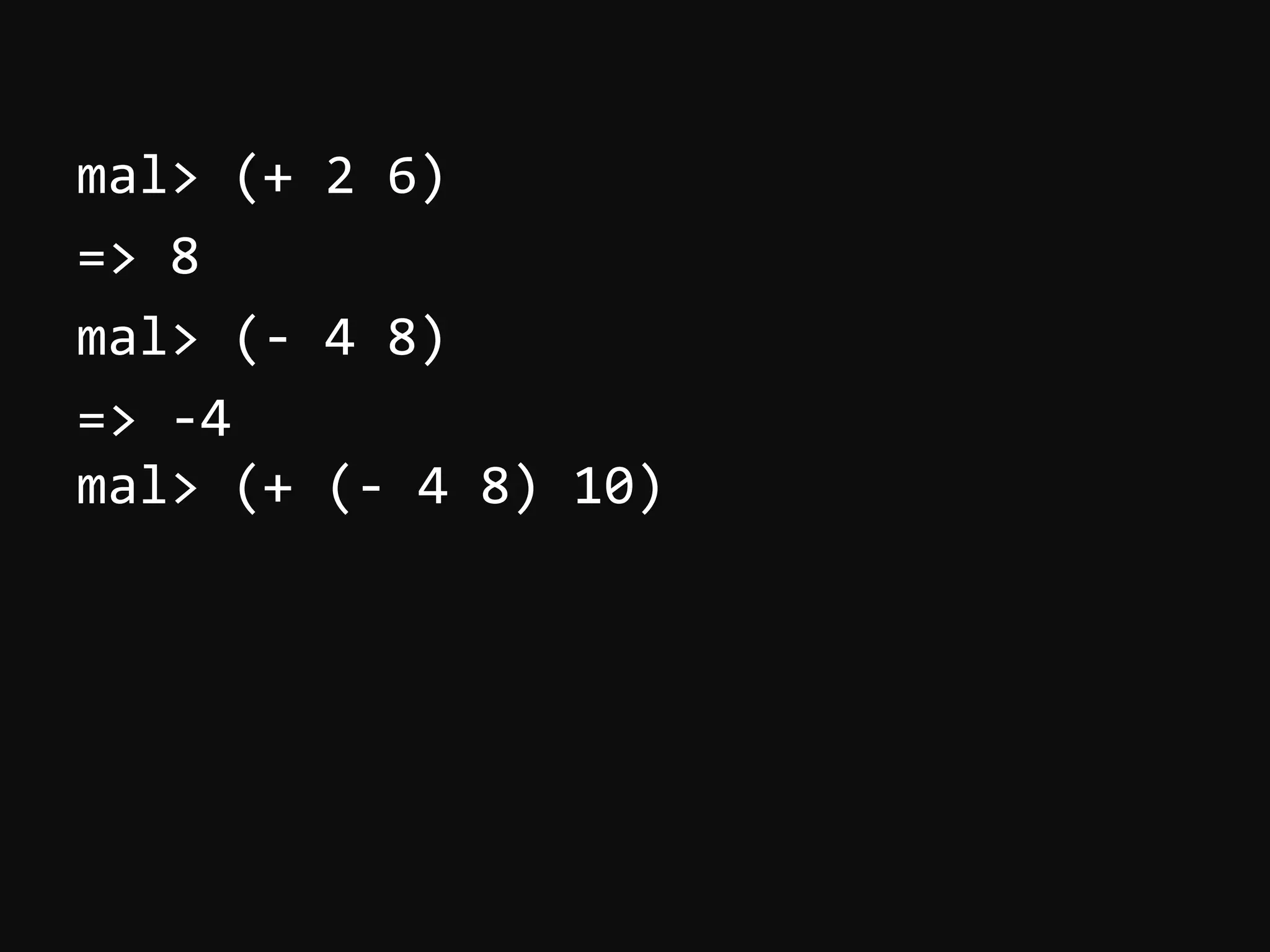
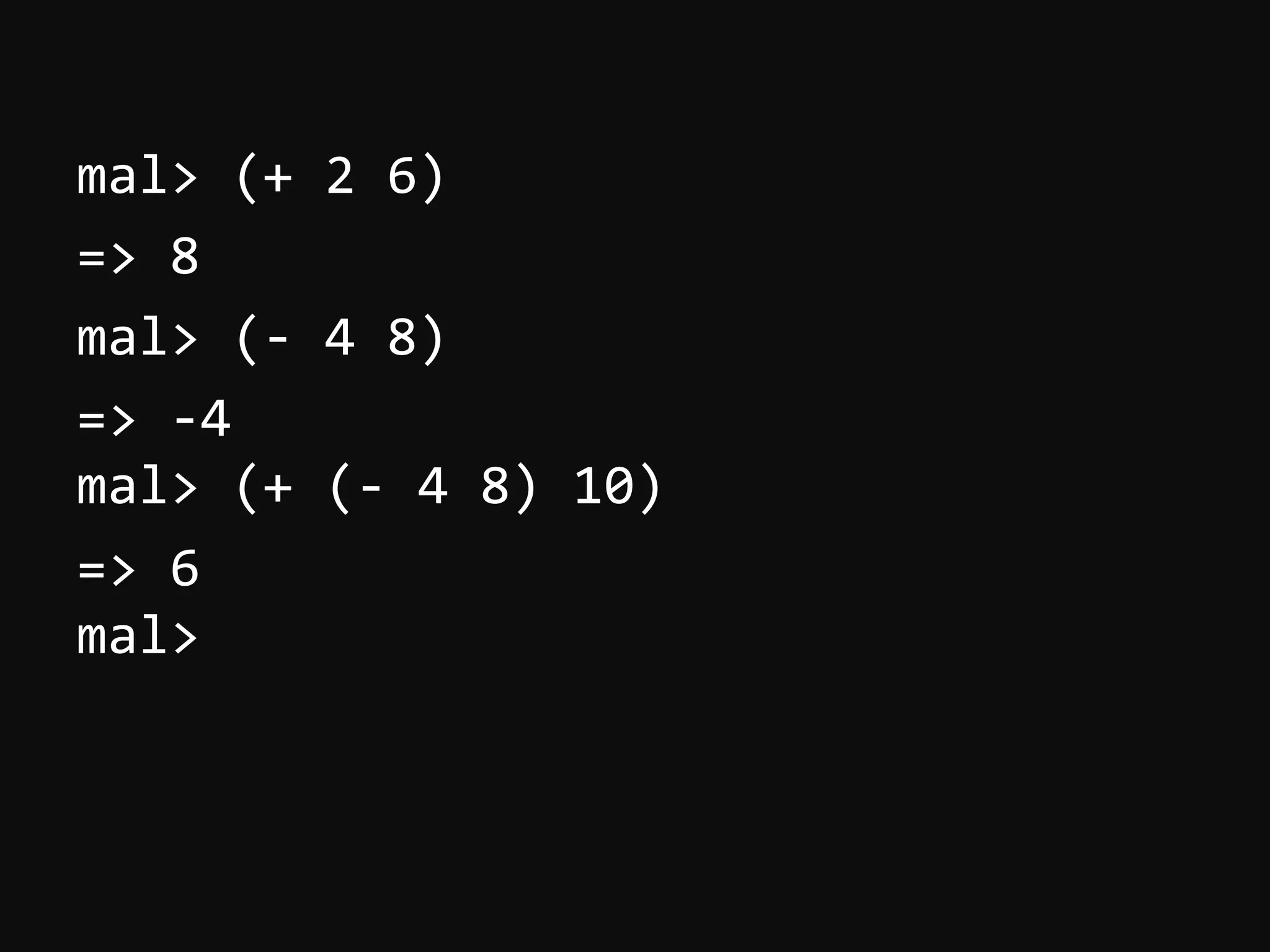
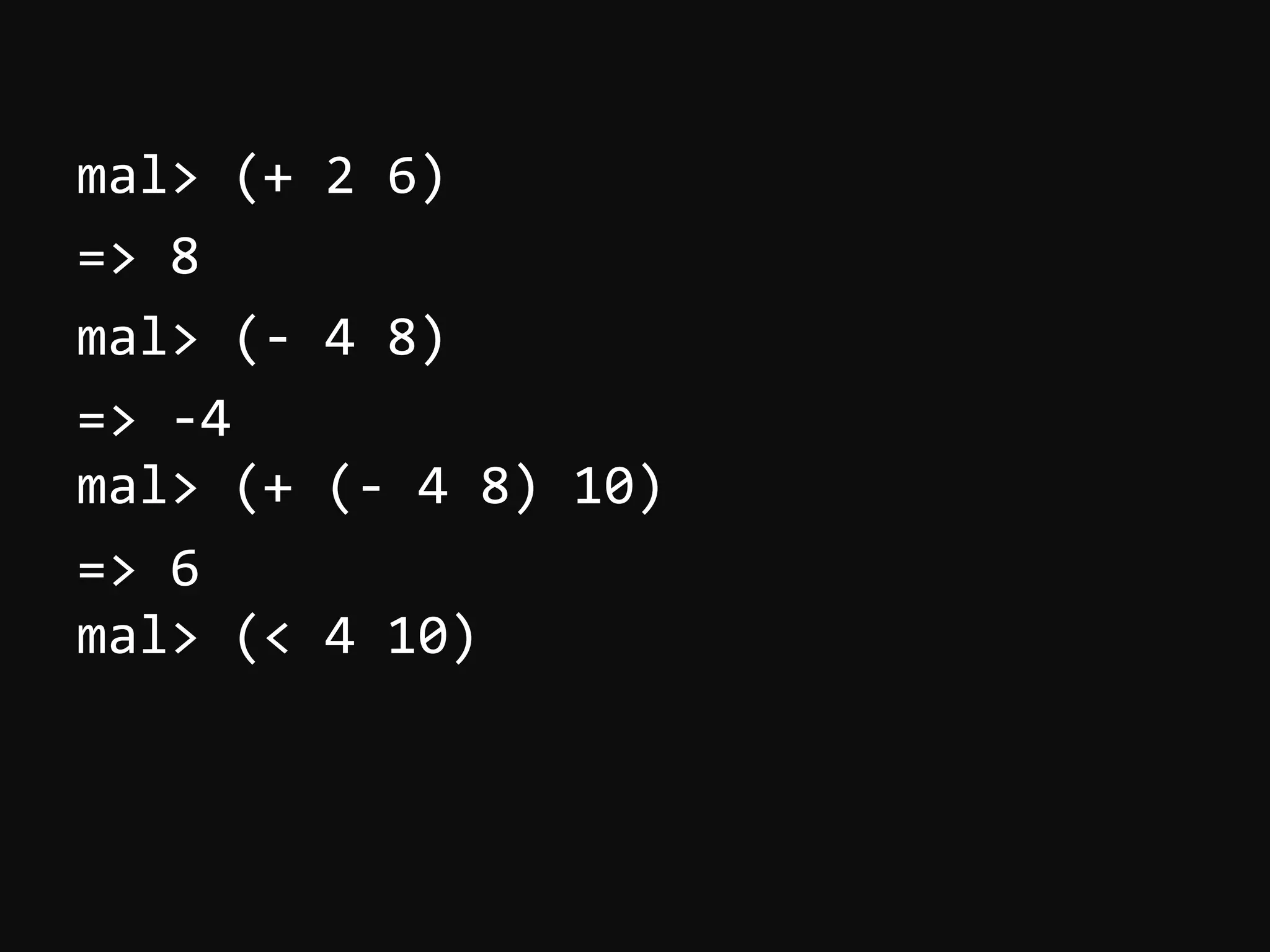
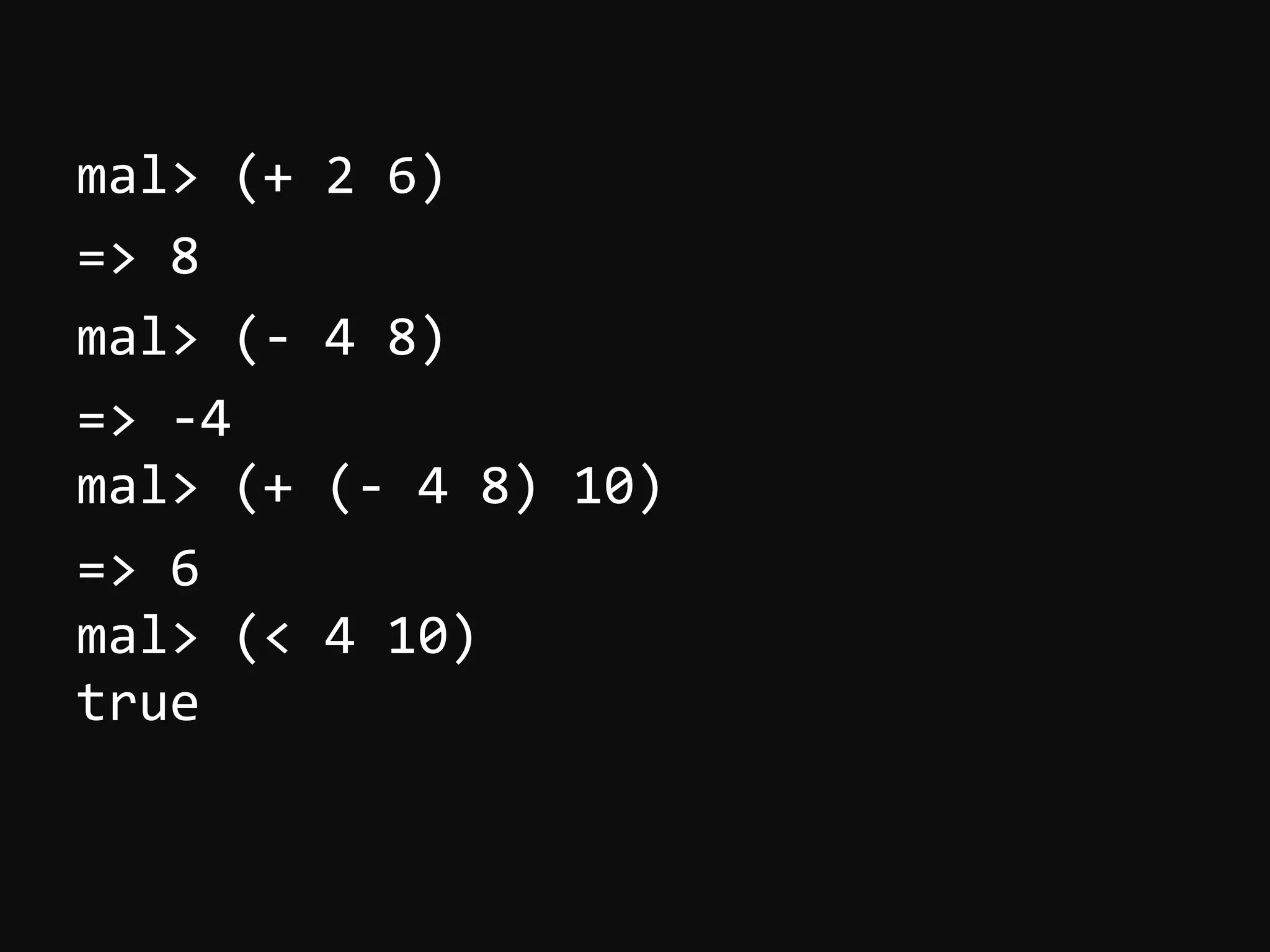
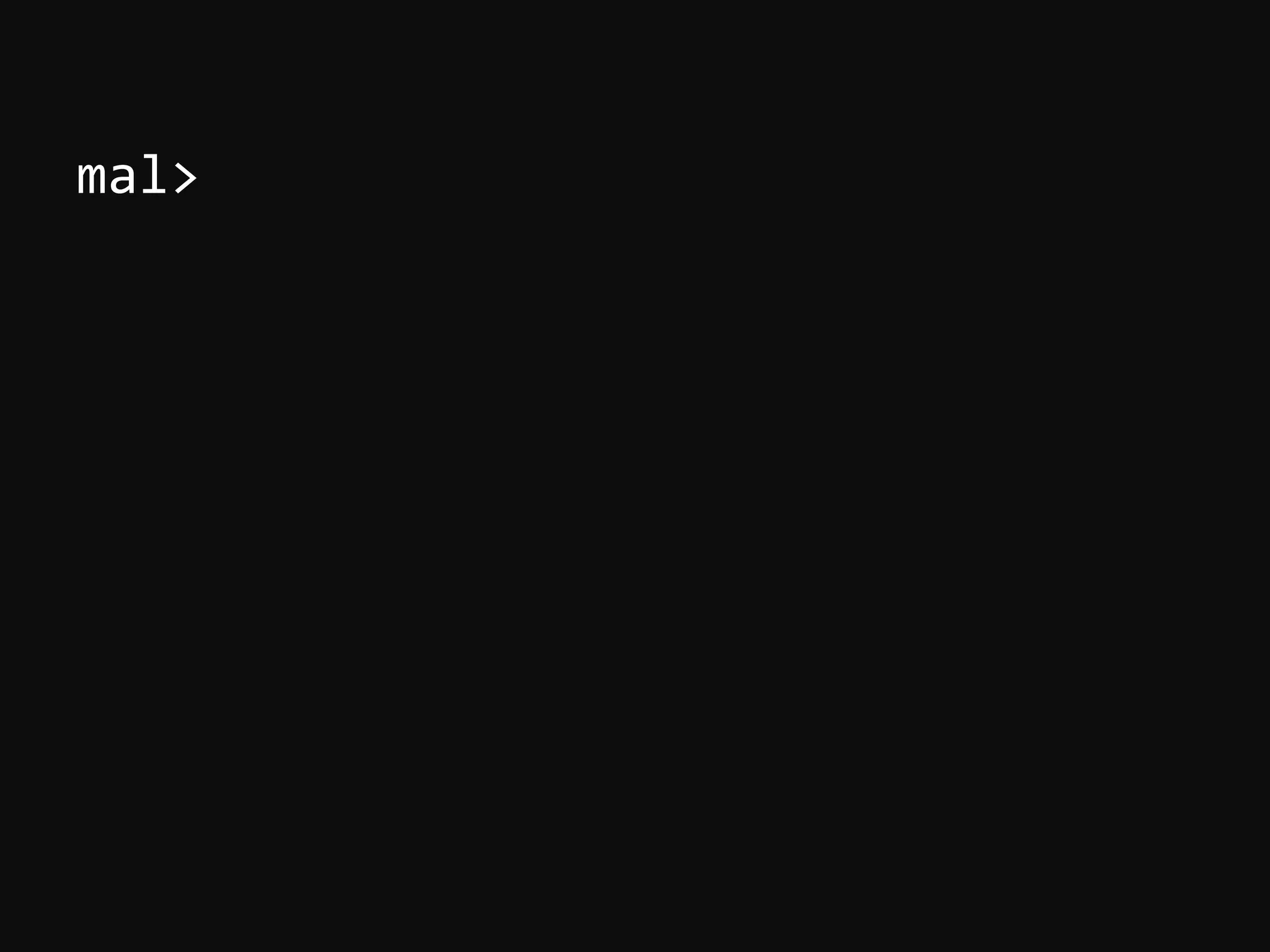
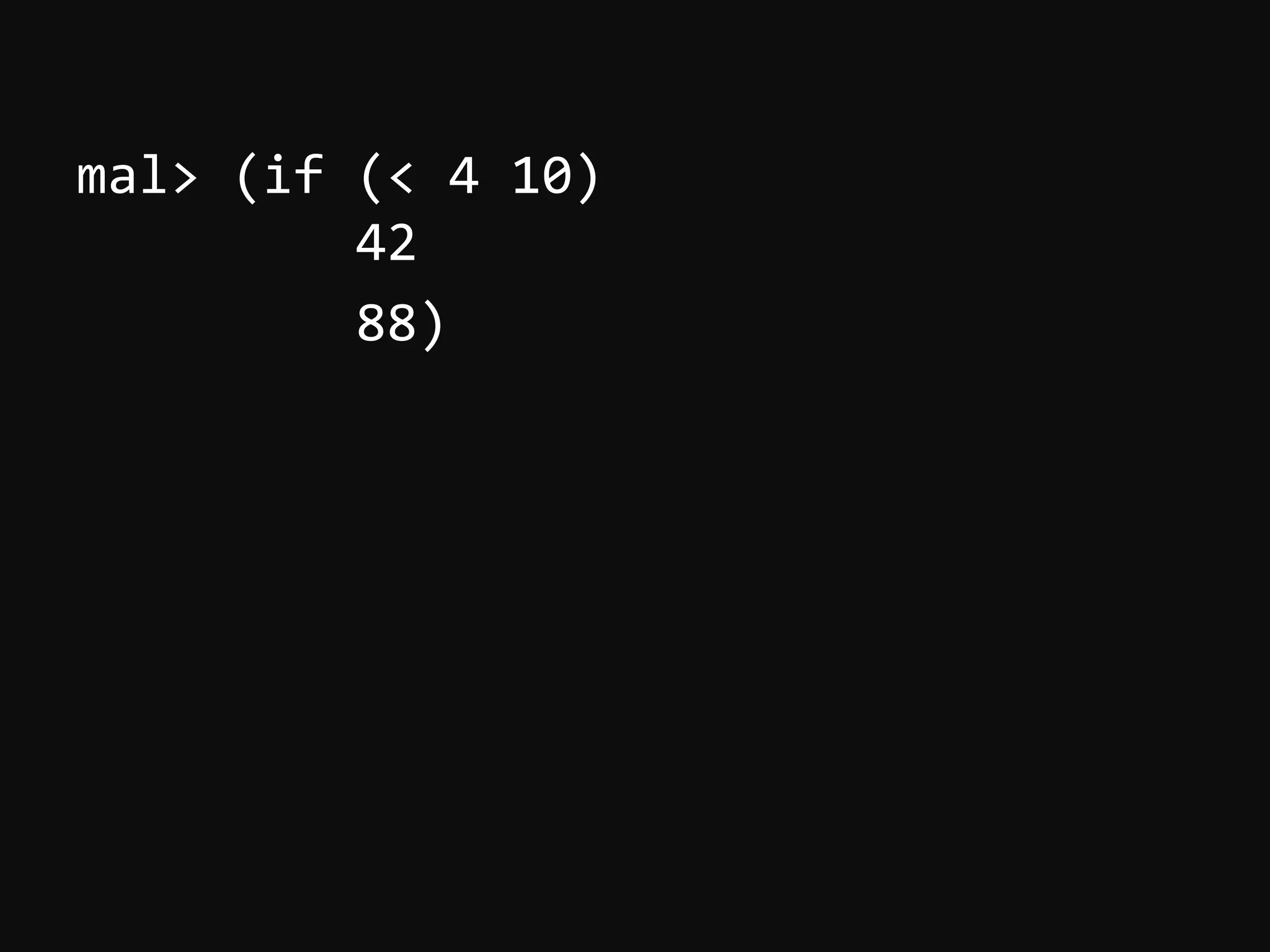
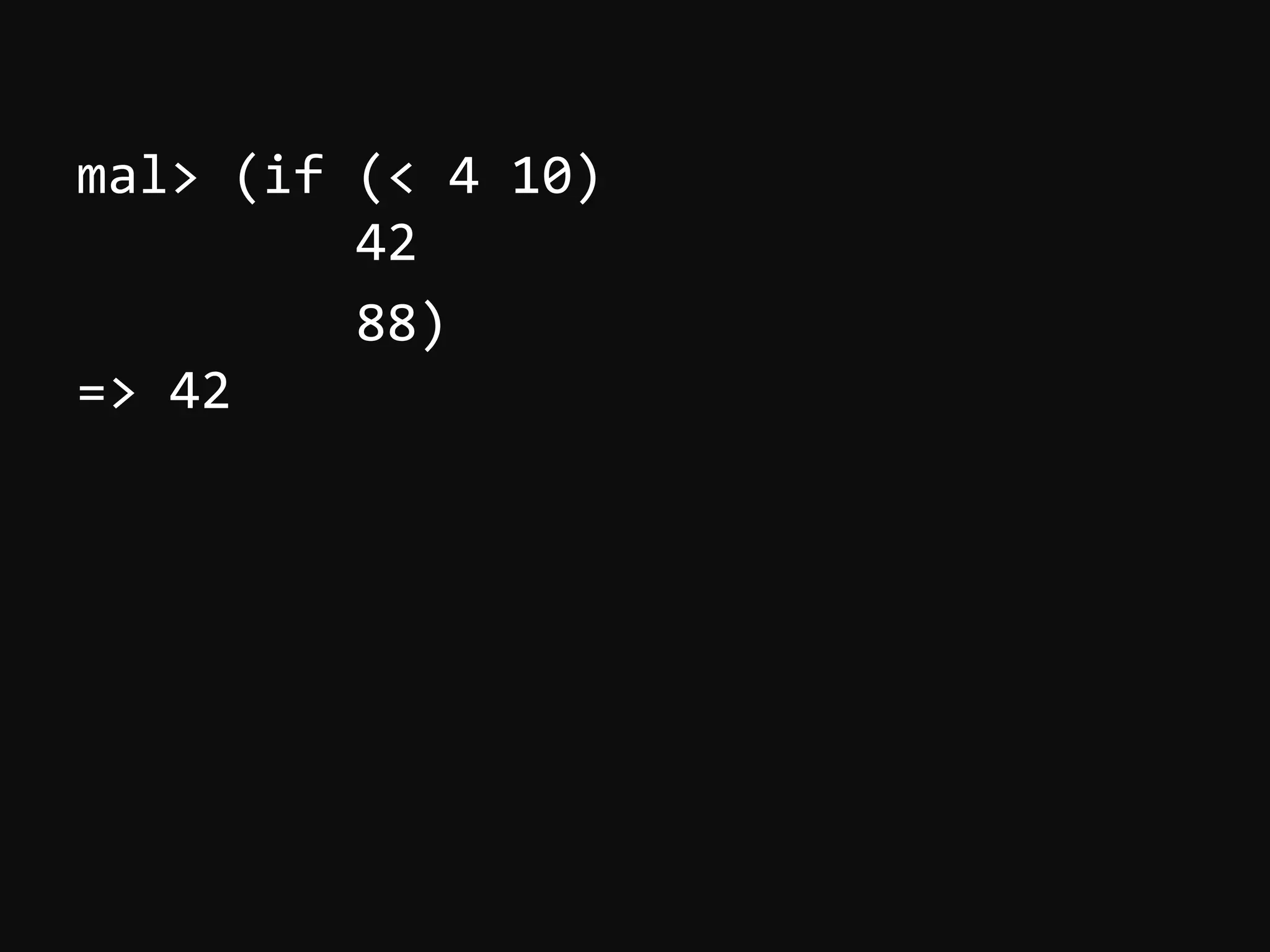
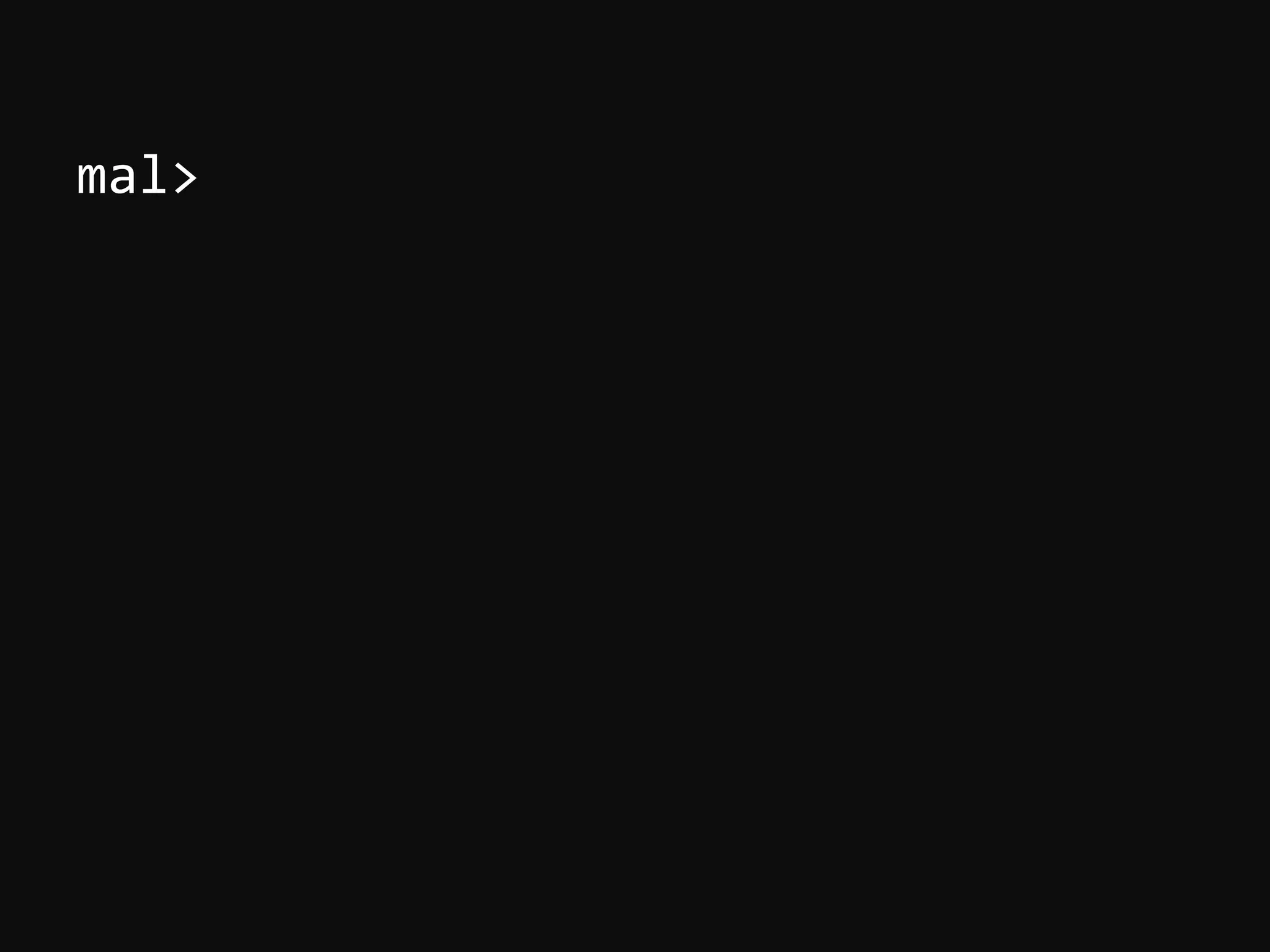
![mal> (fn* [x] (* x x)) => #<function> mal>](https://image.slidesharecdn.com/rubysgtalk-160126154418/75/Slaying-the-Dragon-Implementing-a-Programming-Language-in-Ruby-38-2048.jpg)
![mal> (fn* [x] (* x x)) => #<function> mal> PARAMS](https://image.slidesharecdn.com/rubysgtalk-160126154418/75/Slaying-the-Dragon-Implementing-a-Programming-Language-in-Ruby-39-2048.jpg)
![mal> (fn* [x] (* x x)) => #<function> mal> FUNCTION BODY](https://image.slidesharecdn.com/rubysgtalk-160126154418/75/Slaying-the-Dragon-Implementing-a-Programming-Language-in-Ruby-40-2048.jpg)
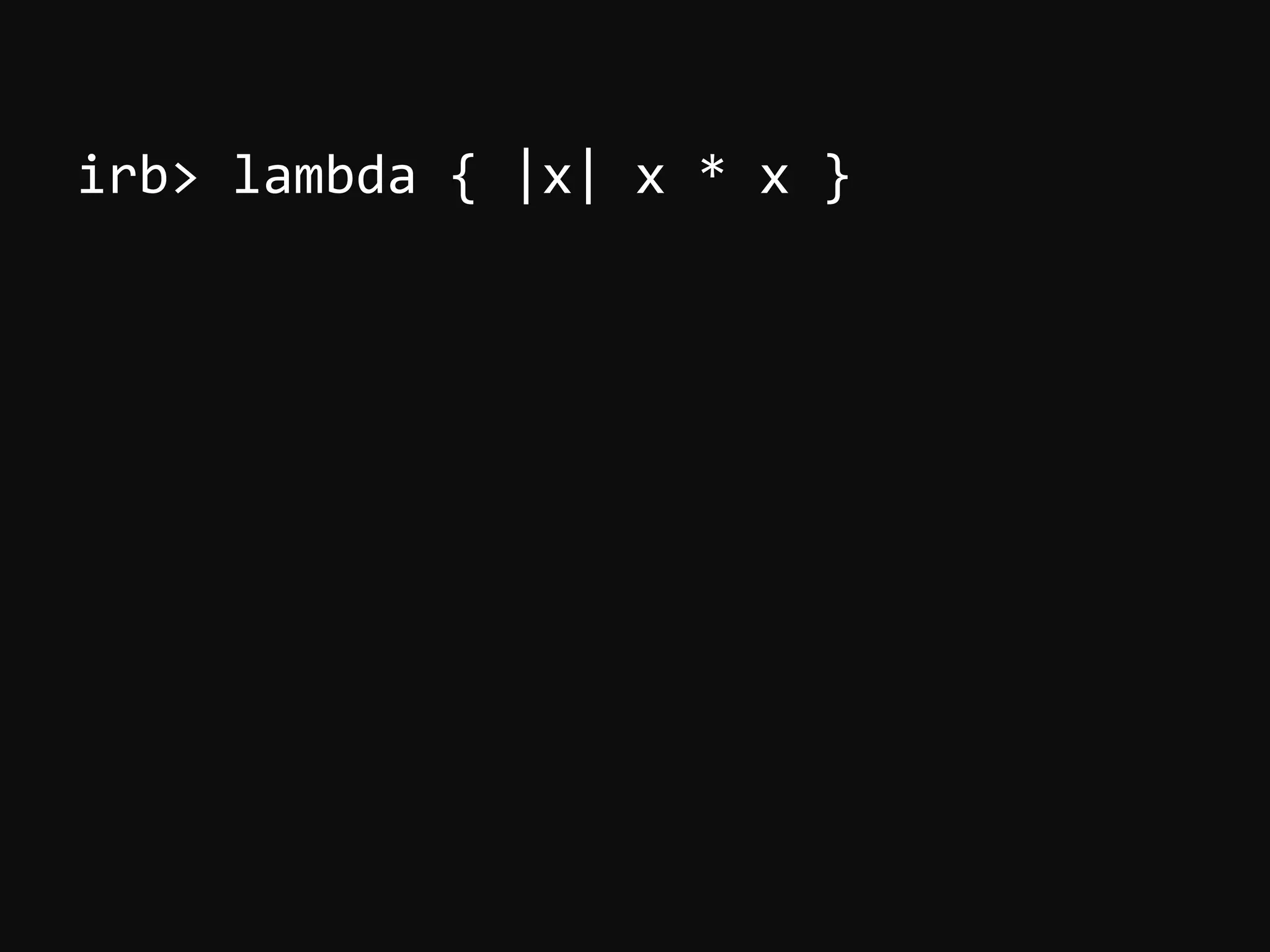
![mal> (fn* [x] (* x x)) => #<function> mal> ((fn* [x] (* x x)) 8)](https://image.slidesharecdn.com/rubysgtalk-160126154418/75/Slaying-the-Dragon-Implementing-a-Programming-Language-in-Ruby-42-2048.jpg)
![mal> (fn* [x] (* x x)) => #<function> mal> ((fn* [x] (* x x)) 8) => 64](https://image.slidesharecdn.com/rubysgtalk-160126154418/75/Slaying-the-Dragon-Implementing-a-Programming-Language-in-Ruby-43-2048.jpg)
![mal> (fn* [x] (* x x)) => #<function> mal> ((fn* [x] (* x x)) 8) => 64 FUNCTION THAT YOU WANT TO CALL](https://image.slidesharecdn.com/rubysgtalk-160126154418/75/Slaying-the-Dragon-Implementing-a-Programming-Language-in-Ruby-44-2048.jpg)
![mal> (fn* [x] (* x x)) => #<function> mal> ((fn* [x] (* x x)) 8) => 64 ARGUMENTS](https://image.slidesharecdn.com/rubysgtalk-160126154418/75/Slaying-the-Dragon-Implementing-a-Programming-Language-in-Ruby-45-2048.jpg)
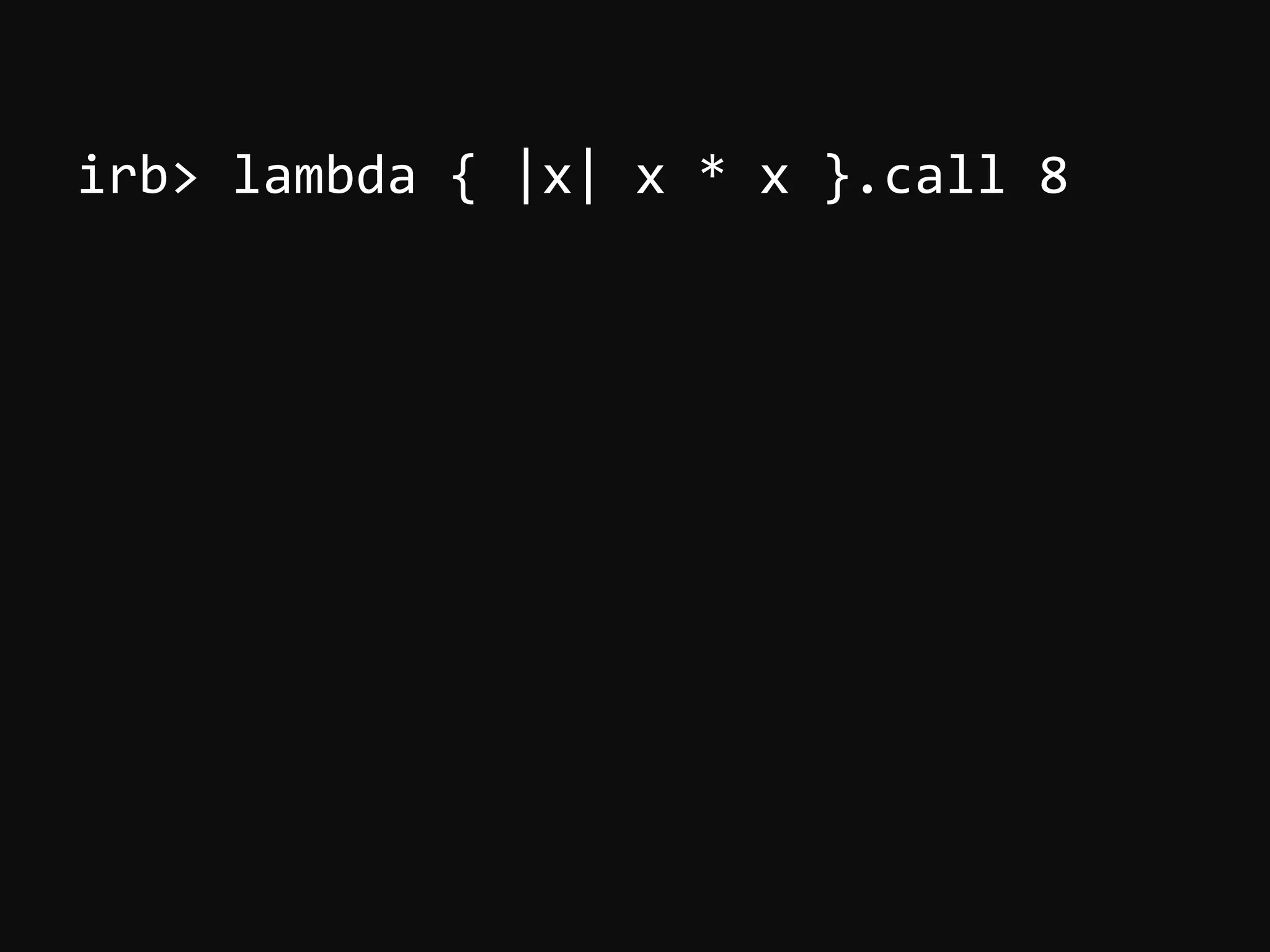
![mal> (fn* [x] (* x x)) => #<function> mal> ((fn* [x] (* x x)) 8)) => 64 mal> (def sq (fn* [x] (* x x))) => #<function>](https://image.slidesharecdn.com/rubysgtalk-160126154418/75/Slaying-the-Dragon-Implementing-a-Programming-Language-in-Ruby-47-2048.jpg)
![mal> (fn* [x] (* x x)) => #<function> mal> ((fn* [x] (* x x)) 8)) => 64 mal> (def sq (fn* [x] (* x x))) => #<function> mal> (sq 8) => 64](https://image.slidesharecdn.com/rubysgtalk-160126154418/75/Slaying-the-Dragon-Implementing-a-Programming-Language-in-Ruby-48-2048.jpg)







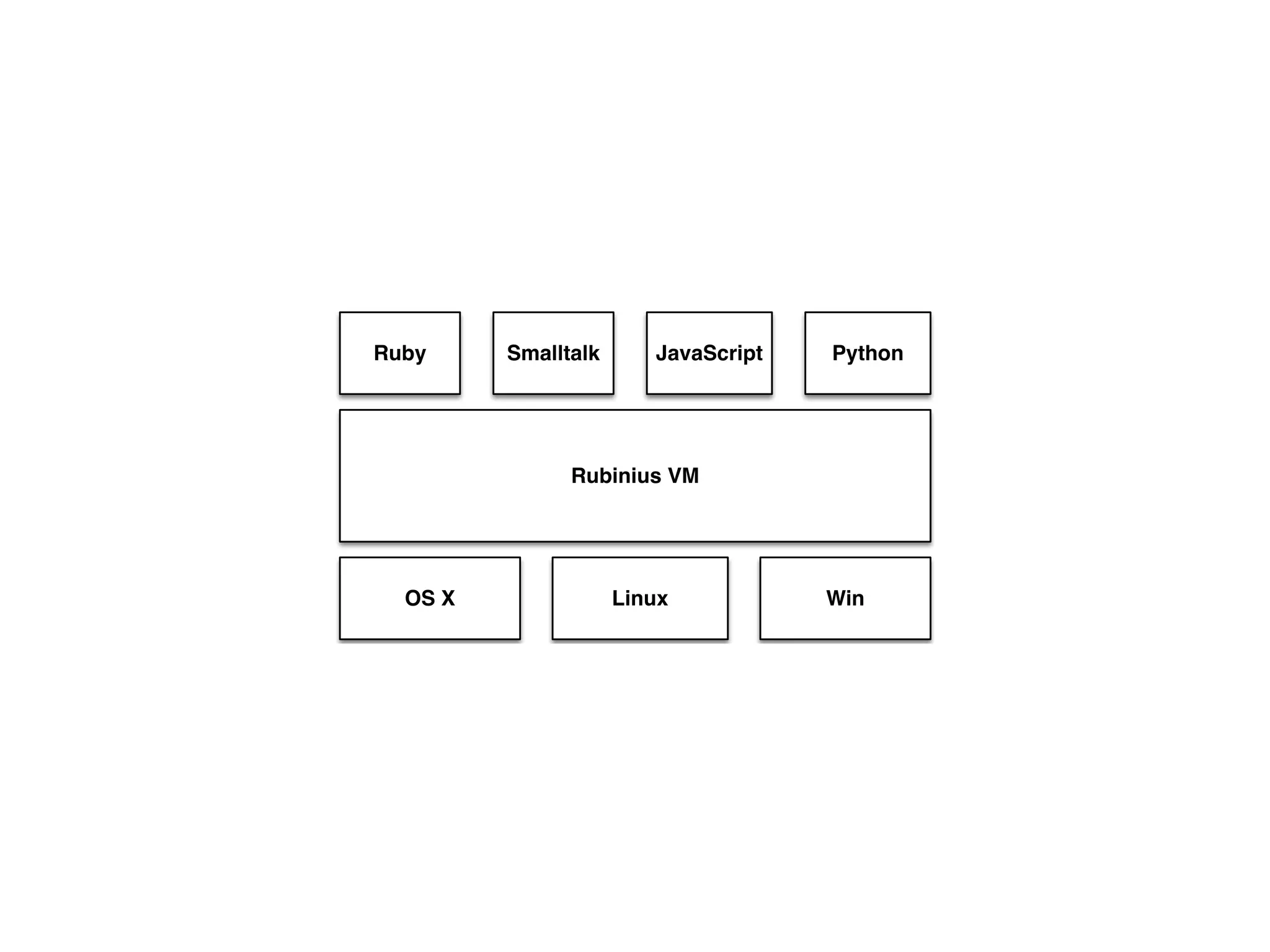


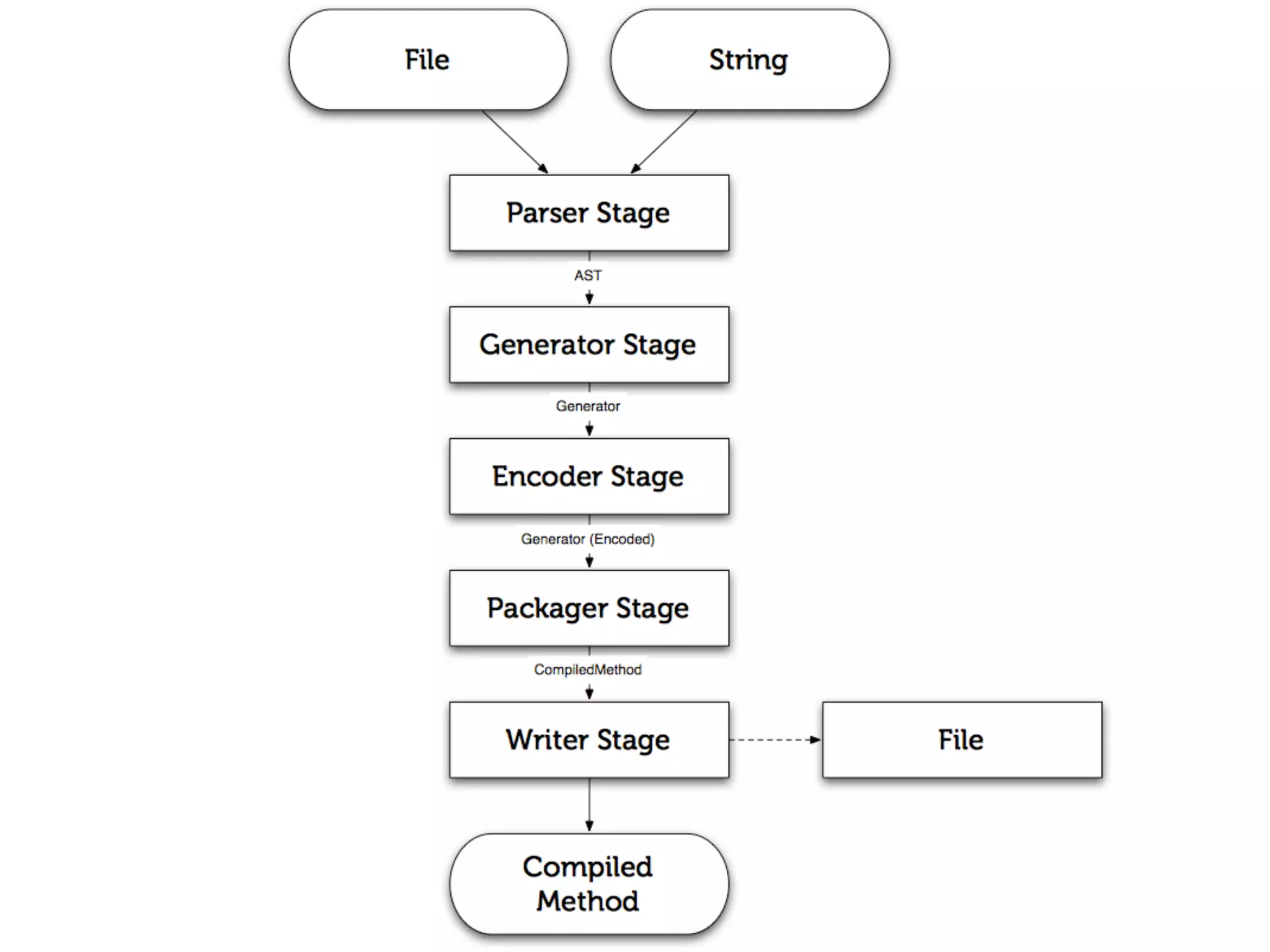
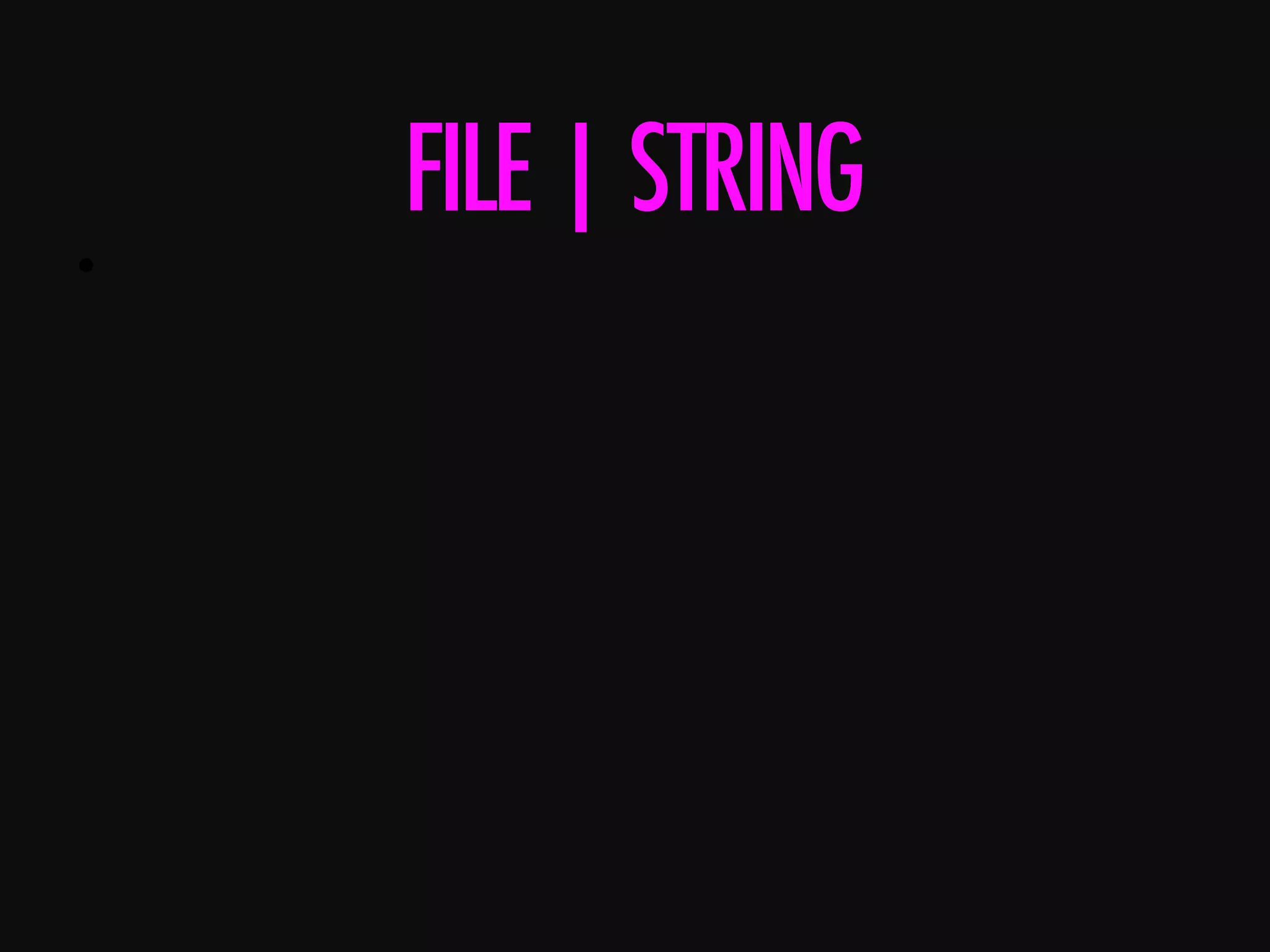
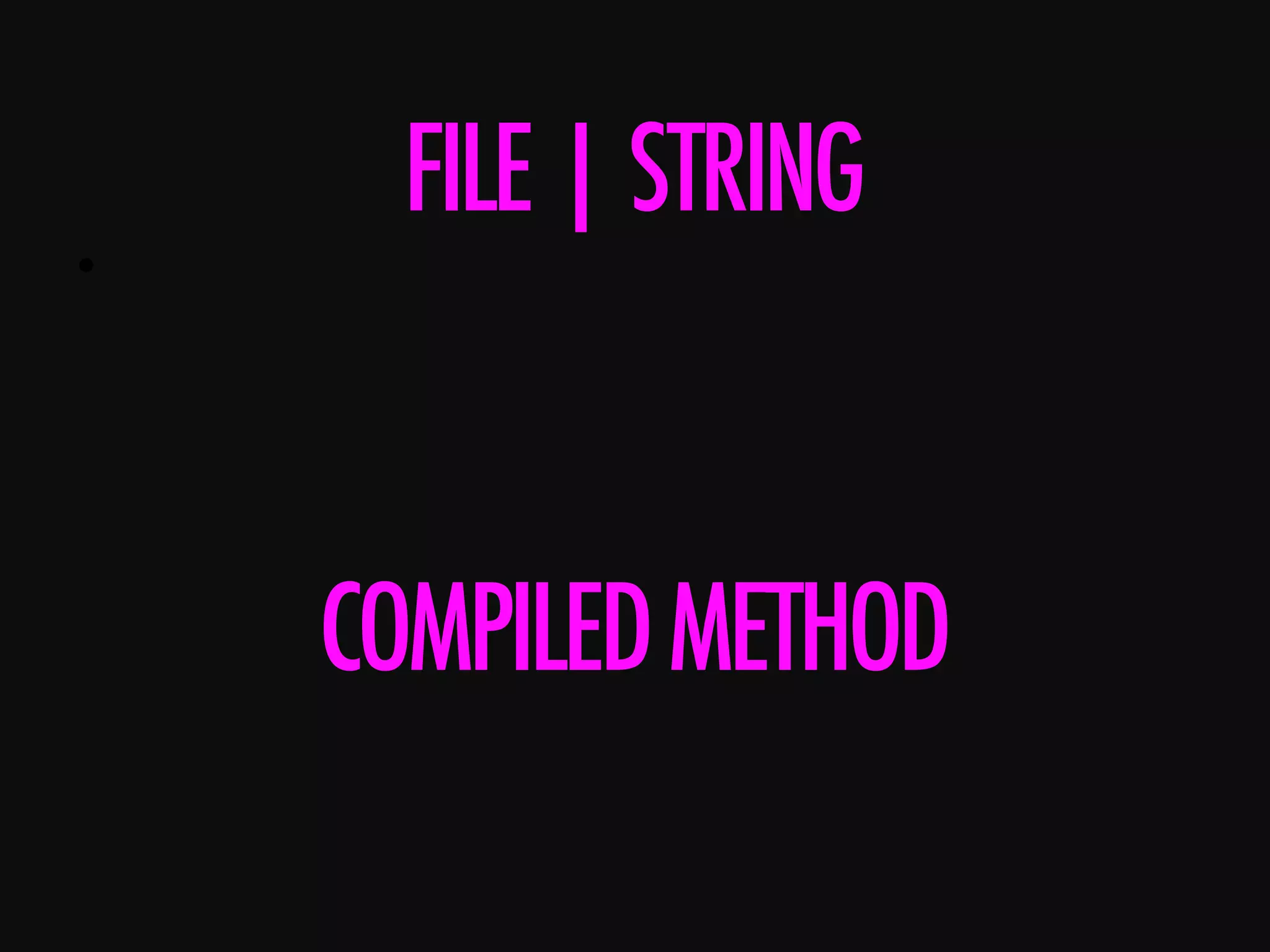
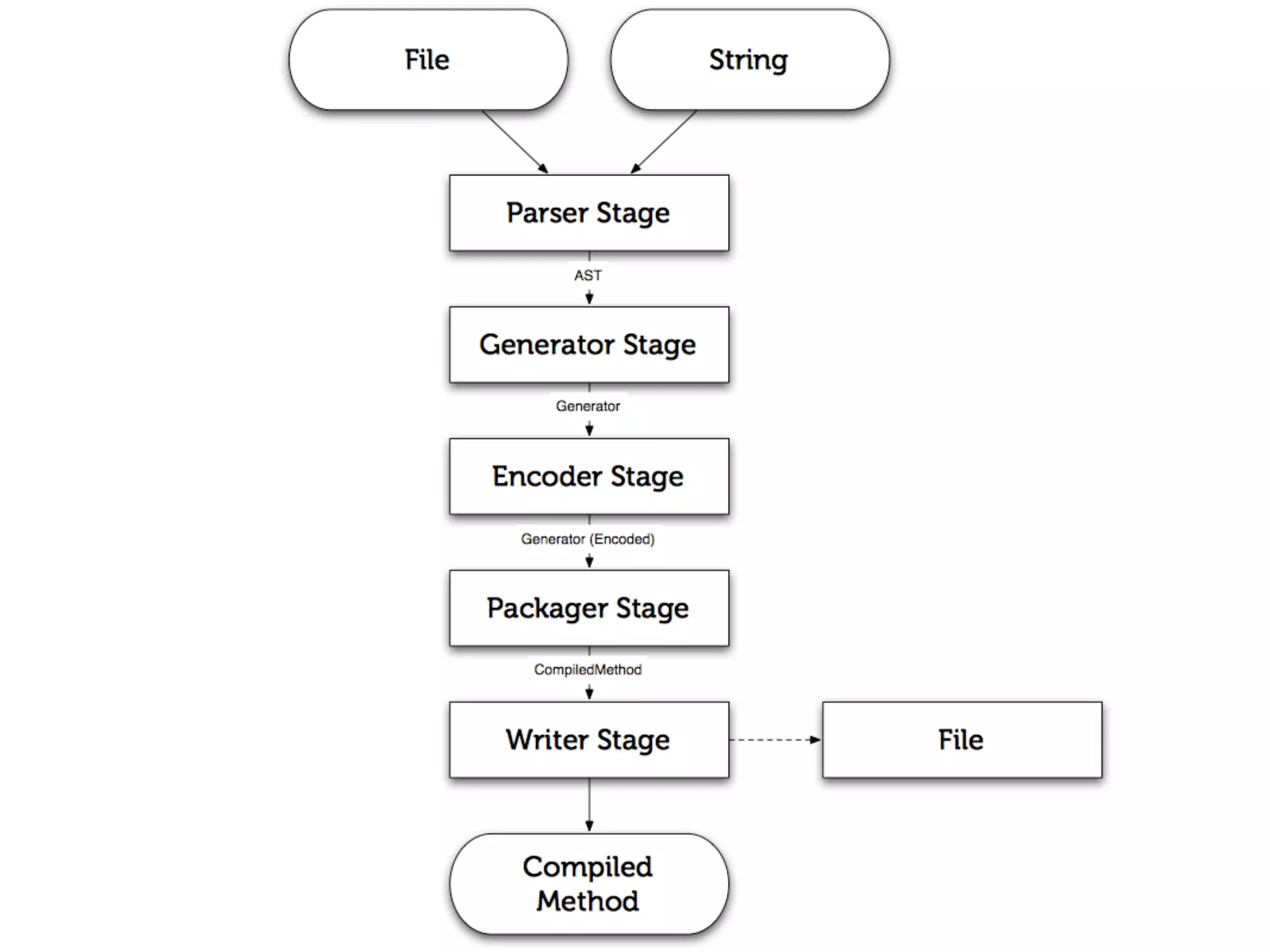


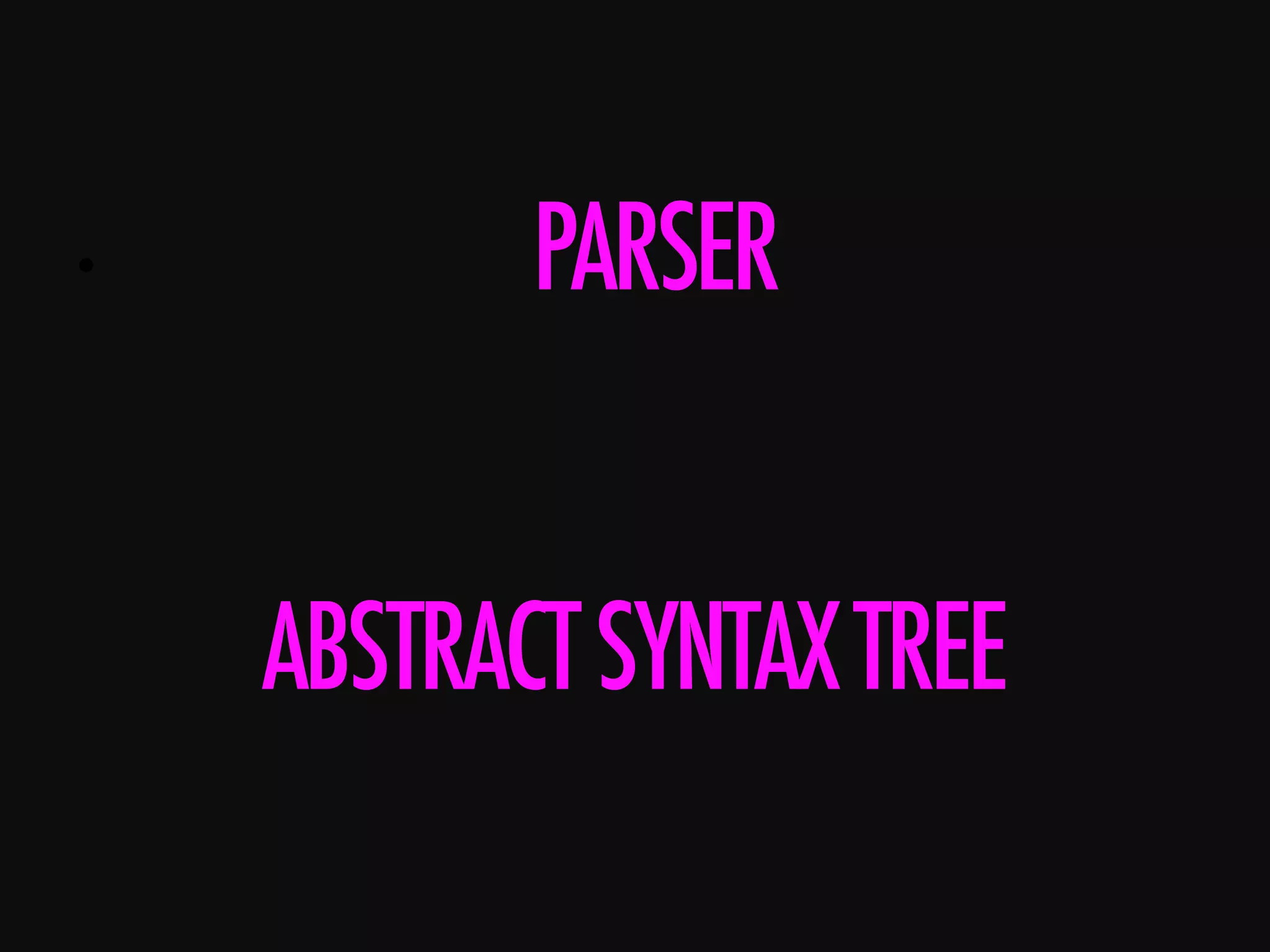



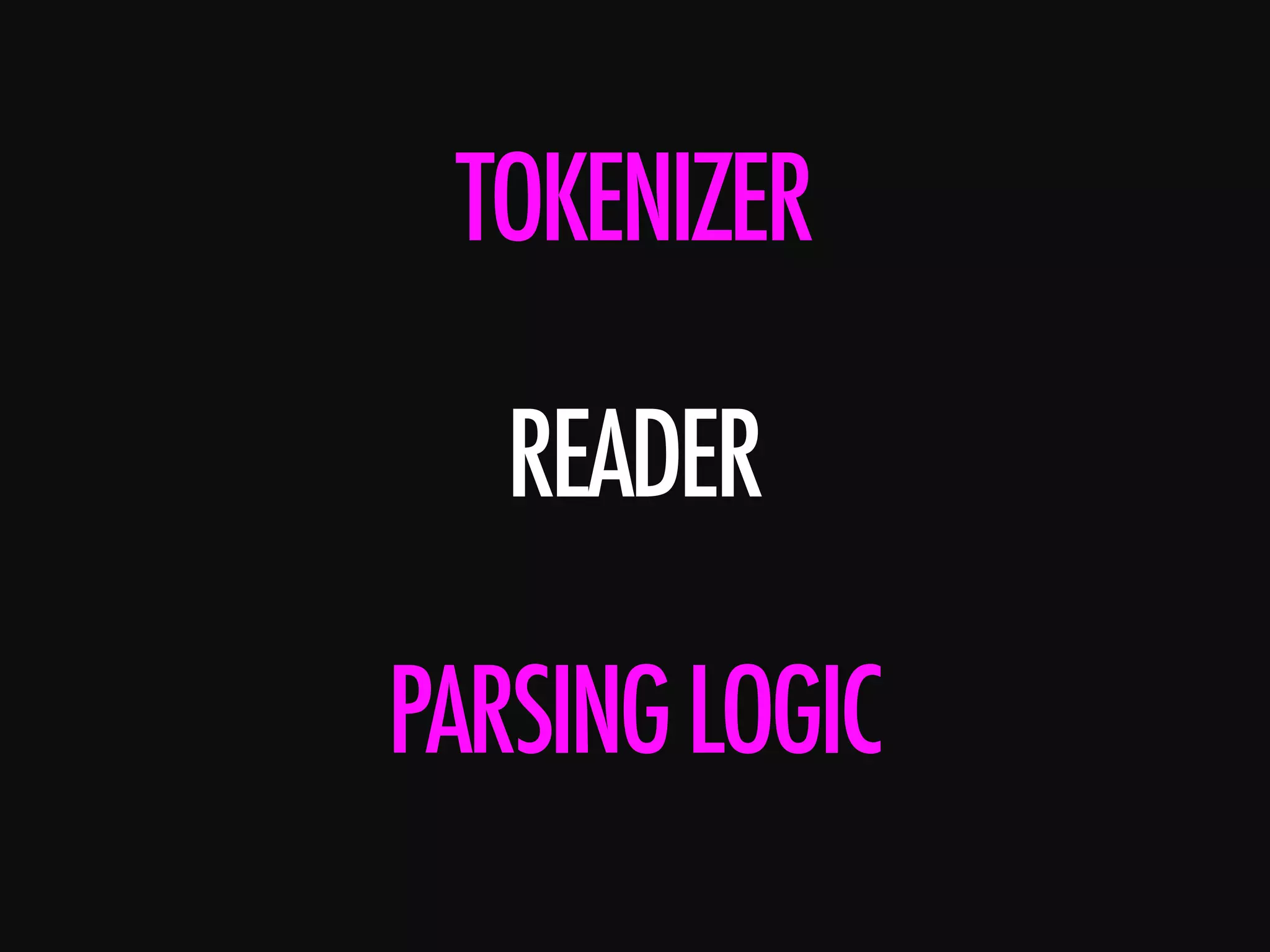

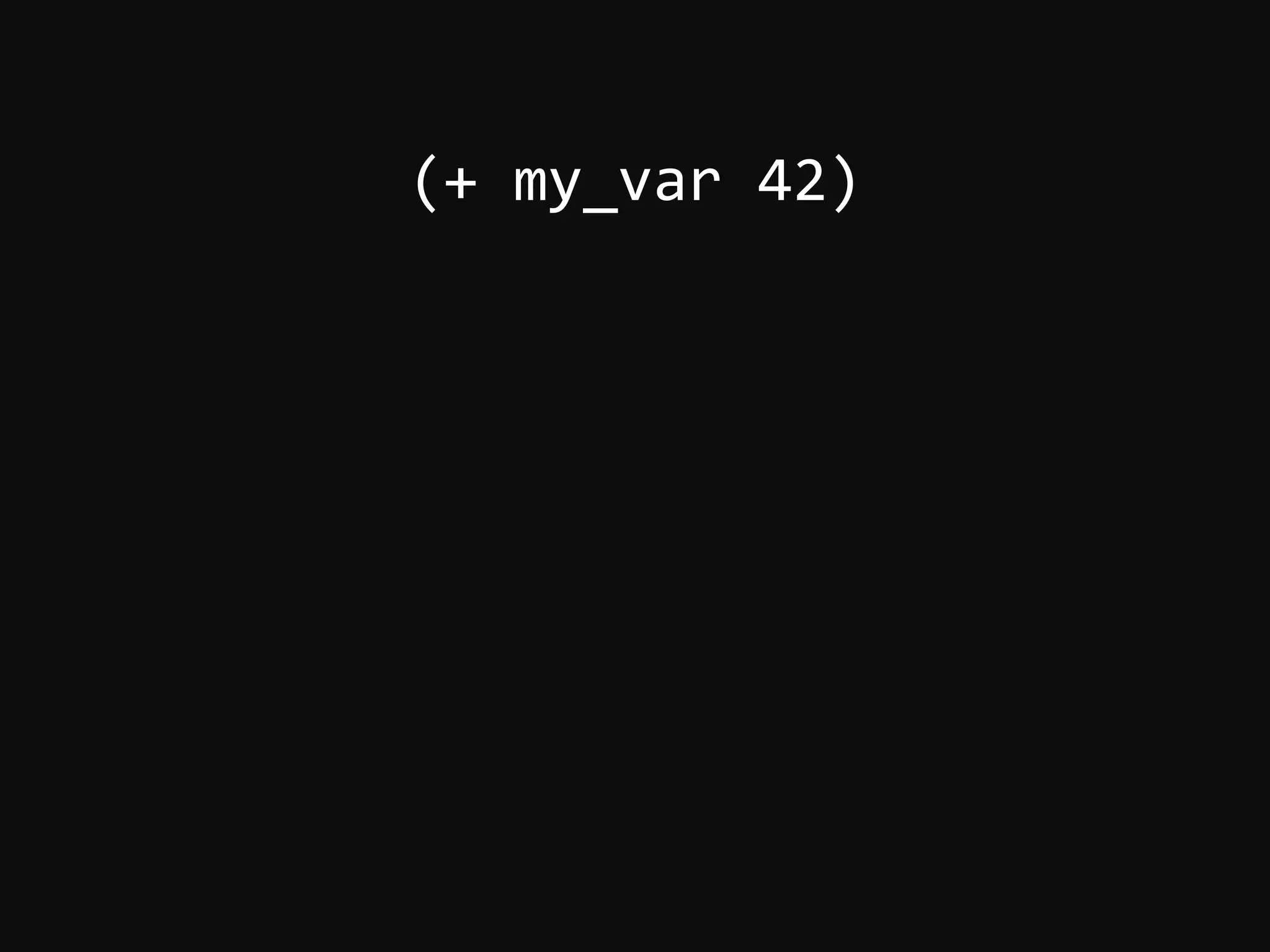
![(+ my_var 42) ['(', '+', 'my_var', '42', ')']](https://image.slidesharecdn.com/rubysgtalk-160126154418/75/Slaying-the-Dragon-Implementing-a-Programming-Language-in-Ruby-72-2048.jpg)
![/[s,]*(~@|[[]{}()'`~^@]|"(?:.|[^"])*"|;.*|[^s[]{}('"`,;)]*)/](https://image.slidesharecdn.com/rubysgtalk-160126154418/75/Slaying-the-Dragon-Implementing-a-Programming-Language-in-Ruby-73-2048.jpg)

![[1] pry(main)>](https://image.slidesharecdn.com/rubysgtalk-160126154418/75/Slaying-the-Dragon-Implementing-a-Programming-Language-in-Ruby-75-2048.jpg)
![[1] pry(main)> require 'ripper' => true [2] pry(main)>](https://image.slidesharecdn.com/rubysgtalk-160126154418/75/Slaying-the-Dragon-Implementing-a-Programming-Language-in-Ruby-76-2048.jpg)
![[1] pry(main)> require 'ripper' => true [2] pry(main)> Ripper.lex 'foo = 123'](https://image.slidesharecdn.com/rubysgtalk-160126154418/75/Slaying-the-Dragon-Implementing-a-Programming-Language-in-Ruby-77-2048.jpg)
![[1] pry(main)> require 'ripper' => true [2] pry(main)> Ripper.lex 'foo = 123' => [[[1, 0], :on_ident, "foo"], [[1, 3], :on_sp, " "], [[1, 4], :on_op, "="], [[1, 5], :on_sp, " "], [[1, 6], :on_int, "123"]]](https://image.slidesharecdn.com/rubysgtalk-160126154418/75/Slaying-the-Dragon-Implementing-a-Programming-Language-in-Ruby-78-2048.jpg)
![(+ my_var 42) ['(', '+', 'my_var', '42', ')']](https://image.slidesharecdn.com/rubysgtalk-160126154418/75/Slaying-the-Dragon-Implementing-a-Programming-Language-in-Ruby-79-2048.jpg)

![['(', '+', 'my_var', '42', ')']](https://image.slidesharecdn.com/rubysgtalk-160126154418/75/Slaying-the-Dragon-Implementing-a-Programming-Language-in-Ruby-81-2048.jpg)
![['(', '+', 'my_var', '42', ')'] [:list, [:symbol, '+'], [:symbol, 'my_var'], [:integer, 42]]](https://image.slidesharecdn.com/rubysgtalk-160126154418/75/Slaying-the-Dragon-Implementing-a-Programming-Language-in-Ruby-82-2048.jpg)

![<form> ::= <list> | <atom> <list> ::= '(' <form>* ')' | '[' <form>* ']' <atom> ::= a-‐z+ | 0-‐9+ | true | false](https://image.slidesharecdn.com/rubysgtalk-160126154418/75/Slaying-the-Dragon-Implementing-a-Programming-Language-in-Ruby-84-2048.jpg)
![<form> ::= <list> | <atom> <list> ::= '(' <form>* ')' | '[' <form>* ']' <atom> ::= a-‐z+ | 0-‐9+ | true | false](https://image.slidesharecdn.com/rubysgtalk-160126154418/75/Slaying-the-Dragon-Implementing-a-Programming-Language-in-Ruby-85-2048.jpg)
![<form> ::= <list> | <atom> <list> ::= '(' <form>* ')' | '[' <form>* ']' <atom> ::= a-‐z+ | 0-‐9+ | true | false](https://image.slidesharecdn.com/rubysgtalk-160126154418/75/Slaying-the-Dragon-Implementing-a-Programming-Language-in-Ruby-86-2048.jpg)
![<form> ::= <list> | <atom> <list> ::= '(' <form>* ')' | '[' <form>* ']' <atom> ::= a-‐z+ | 0-‐9+ | true | false](https://image.slidesharecdn.com/rubysgtalk-160126154418/75/Slaying-the-Dragon-Implementing-a-Programming-Language-in-Ruby-87-2048.jpg)
![<form> ::= <list> | <atom> <list> ::= '(' <form>* ')' | '[' <form>* ']' <atom> ::= a-‐z+ | 0-‐9+ | true | false](https://image.slidesharecdn.com/rubysgtalk-160126154418/75/Slaying-the-Dragon-Implementing-a-Programming-Language-in-Ruby-88-2048.jpg)
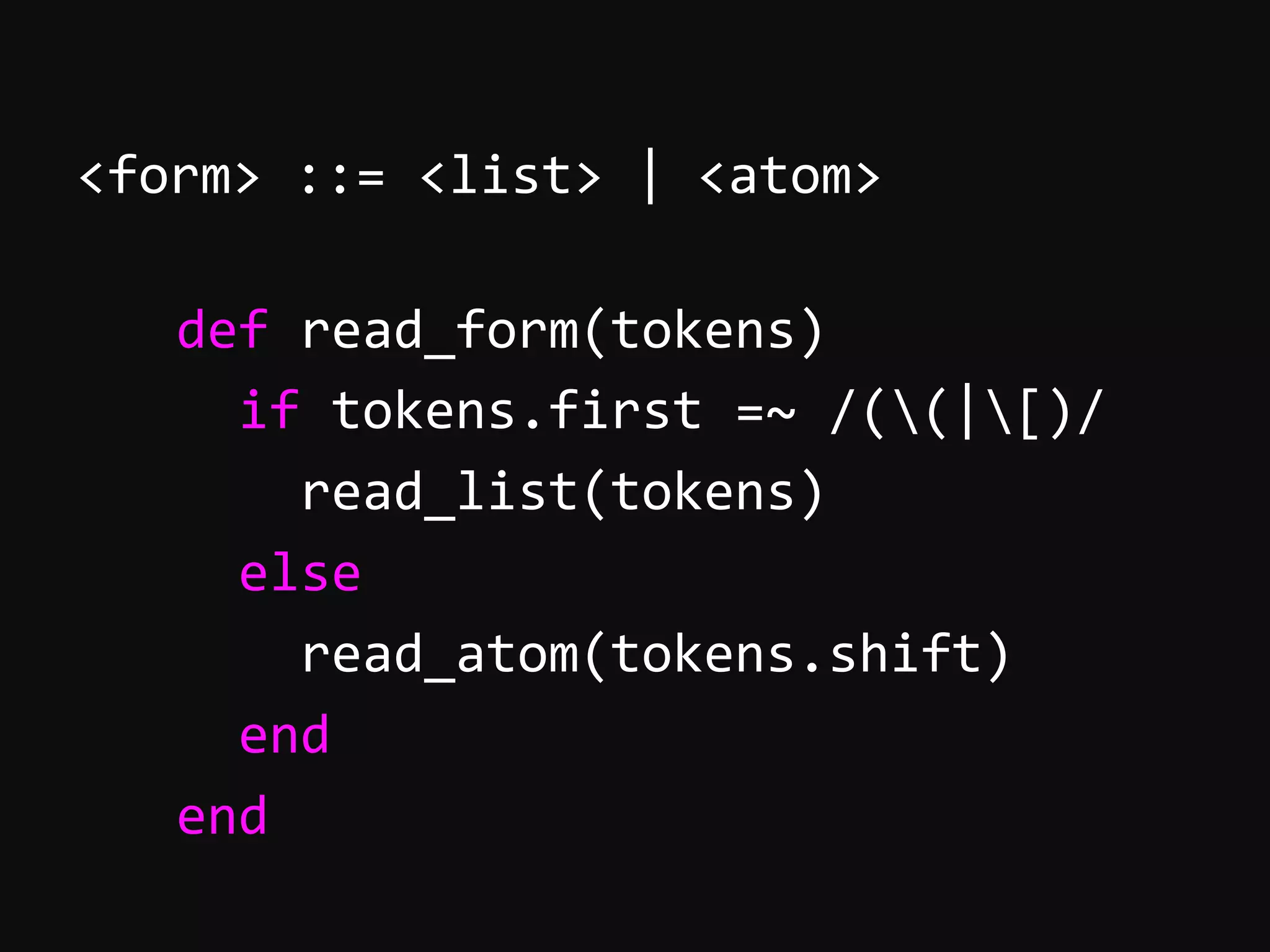
![<form> ::= <list> | <atom> <list> ::= '(' <form>* ')' | '[' <form>* ']' <atom> ::= a-‐z+ | 0-‐9+ | true | false](https://image.slidesharecdn.com/rubysgtalk-160126154418/75/Slaying-the-Dragon-Implementing-a-Programming-Language-in-Ruby-90-2048.jpg)
![<list> ::= '(' <form>* ')' | '[' <form>* ']' def read_list(tokens) list = [:list] tokens.shift # pop our opening paren while tokens.first !~ /()|])/ list << read_form(tokens) end tokens.shift # pop our closing paren list end](https://image.slidesharecdn.com/rubysgtalk-160126154418/75/Slaying-the-Dragon-Implementing-a-Programming-Language-in-Ruby-91-2048.jpg)
![<form> ::= <list> | <atom> <list> ::= '(' <form>* ')' | '[' <form>* ']' <atom> ::= a-‐z+ | 0-‐9+ | true | false](https://image.slidesharecdn.com/rubysgtalk-160126154418/75/Slaying-the-Dragon-Implementing-a-Programming-Language-in-Ruby-92-2048.jpg)
![<atom> ::= a-‐z+ | 0-‐9+ | true | false def read_atom(token) case token when /^-‐?d+$/ [:integer, token.to_i] when 'true' [:boolean, :true] when 'false' [:boolean, :false] when /^D+$/ [:symbol, token] else raise 'Reader error: Unknown token' end end](https://image.slidesharecdn.com/rubysgtalk-160126154418/75/Slaying-the-Dragon-Implementing-a-Programming-Language-in-Ruby-93-2048.jpg)
![['(', '+', 'my_var', '42', ')'] (+ my_var 42) [:list, [:symbol, '+'], [:symbol, 'my_var'], [:integer, 42]]](https://image.slidesharecdn.com/rubysgtalk-160126154418/75/Slaying-the-Dragon-Implementing-a-Programming-Language-in-Ruby-94-2048.jpg)
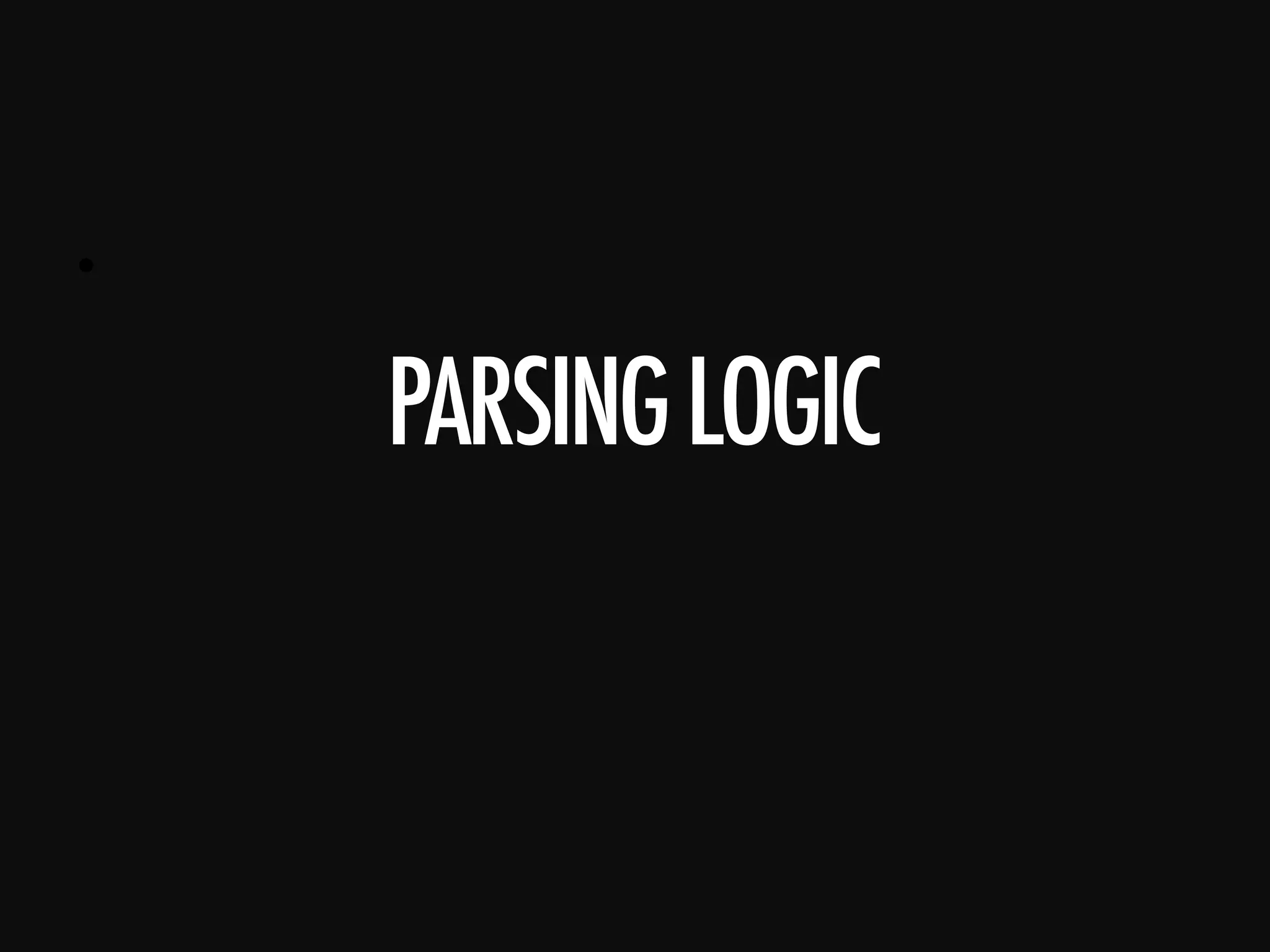
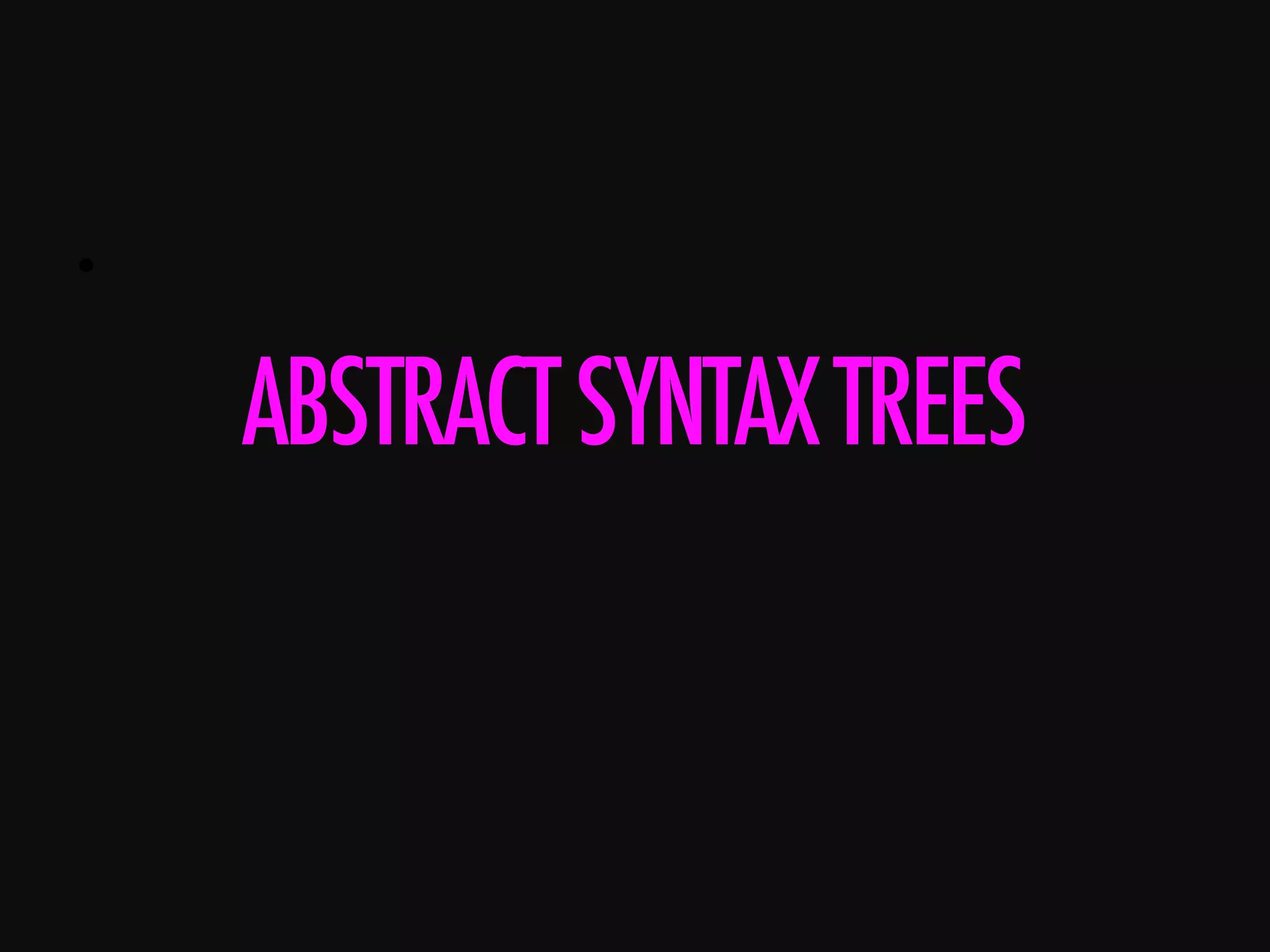
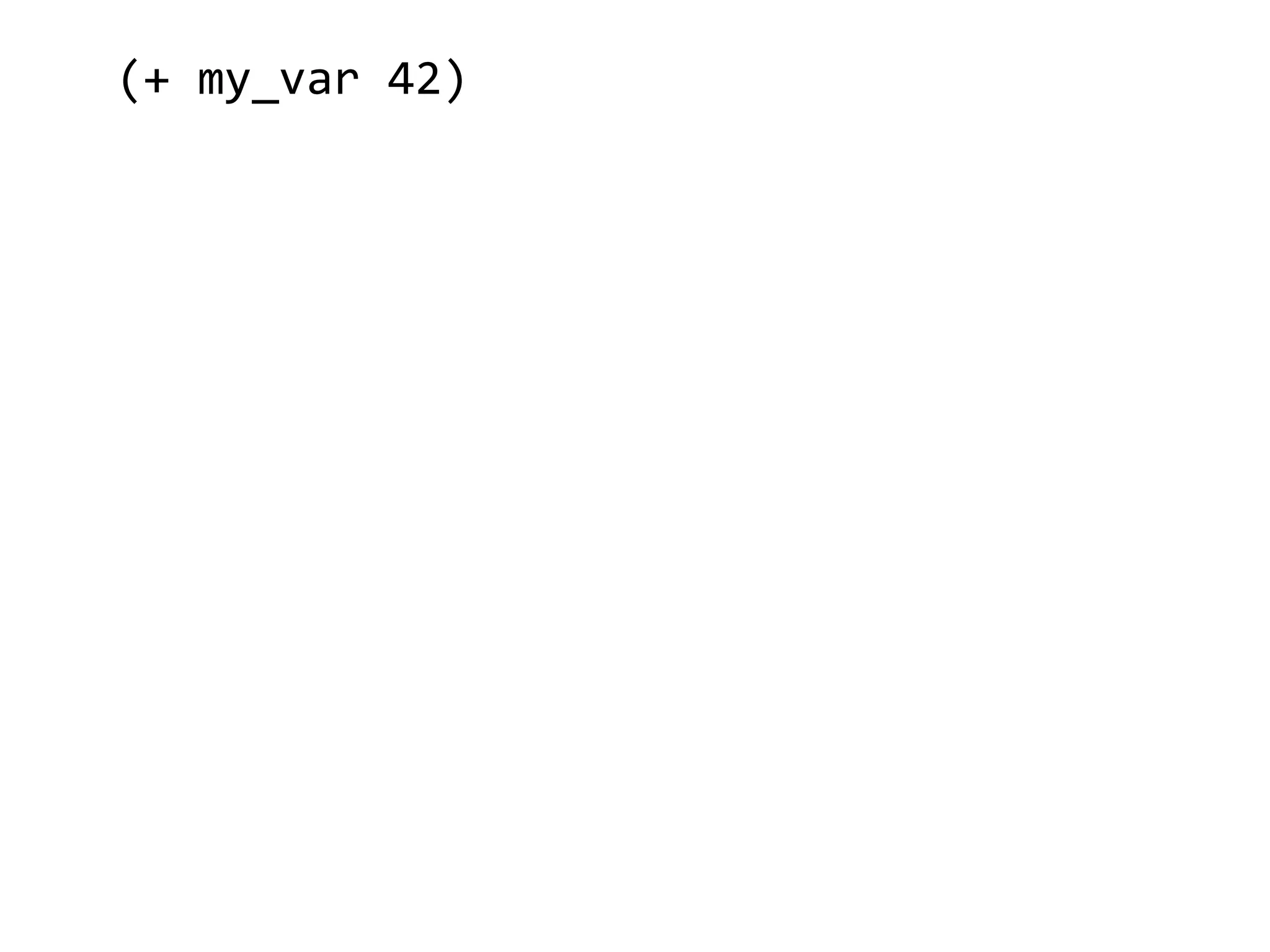
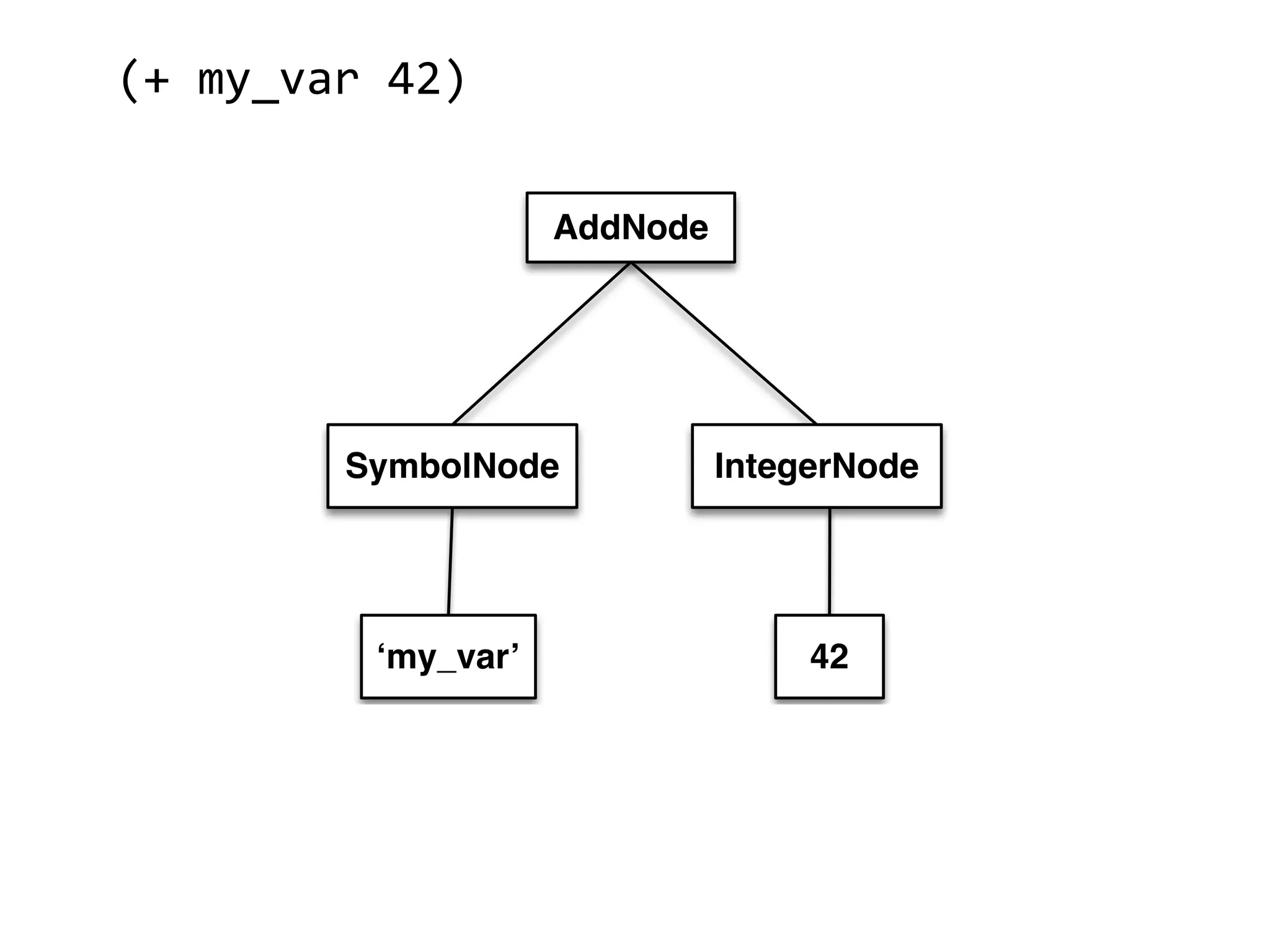
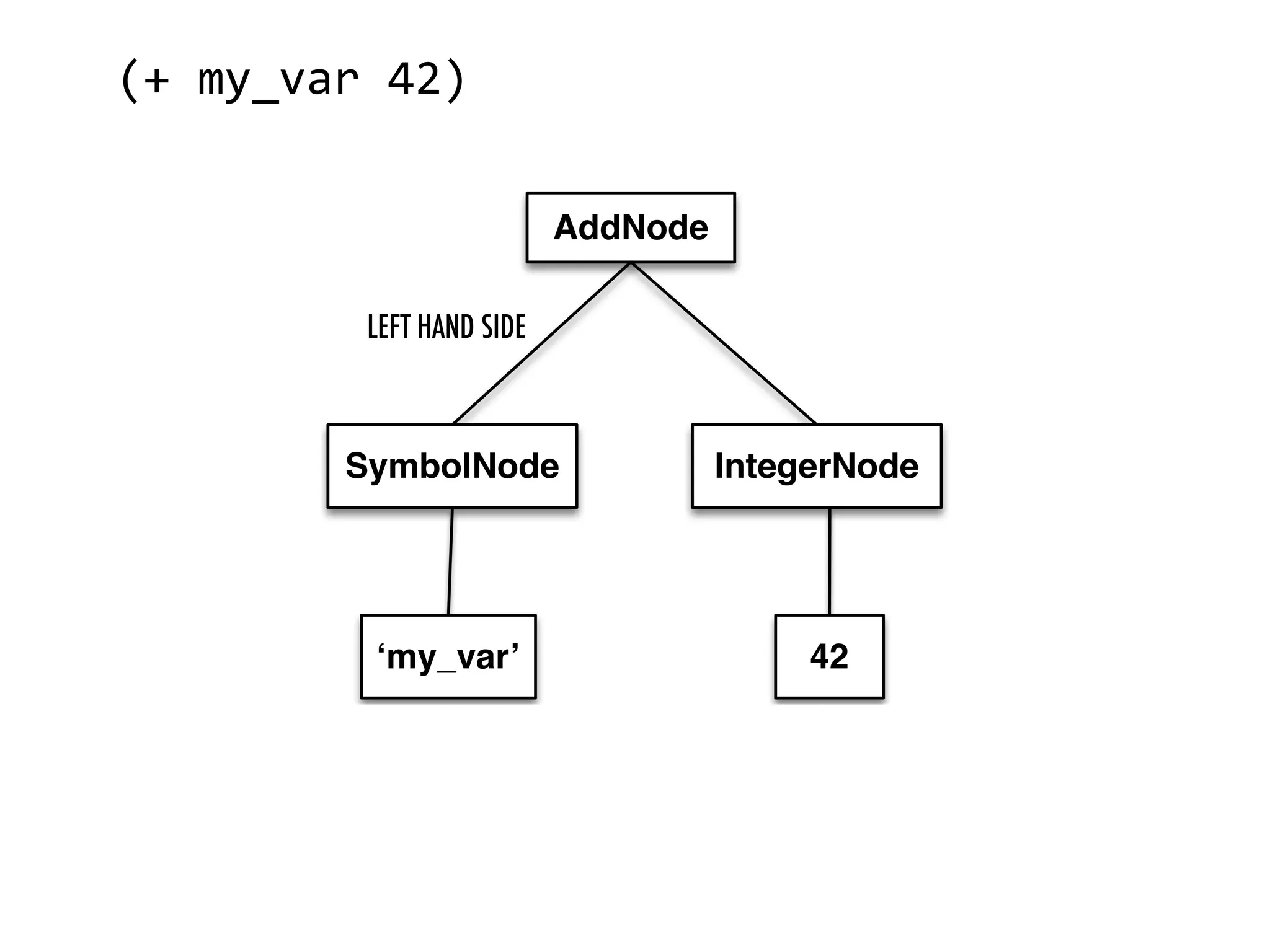
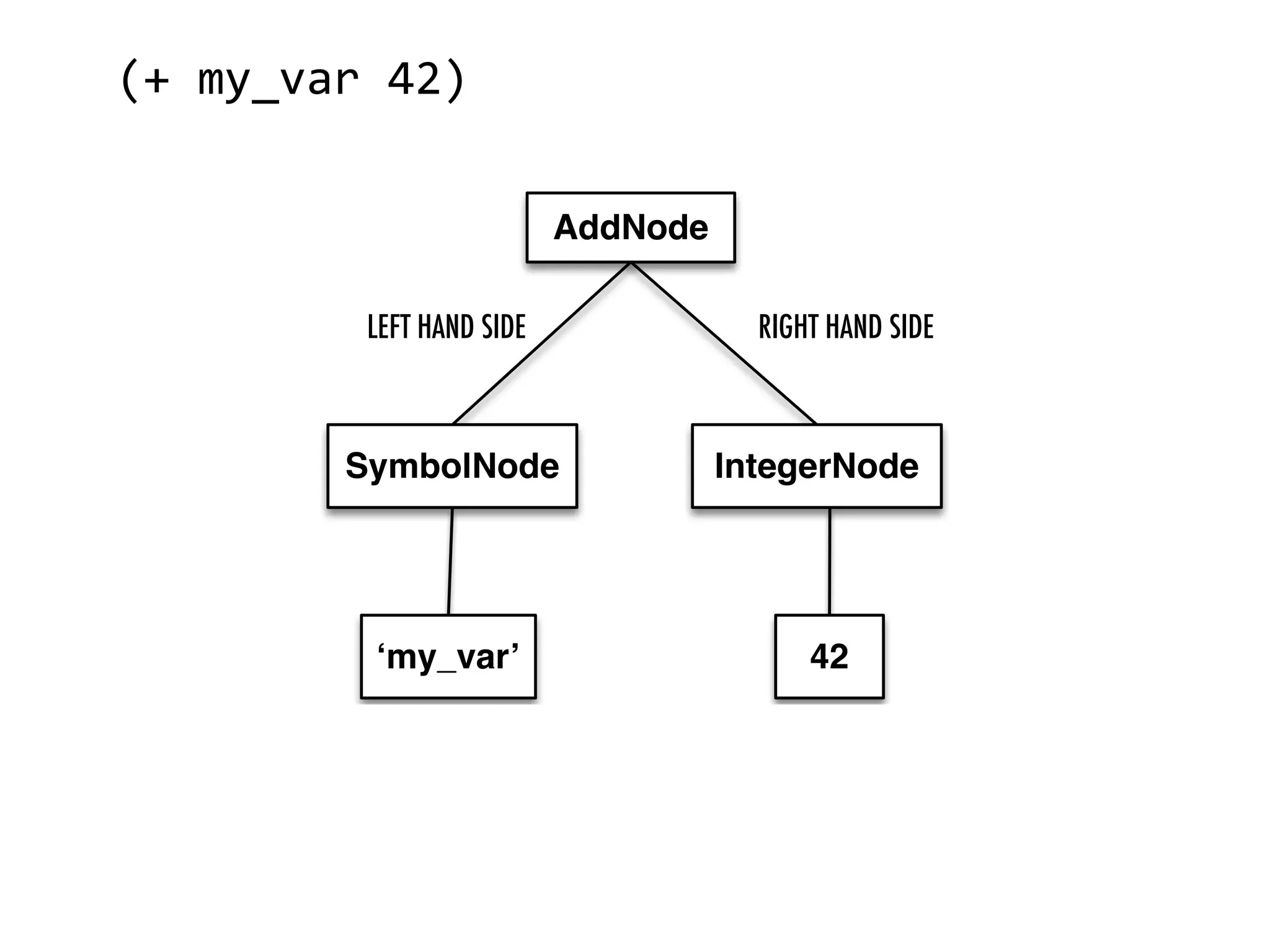
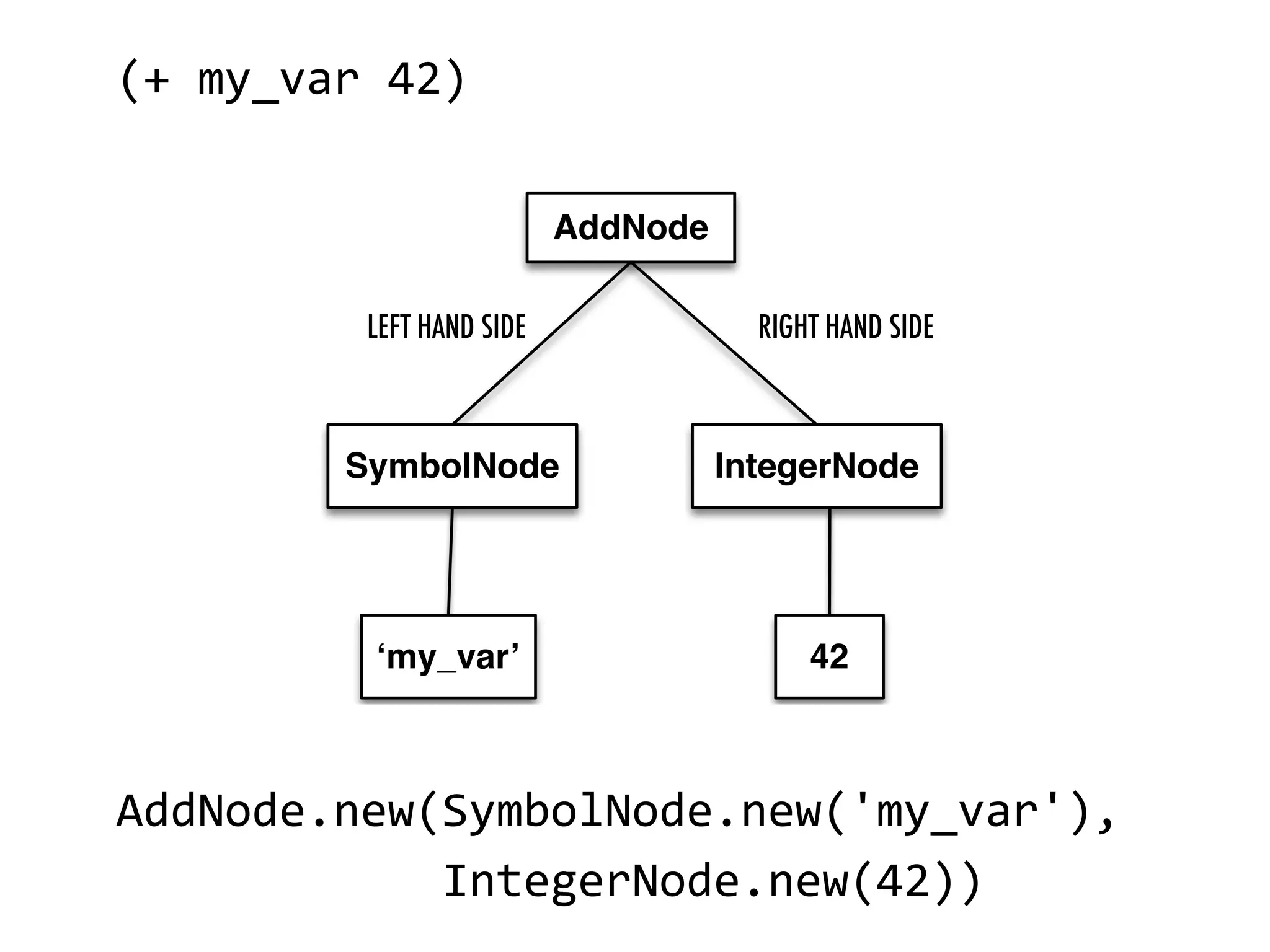
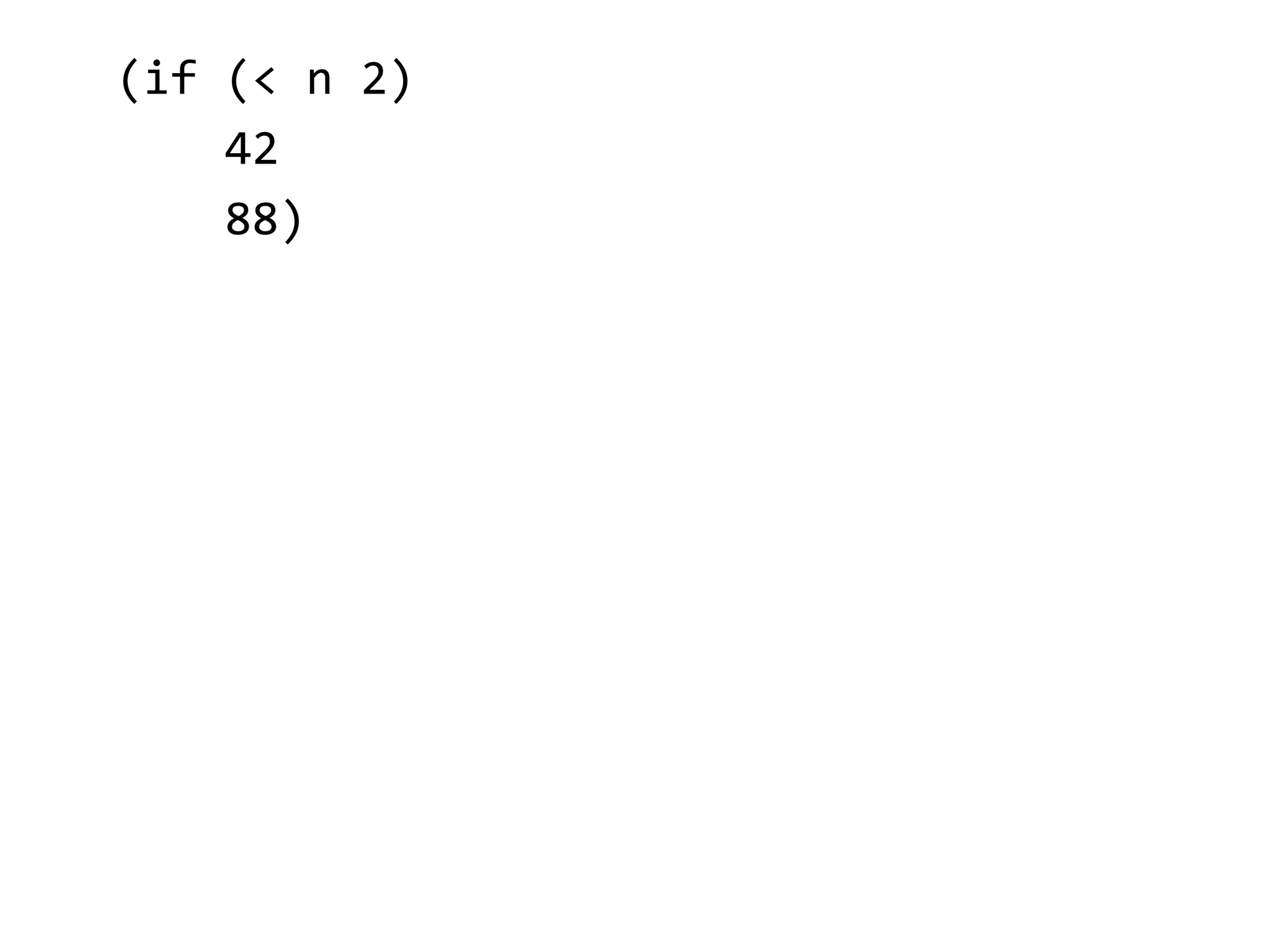
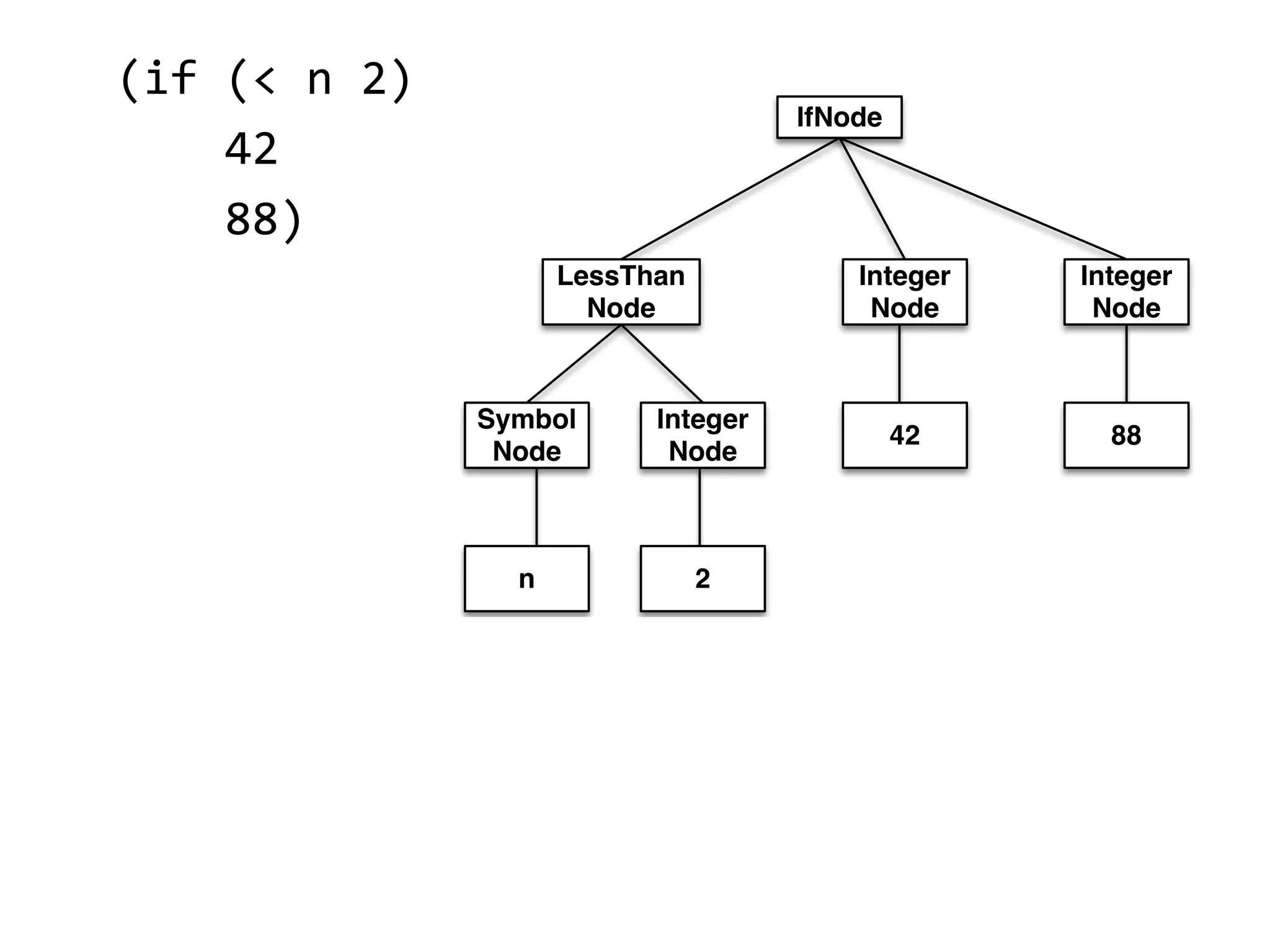
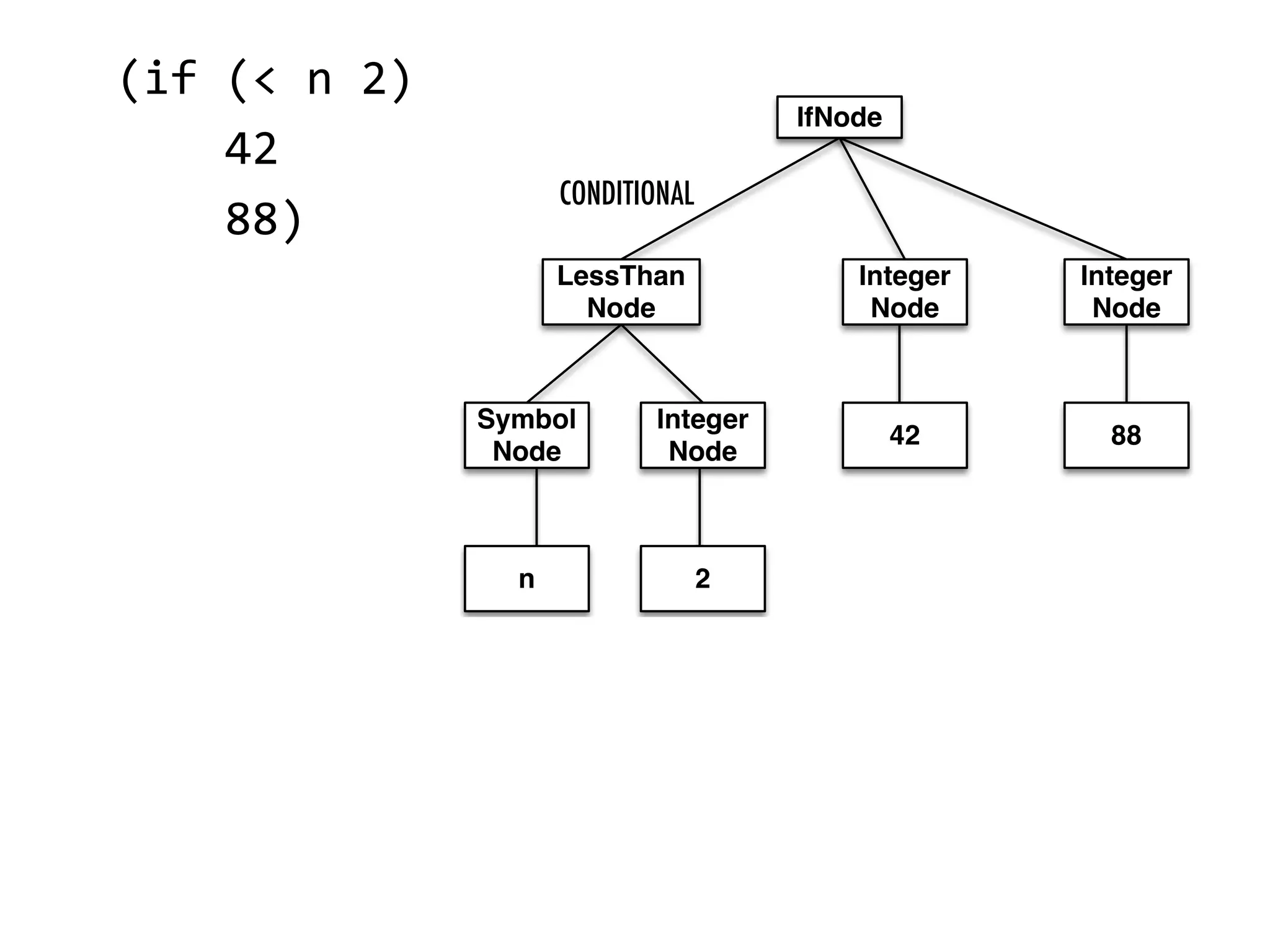
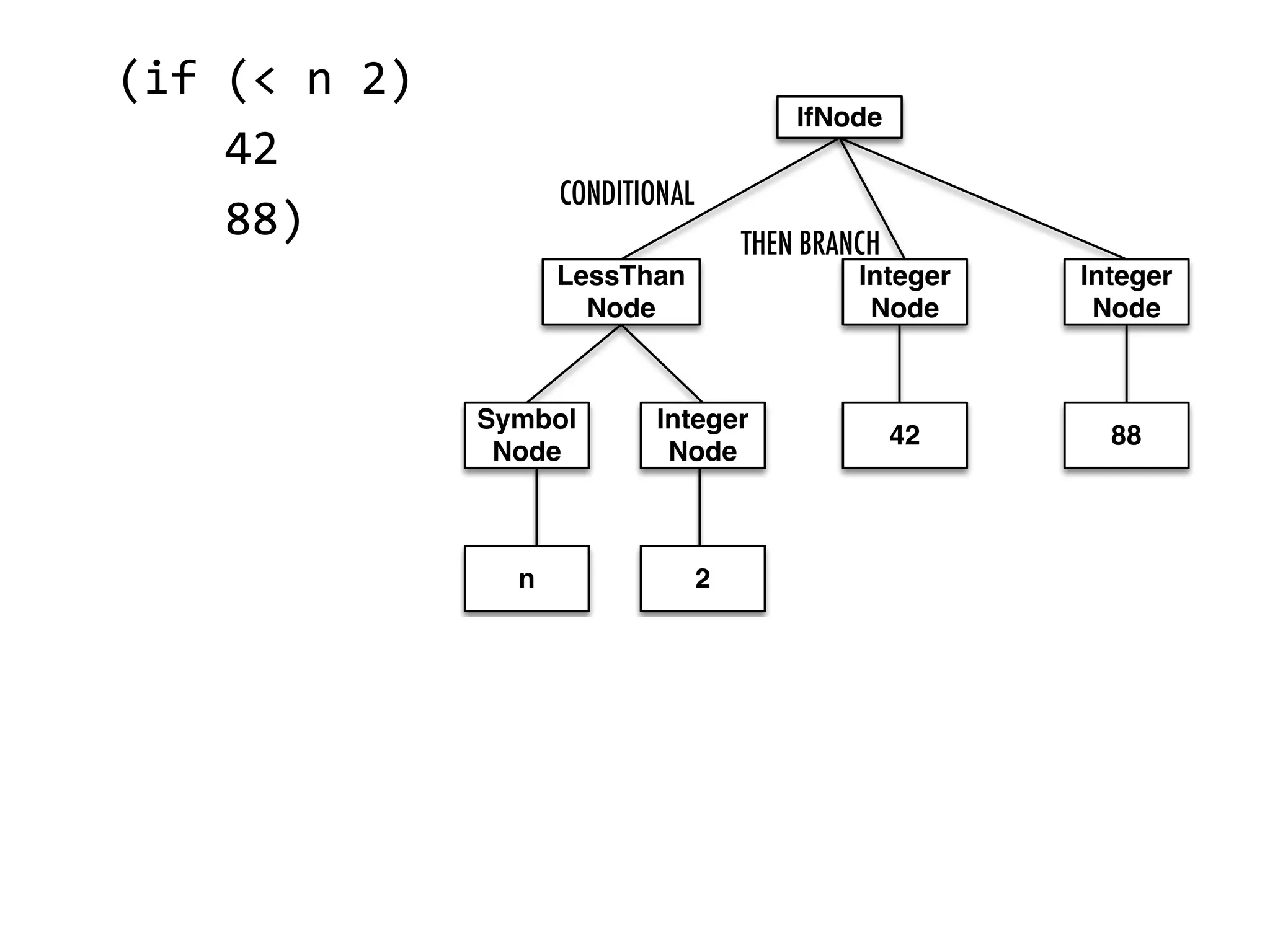
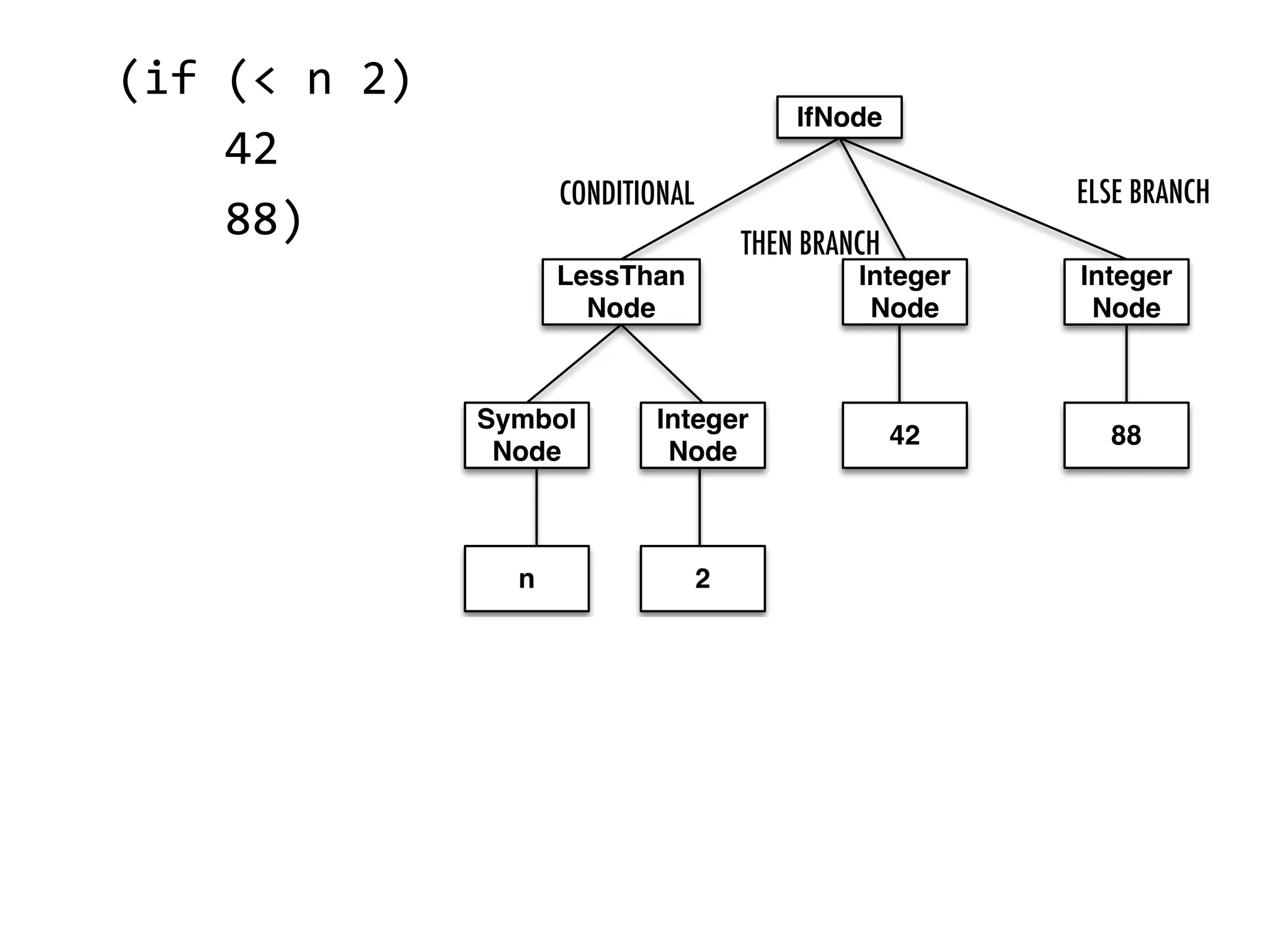
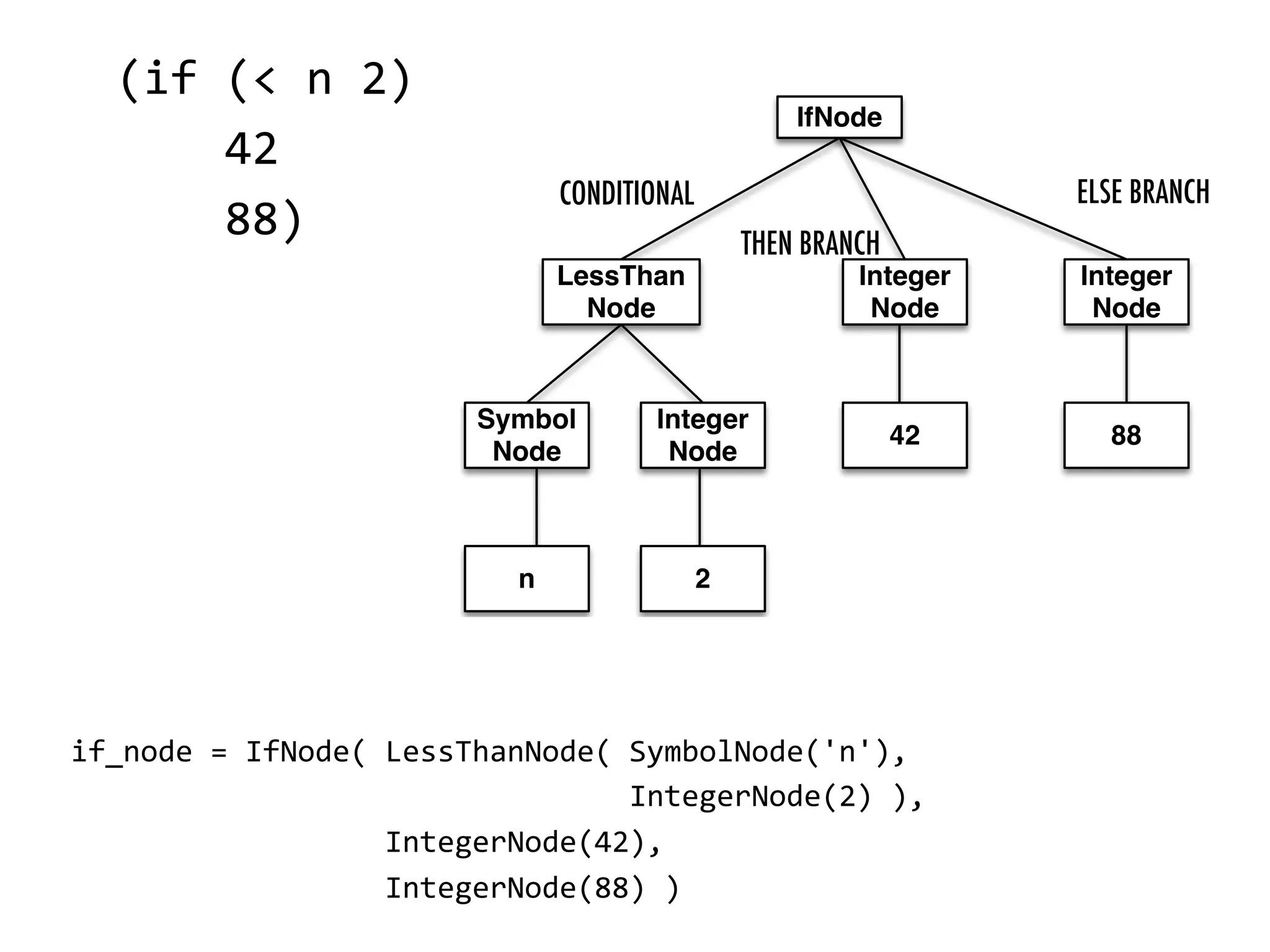
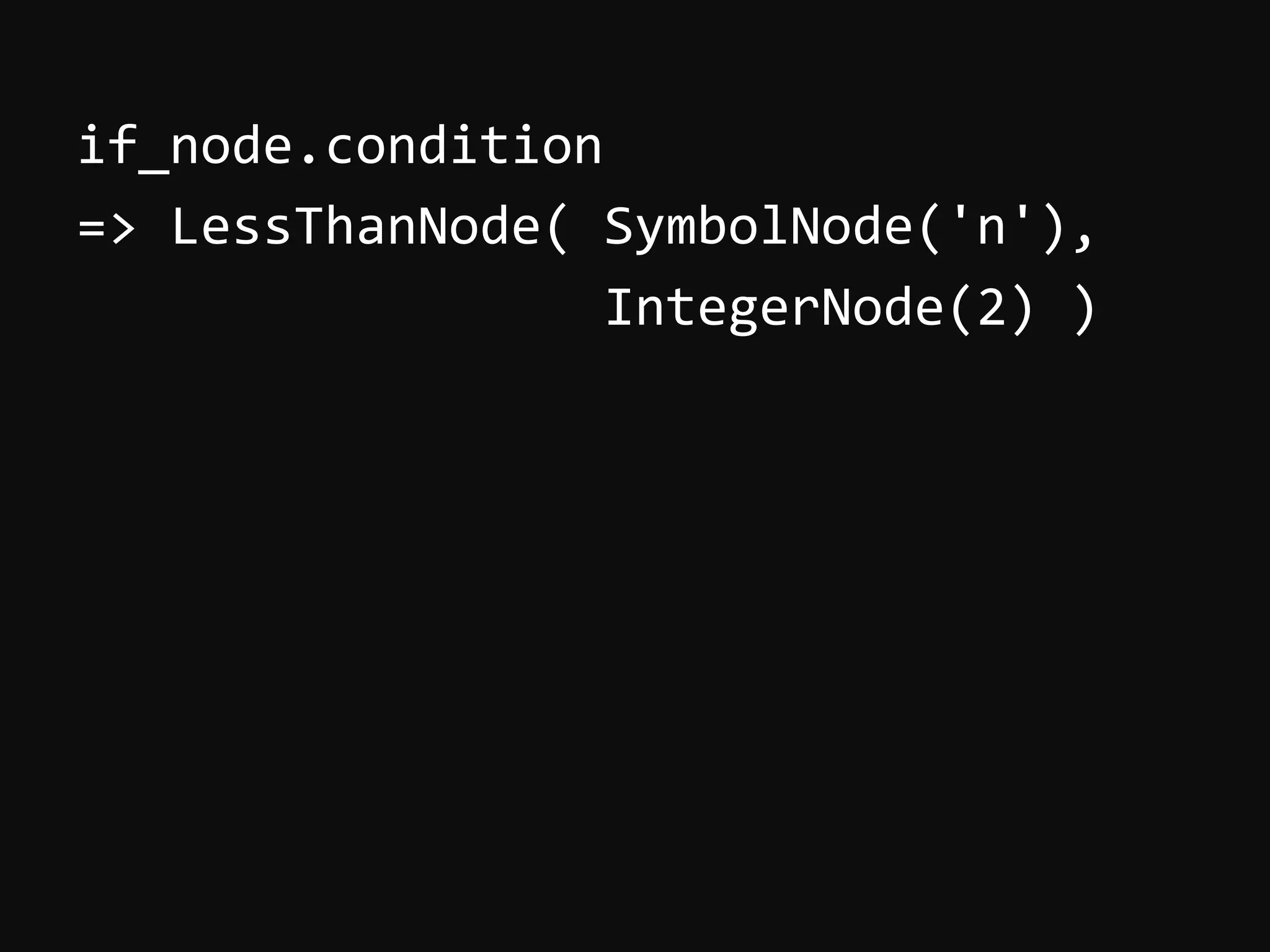
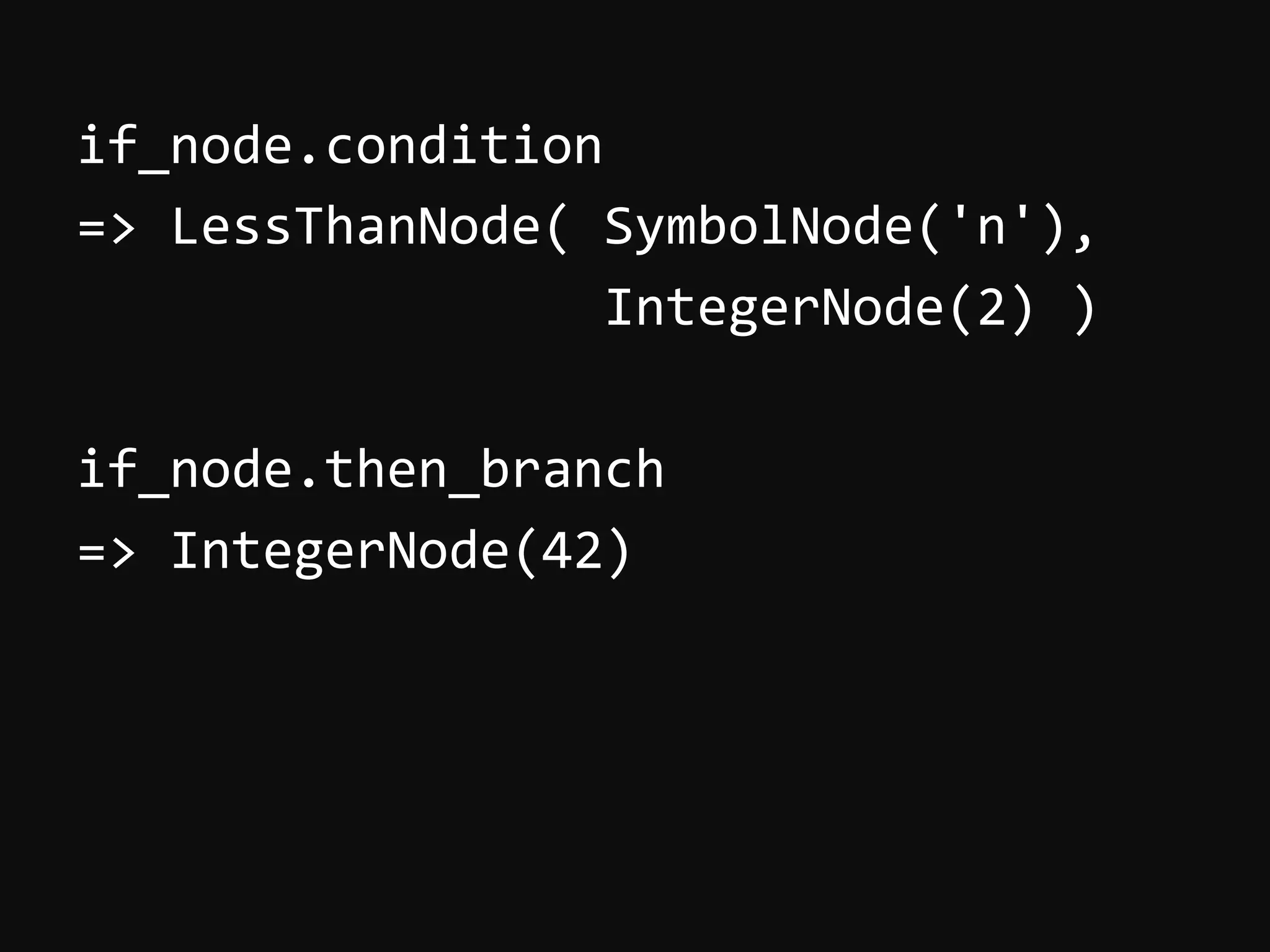
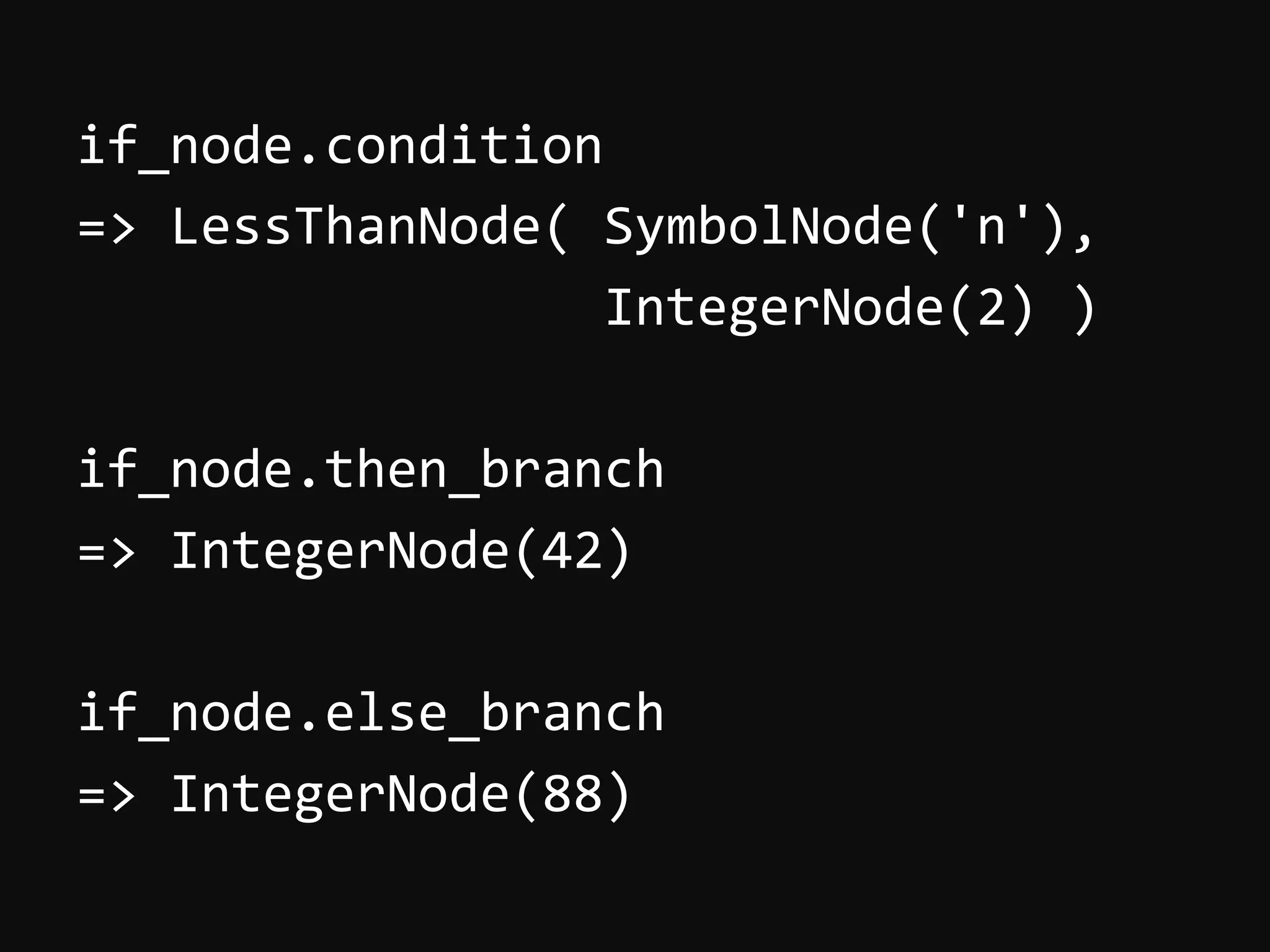
![def parse_sexp(sexp) type, *rest = sexp case type when :boolean boolean = sexp.last if boolean == :true Malady::AST::TrueBooleanNode.new else Malady::AST::FalseBooleanNode.new end when :symbol name = sexp.last builtins.fetch(name, Malady::AST::SymbolNode.new(name) when :integer Malady::AST::IntegerNode.new sexp[1] when :list rest.map { |sexp| parse(sexp) } end end](https://image.slidesharecdn.com/rubysgtalk-160126154418/75/Slaying-the-Dragon-Implementing-a-Programming-Language-in-Ruby-111-2048.jpg)
